
THE TRAINING INSTITUTE (TI)
Division on Substance Use Disorders
1051 Riverside Drive, New York, NY 10032 New York State Psychiatric Institute | Department of Psychiatry | Columbia University Medical Center Contact: Tri at: [email protected] or Tel: (646) 774-6186

NeC-ATTC now offers training via live webinars and video conferencing on a range of public health and behavioral health issues relevant to workforce development for human services providers from a range of disciplines designed to create measureable growth, meet your needs and motivate your workforce at senior, middle management or operative level. Courses are generally three-hours in length, delivered in two segments (1.5 hours each). In order to encourage participation and in the process enhance the learning experience, webinars are designed to be highly interactive by incorporating polling questions, whiteboards, question chat boxes, and other strategies consistent with adult learning principle.
These webinar and video conference trainings are provided under New York State Office of Addiction Services and Supports (OASAS) Education and Training. Provider Certification Number (115) Training under a New York State OASAS Provider Certification is acceptable for meeting all or part of the CASAC/CPP/CPS education and training requirements.
Participants who wish to take a zoom video conference or webex training series are required to attend both segment (1.5 hours each) in their entirety to be eligible to receive your CASAC certificate.
We want to see you smile!! Please keep in mind that in order to receive credit foryour zoom video conference trainings, all attendees will be expected to have their computer cameras turned on while the presentation is in progress and while working in breakout sessions. Please address any concerns regarding this matter to the administrator of the training prior to the start date.
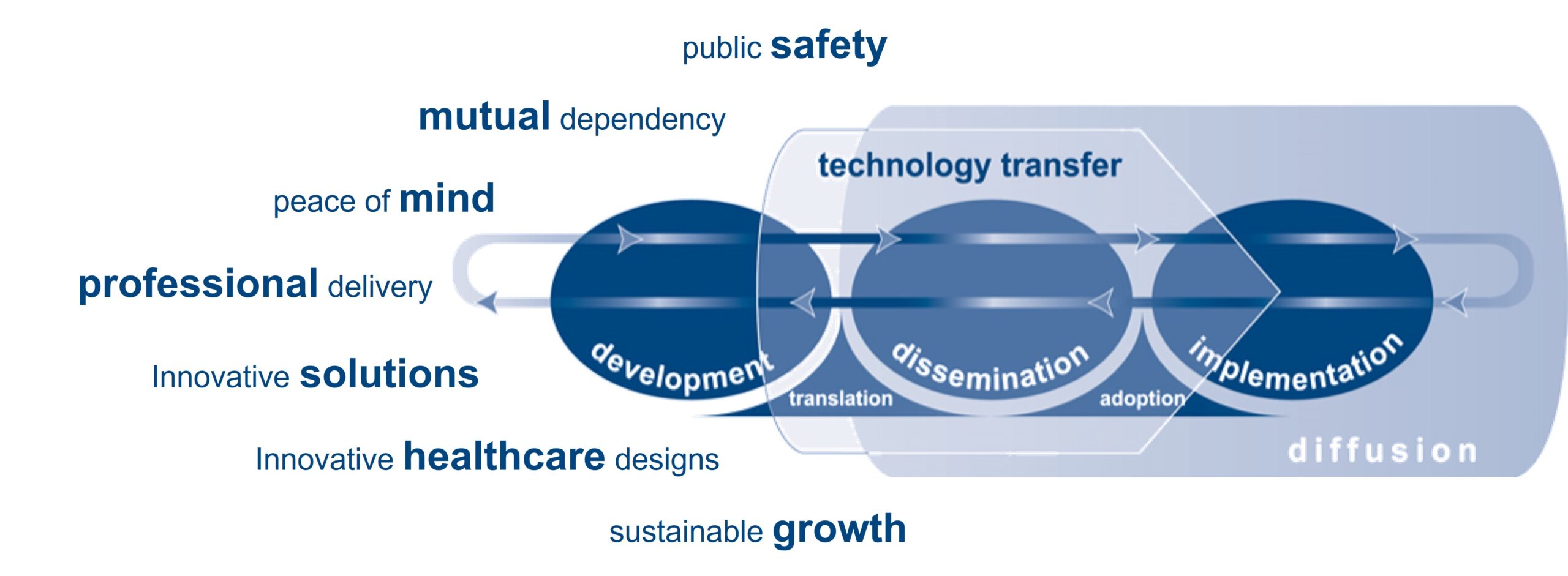


We believe in doing our bit to support our community
In depth understanding of industry
Reliable service worldwide
__
We’re an award winning team
more effective, with measurable results
To ensure the advancement of state-of-the-art techniques, evidence-based and promising practices, and supports for non-physician health and human services providers and other practitioners. This is accomplished by fostering relation To ensure the advancement of state-of-the-art techniques, evidence-based and promising practices, and supports for non-physician health and human services providers and other practitioners. This is accomplished by fostering relationships at the federal, state, local, international, philanthropic and private sector levels, with the goal of reducing health and social disparities by creating sustainable change ships at the federal, state, local, international, philanthropic and private sector levels, with the goal of reducing health and social disparities by creating sustainable change.
Disclaimer The development of these training materials is supported by grant TI082504 (PI: M. Chaple) from the Center for Substance Abuse Treatment, Substance Abuse and Mental Health Services Administration (SAMHSA), United States Department of Health and Human Services. The contents are solely the responsibility of the Northeast and Caribbean Addiction Technology Transfer Center, and do not necessarily represent the official views of SAMHSA


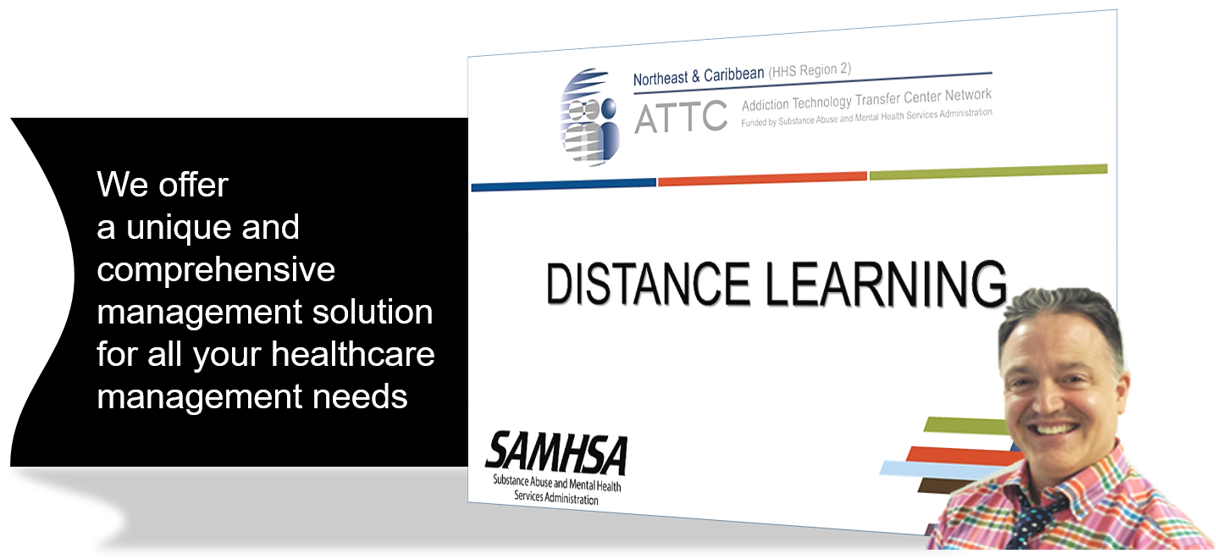
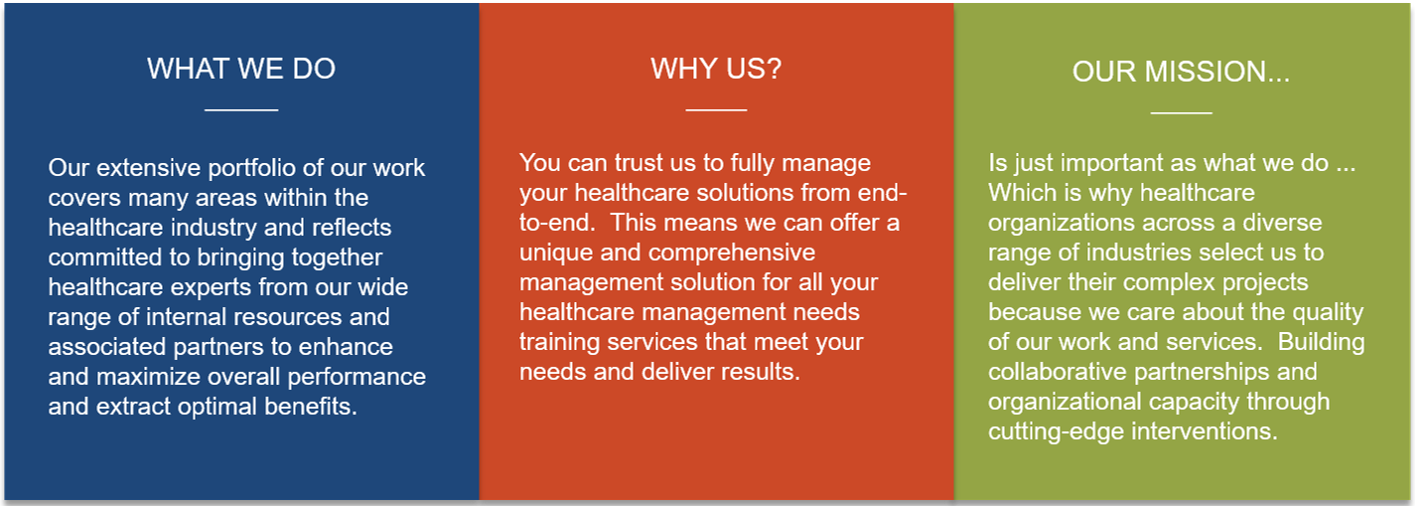
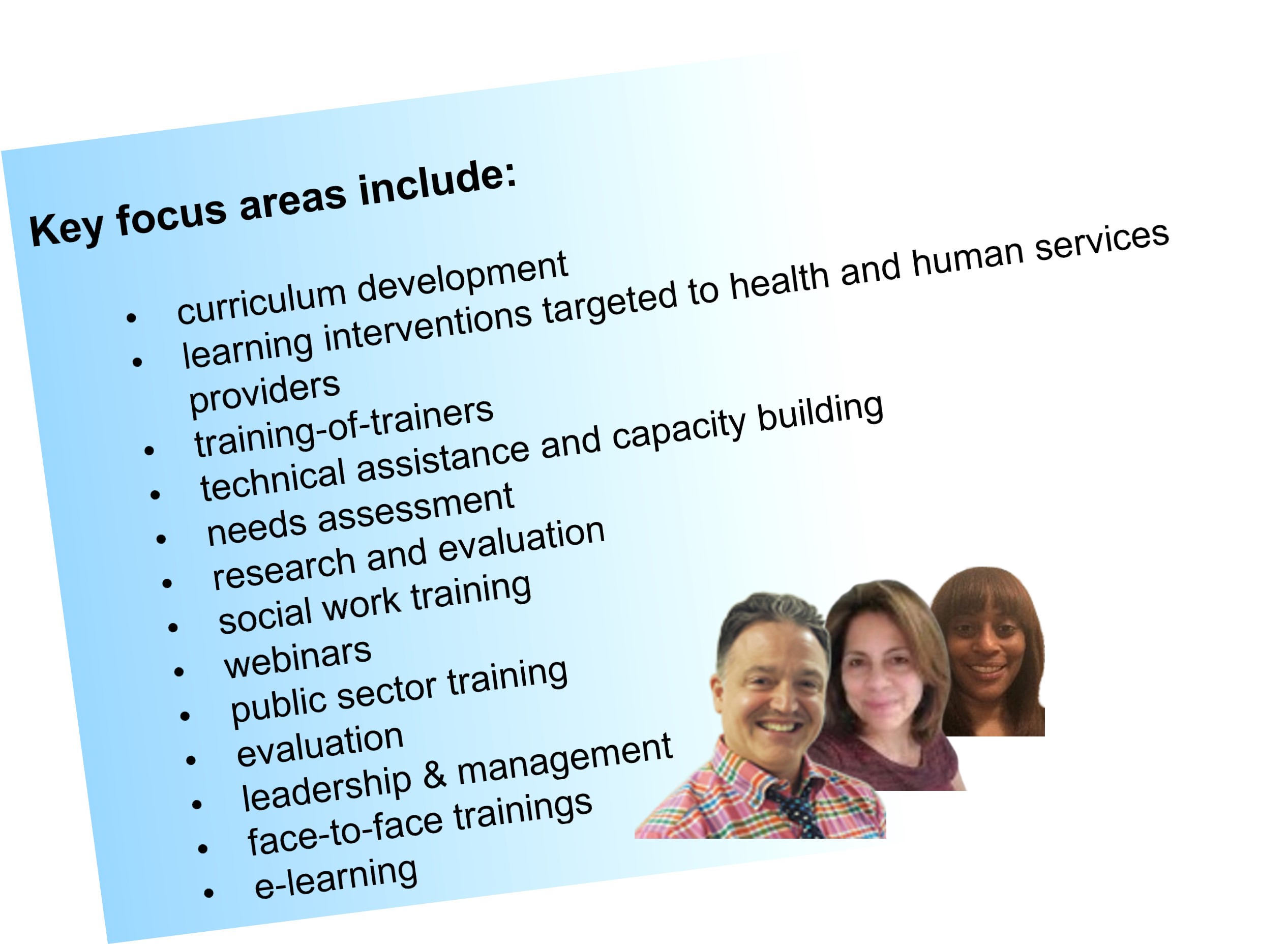


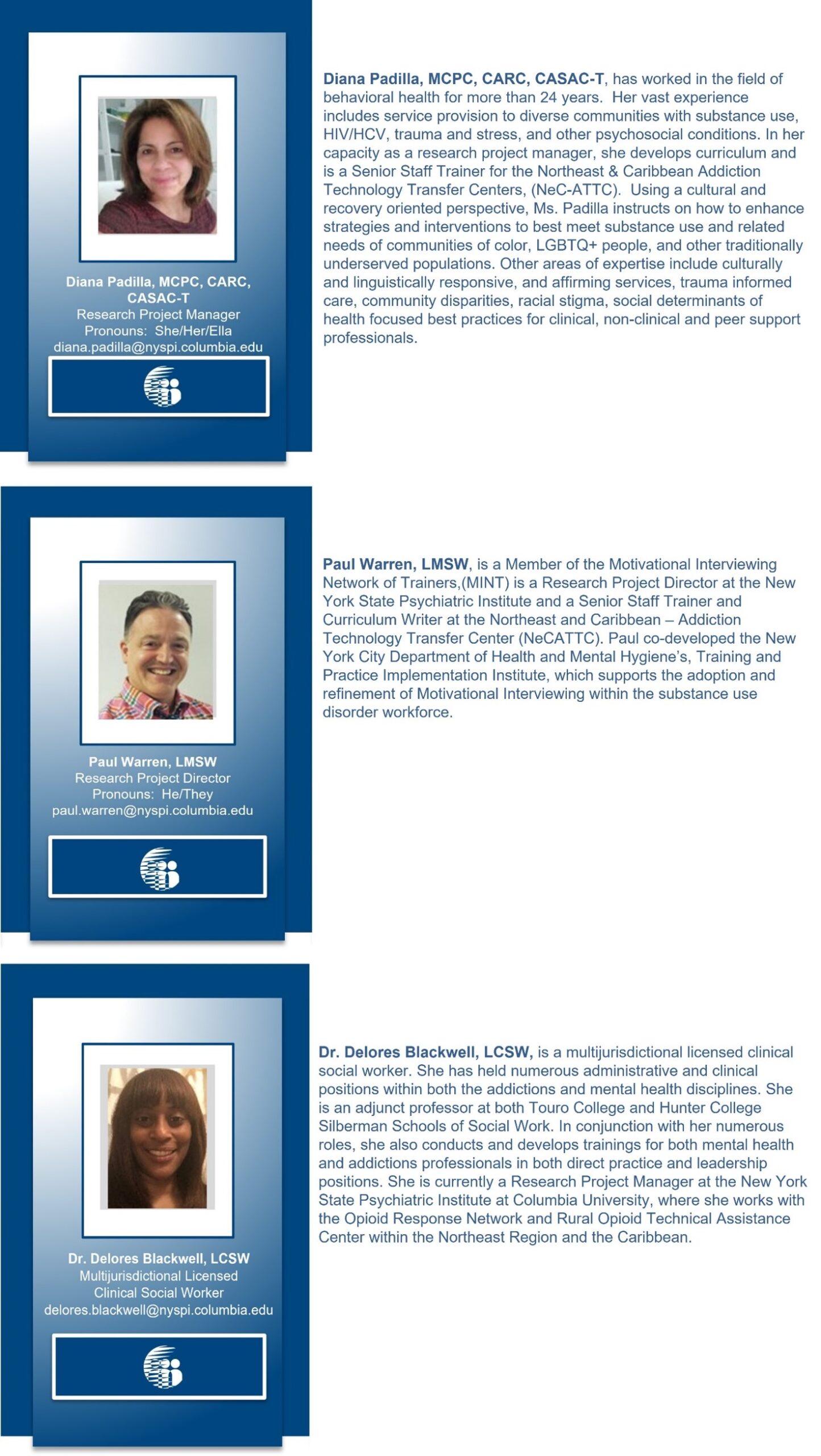

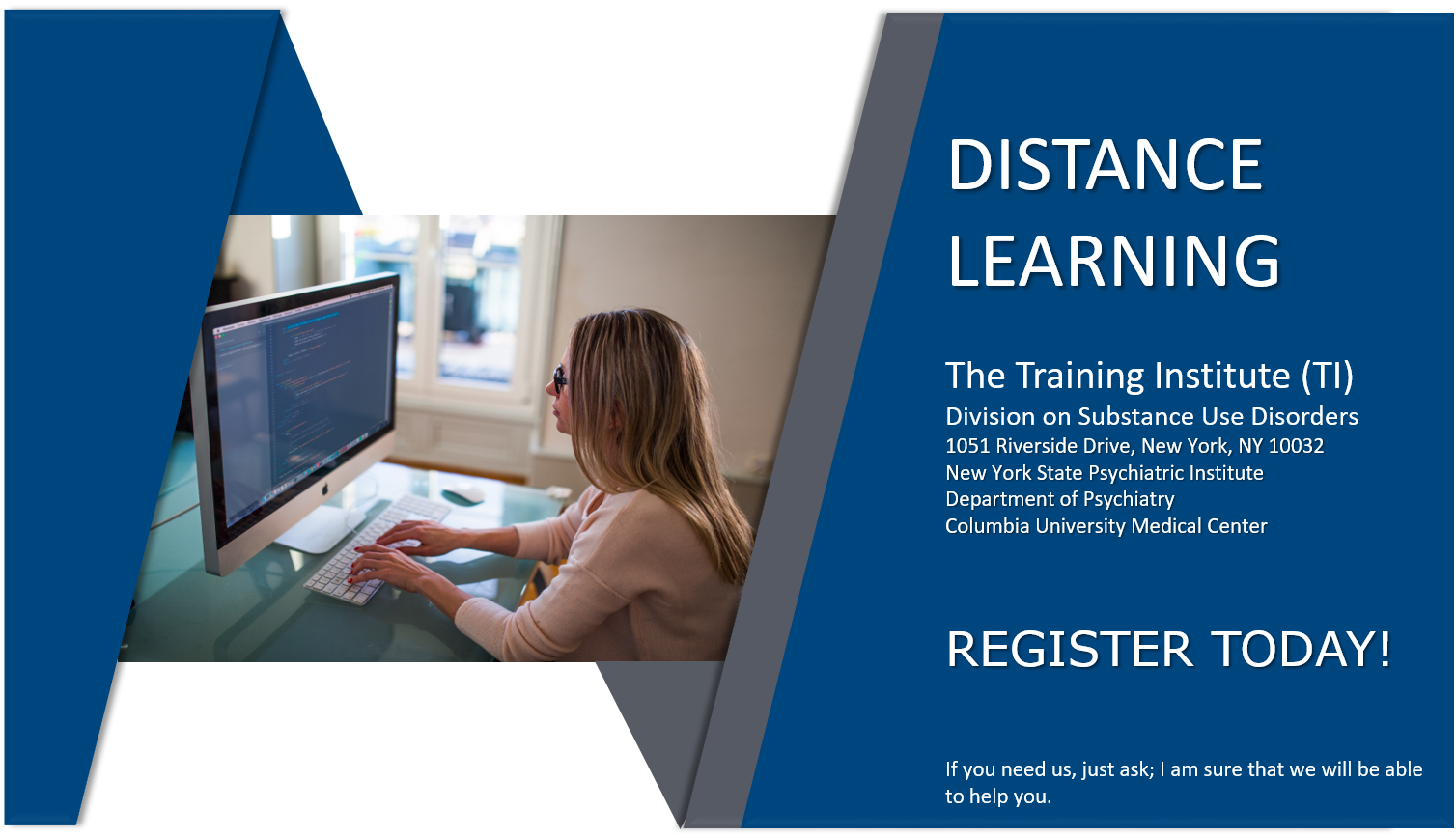

iTAMl offers intensive technical assistance opportunities that support the adoption, implementation, and refinement of the evidence-based practice of Motivational Interviewing. Additionally, the innovative iTAMI structure allows programs to engage in training, implementation support and individual coaching activities in a volitional and cumulative manner; determined by specific needs and program structures.
Eligibility Criteria: Treatment programs that provide services to people that are considering and moving toward behavior change(s).
Basic Requirements
iTAMI Focus Outcomes
TA Components
All designated participants must obtain written authorization from their organization/program Executive Representative. Upon completion of the 9-hour MI Overview Training, programs can request Group Practice Sessions. After the completion of six Group Practice Sessions, program teams can request an additional six Group Practice Sessions. ****Upon completion of three Group Practice Sessions, individuals can request Audio Recordings activities.
Please click link below to download the iTAMl flyer and Application Form
https://attcnetwork.org/centers/northeast-caribbean-attc/event/intensive-technical-assistance-motivational-interviewing


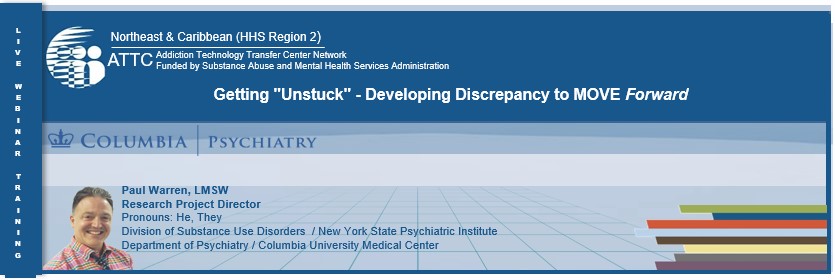
This interactive learning community conversation explores the strategy of Developing Discrepancy. The intentional use of this strategy sparks contemplation; supports forward movement and stops circular conversations about behavior change. Participants will reframe their frustration-in-moment as an opportunity for insight that can inform and reshape their next steps in the conversation. Demonstrations, practice opportunities and feedback will be used to illustrate the practical application of this effective engagement/conversation strategy.
Learning Objectives:
This training was approved for two renewal hours (CASAC, CPP, CPS) and two initial hours (CPP, CPS) through New York State’s Office of Addiction Services and Supports (NYS OASAS). As an IC & RC member board, OASAS accredited courses were granted reciprocal approval by the New Jersey Division of Consumer Affairs, Alcohol and Drug Counselor Committee. Many other states offered reciprocity

For more information contact: Tri at: [email protected] or Tel: (646) 774-6186
Northeast & Caribbean Addiction Technology Transfer CenterNetwork (NeC-ATTC)
1051 Riverside Drive, New York, NY 10032
Division on Substance Use Disorders | New York State Psychiatric Institute
Department of Psychiatry | Columbia University Medical Center
Disclaimer: The development of these training materials is supported by grant TI082504 (PI: M. Chaple) from the Center for Substance Abuse Treatment, Substance Abuse and Mental Health Services Administration (SAMHSA), United States Department of Health and Human Services. The contents are solely the responsibility of the Northeast and Caribbean Addiction Technology Transfer Center, and do not necessarily represent the official views of SAMHSA.
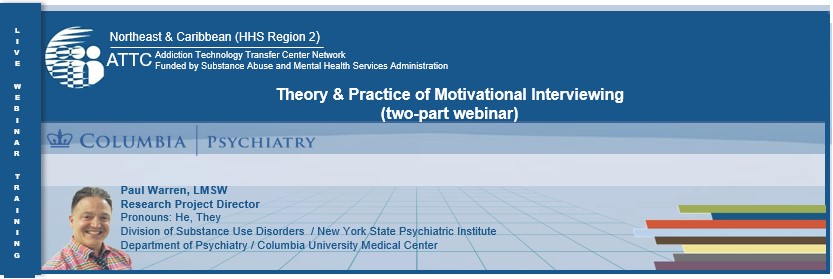
Motivational interviewing is an evidence-based, conversation model for evoking and enhancing intrinsic motivation to change behaviors. In this video-conversation, participants will discuss the core components of this model and practice using the skills of Motivational Interviewing, particularly in the context of substance use behavior change(s). Prior knowledge of Motivational Interviewing is not required. This learning community is open to everyone engaging in conversations about behavior change - educational degrees or credentials are also not required.
This training was approved for six renewal hours (CASAC, CPP, CPS) and six initial hours (CPP, CPS) through New York State’s Office of Addiction Services and Supports (NYS OASAS). As an IC & RC member board, OASAS accredited courses were granted reciprocal approval by the New Jersey Division of Consumer Affairs, Alcohol and Drug Counselor Committee. Many other states offered reciprocity.

For more information contact: Tri at: [email protected] or Tel: (646) 774-6186
Northeast & Caribbean Addiction Technology Transfer CenterNetwork (NeC-ATTC)
1051 Riverside Drive, New York, NY 10032
Division on Substance Use Disorders | New York State Psychiatric Institute
Department of Psychiatry | Columbia University Medical Center
Disclaimer: The development of these training materials is supported by grant TI082504 (PI: M. Chaple) from the Center for Substance Abuse Treatment, Substance Abuse and Mental Health Services Administration (SAMHSA), United States Department of Health and Human Services. The contents are solely the responsibility of the Northeast and Caribbean Addiction Technology Transfer Center, and do not necessarily represent the official views of SAMHSA.
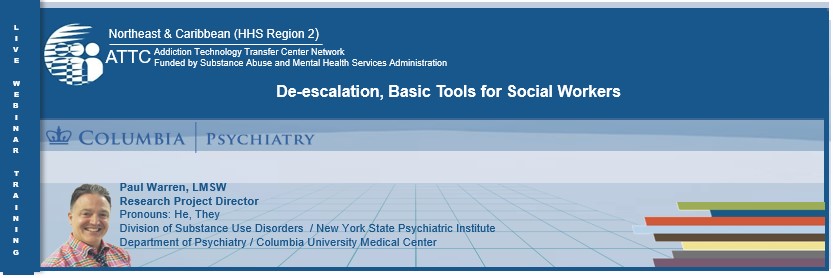
Difficult moments don’t have to grow into "incidents" that can threaten client engagement and retention. This workshop is designed to equip participants with basic concepts and preparatory actions that can be used to de-escalate a wide range of interactions.
This training was approved for three renewal hours (CASAC, CPP, CPS) and three initial hours (CPP, CPS) through New York State’s Office of Addiction Services and Supports (NYS OASAS). As an IC & RC member board, OASAS accredited courses were granted reciprocal approval by the New Jersey Division of Consumer Affairs, Alcohol and Drug Counselor Committee. Many other states offered reciprocity.

For more information contact: Tri at: [email protected] or Tel: (646) 774-6186
Northeast & Caribbean Addiction Technology Transfer CenterNetwork (NeC-ATTC)
1051 Riverside Drive, New York, NY 10032
Division on Substance Use Disorders | New York State Psychiatric Institute
Department of Psychiatry | Columbia University Medical Center
Disclaimer: The development of these training materials is supported by grant TI082504 (PI: M. Chaple) from the Center for Substance Abuse Treatment, Substance Abuse and Mental Health Services Administration (SAMHSA), United States Department of Health and Human Services. The contents are solely the responsibility of the Northeast and Caribbean Addiction Technology Transfer Center, and do not necessarily represent the official views of SAMHSA.

How and when we say what we say is as important as the words we use when we communicate. During incidents of heightened or intense affect our stance and responses can support the reestablishment of equilibrium or increase stress.
This learning community conversation focuses on the intentional use of stance and approaches calculated to calm and decrease anxiety and agitation.
This training was approved for three renewal hours (CASAC, CPP, CPS) and three initial hours (CPP, CPS) through New York State’s Office of Addiction Services and Supports (NYS OASAS). As an IC & RC member board, OASAS accredited courses were granted reciprocal approval by the New Jersey Division of Consumer Affairs, Alcohol and Drug Counselor Committee. Many other states offered reciprocity.

For more information contact: Tri at: [email protected] or Tel: (646) 774-6186
Northeast & Caribbean Addiction Technology Transfer CenterNetwork (NeC-ATTC)
1051 Riverside Drive, New York, NY 10032
Division on Substance Use Disorders | New York State Psychiatric Institute
Department of Psychiatry | Columbia University Medical Center
Disclaimer: The development of these training materials is supported by grant TI082504 (PI: M. Chaple) from the Center for Substance Abuse Treatment, Substance Abuse and Mental Health Services Administration (SAMHSA), United States Department of Health and Human Services. The contents are solely the responsibility of the Northeast and Caribbean Addiction Technology Transfer Center, and do not necessarily represent the official views of SAMHSA.
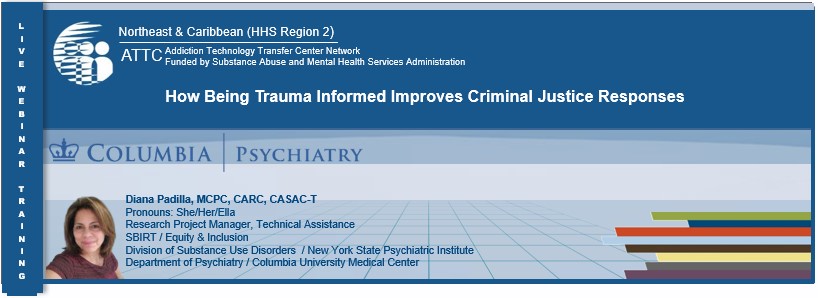
Research data indicate higher rates of trauma among justice-involved persons than the general population. The effects of traumatic experiences can challenge a person’s capacity for recovery and pose significant barriers to accessing services, often resulting in an increased risk of coming into contact with the criminal justice system.
This interactive training instructs on what trauma is and how to avoid re-traumatizing individuals, increase safety for them and practitioners, potential to decrease recidivism, and promote and support recovery of justice-involved persons.
Although this training is designed with community corrections, court personnel, and law enforcement in mind, behavioral health providers working with justice involved persons may also find it useful in understanding core issues of trauma and trauma-informed approaches.
This training was approved for four renewal hours (CASAC, CPP, CPS) and four initial hours (CPP, CPS) through New York State’s Office of Addiction Services and Supports (NYS OASAS). As an IC & RC member board, OASAS accredited courses were granted reciprocal approval by the New Jersey Division of Consumer Affairs, Alcohol and Drug Counselor Committee. Many other states offered reciprocity.

For more information contact: Tri at: [email protected] or Tel: (646) 774-6186
Northeast & Caribbean Addiction Technology Transfer CenterNetwork (NeC-ATTC)
1051 Riverside Drive, New York, NY 10032
Division on Substance Use Disorders | New York State Psychiatric Institute
Department of Psychiatry | Columbia University Medical Center
Disclaimer: The development of these training materials is supported by grant TI082504 (PI: M. Chaple) from the Center for Substance Abuse Treatment, Substance Abuse and Mental Health Services Administration (SAMHSA), United States Department of Health and Human Services. The contents are solely the responsibility of the Northeast and Caribbean Addiction Technology Transfer Center, and do not necessarily represent the official views of SAMHSA.
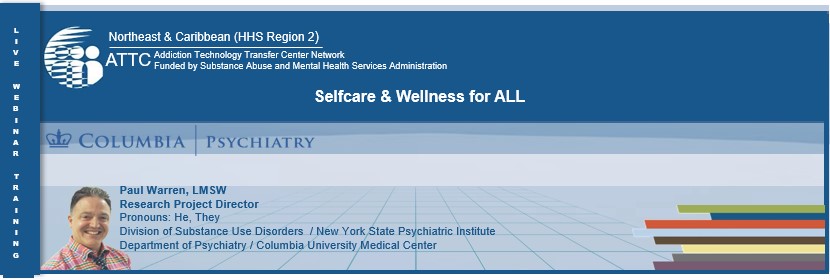
Behavioral health and health care settings offer a spectrum of programs including substance use, mental health, and medical and recovery services. Professionals providing these supports use an array of competencies to empathize and assist persons with substance use and other psychosocial problems. Always focused on helping others, professionals can experience challenges in practicing self-care for themselves.
This interactive workshop provides an opportunity for providers to review wellness practices and experience the benefits of intentional, micro-structured, self-care interventions.
This training was approved for two renewal hours (CASAC, CPP, CPS) and two initial hours (CPP, CPS) through New York State’s Office of Addiction Services and Supports (NYS OASAS). As an IC & RC member board, OASAS accredited courses were granted reciprocal approval by the New Jersey Division of Consumer Affairs, Alcohol and Drug Counselor Committee. Many other states offered reciprocity.

For more information contact: Tri at: [email protected] or Tel: (646) 774-6186
Northeast & Caribbean Addiction Technology Transfer CenterNetwork (NeC-ATTC)
1051 Riverside Drive, New York, NY 10032
Division on Substance Use Disorders | New York State Psychiatric Institute
Department of Psychiatry | Columbia University Medical Center
Disclaimer: The development of these training materials is supported by grant TI082504 (PI: M. Chaple) from the Center for Substance Abuse Treatment, Substance Abuse and Mental Health Services Administration (SAMHSA), United States Department of Health and Human Services. The contents are solely the responsibility of the Northeast and Caribbean Addiction Technology Transfer Center, and do not necessarily represent the official views of SAMHSA.
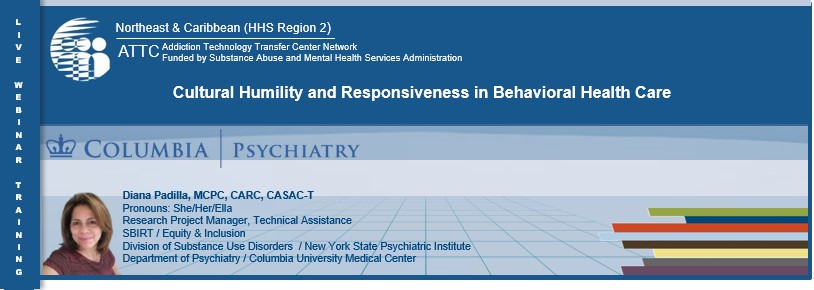
The National Alliance on Mental Illness recognizes that current environmental factors are traumatizing people of color, which as a risk factor can also initiate or increase substance use and potentially developing trauma and stress complications. Provider bias in stigmatic language or other microaggressions affect a client’s capacity to respond to clinical interventions and are often identified in research, as components of poor behavioral health outcomes.
Practitioners who integrate cultural humility in practice are able to support highest levels of patient centered culturally informed care. This interactive virtual training will review practical tools and strategies for providers to identify and diffuse personal bias, dynamics of culture in substance use treatment and how to facilitate and align cultural humility with other culturally responsive strategies to increase patient wellness for racial and ethnic populations.
This training was approved for two renewal hours (CASAC, CPP, CPS) and two initial hours (CPP, CPS) through New York State’s Office of Addiction Services and Supports (NYS OASAS). As an IC & RC member board, OASAS accredited courses were granted reciprocal approval by the New Jersey Division of Consumer Affairs, Alcohol and Drug Counselor Committee. Many other states offered reciprocity. This training was also approved under the ASAP-NYCB Certification Board for CARC Elective & CARC/CRPA CE.

For more information contact: Tri at: [email protected] or Tel: (646) 774-6186
Northeast & Caribbean Addiction Technology Transfer CenterNetwork (NeC-ATTC)
1051 Riverside Drive, New York, NY 10032
Division on Substance Use Disorders | New York State Psychiatric Institute
Department of Psychiatry | Columbia University Medical Center
Disclaimer: The development of these training materials is supported by grant TI082504 (PI: M. Chaple) from the Center for Substance Abuse Treatment, Substance Abuse and Mental Health Services Administration (SAMHSA), United States Department of Health and Human Services. The contents are solely the responsibility of the Northeast and Caribbean Addiction Technology Transfer Center, and do not necessarily represent the official views of SAMHSA.
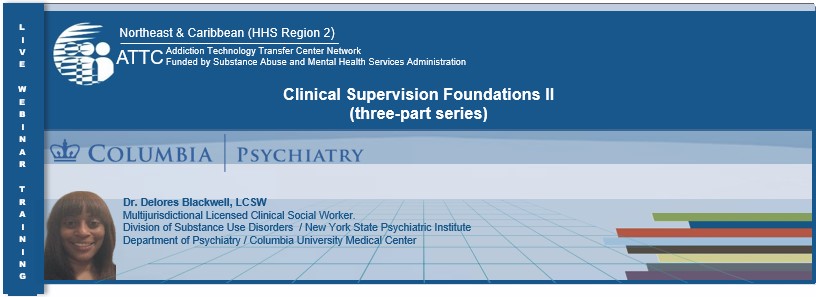
This 16-hour training (12 hours of live interactive training through Zoom + 4 hours of professional development plan assignments), combined with the 14-hour online “Clinical Supervision Foundations I” training, will meet the 30-hour Clinical Supervision training requirement for the Advanced Counselor and Master Counselor status, as referenced in the OASAS Substance Use Disorder Scope of Practice. This training recognizes the crucial role that Clinical Supervision holds as the cornerstone of performance improvement at both the program and client level.
Clinical Supervision, when properly implemented by competent Clinical Supervisors, improves client care, develops clinical skills, and improves the knowledge and professionalism of clinical personnel. It is also paramount in imparting and maintaining ethical standards in the addictions profession.
This training met the requirements for 16 renewal hours (CASAC, CPP, CPS) and 16 initial hours (CPP, CPS) through New York State’s Office of Addiction Services and Supports (NYS OASAS). As an IC & RC member board, OASAS accredited courses were granted reciprocal approval by the New Jersey Division of Consumer Affairs, Alcohol and Drug Counselor Committee. Many other states offered reciprocity.
This training also met the requirements for 14.5 contact for LCSWs and LMSWs. Research Foundation for Mental Hygiene, Inc., Training Institute is recognized by the New York State Education Department's State Board for Social Work as an approved provider of continuing education for licensed social workers #SW-0694.

For more information contact: Tri at: [email protected] or Tel: (646) 774-6186
Northeast & Caribbean Addiction Technology Transfer CenterNetwork (NeC-ATTC)
1051 Riverside Drive, New York, NY 10032
Division on Substance Use Disorders | New York State Psychiatric Institute
Department of Psychiatry | Columbia University Medical Center
Disclaimer: The development of these training materials is supported by grant TI082504 (PI: M. Chaple) from the Center for Substance Abuse Treatment, Substance Abuse and Mental Health Services Administration (SAMHSA), United States Department of Health and Human Services. The contents are solely the responsibility of the Northeast and Caribbean Addiction Technology Transfer Center, and do not necessarily represent the official views of SAMHSA.
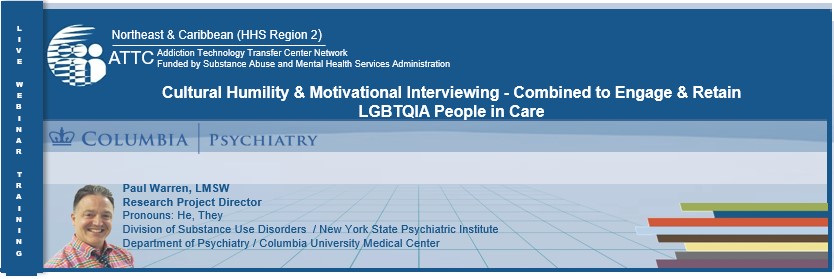
LGBTQIA people are much more than their sexual orientation and gender identity. This interactive webinar combines the perspectives and practices of both Cultural Humility and Motivational Interviewing, inviting participants to consider how these approaches, used in tandem, can enhance engagement and retention of LGBTQIA people.
This training was approved for two renewal hours (CASAC, CPP, CPS) and two initial hours (CPP, CPS) through New York State’s Office of Addiction Services and Supports (NYS OASAS). As an IC & RC member board, OASAS accredited courses were granted reciprocal approval by the New Jersey Division of Consumer Affairs, Alcohol and Drug Counselor Committee. Many other states offered reciprocity.

For more information contact: Tri at: [email protected] or Tel: (646) 774-6186
Northeast & Caribbean Addiction Technology Transfer CenterNetwork (NeC-ATTC)
1051 Riverside Drive, New York, NY 10032
Division on Substance Use Disorders | New York State Psychiatric Institute
Department of Psychiatry | Columbia University Medical Center
Disclaimer: The development of these training materials is supported by grant TI082504 (PI: M. Chaple) from the Center for Substance Abuse Treatment, Substance Abuse and Mental Health Services Administration (SAMHSA), United States Department of Health and Human Services. The contents are solely the responsibility of the Northeast and Caribbean Addiction Technology Transfer Center, and do not necessarily represent the official views of SAMHSA.
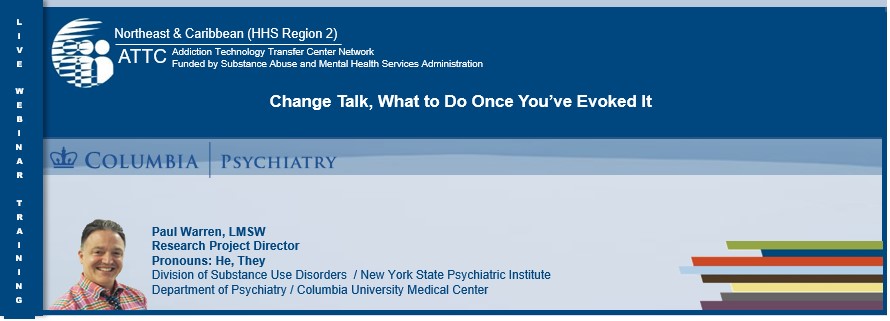
"Change Talk" is the solid GOLD motor that builds motivation for behavior change when practicing Motivational Interviewing (MI); without it the change-train is going nowhere and you're not practicing MI. During this Learning Community Conversation (LCC), we will review how to evoke Change Talk and how to employ it, once it's spoken by the client/patient.
Please click link below to register!
https://cvent.me/EQlWmv
This training meets the requirements for three renewal hours (CASAC, CPP, CPS) and three initial hours (CPP, CPS) through New York State’s Office of Addiction Services and Supports (NYS OASAS). As an IC & RC member board, OASAS accredited courses are granted reciprocal approval by the New Jersey Division of Consumer Affairs, Alcohol and Drug Counselor Committee. Many other states offer reciprocity - please check with your accrediting agency.
* Participants are required to attend the ENTIRE training, turn on their video cameras and actively participate in order to receive a Certificate of Completion.

For more information contact: Tri at: [email protected] or Tel: (646) 774-6186
Northeast & Caribbean Addiction Technology Transfer CenterNetwork (NeC-ATTC)
1051 Riverside Drive, New York, NY 10032
Division on Substance Use Disorders | New York State Psychiatric Institute
Department of Psychiatry | Columbia University Medical Center
Disclaimer: The development of these training materials is supported by grant TI082504 (PI: M. Chaple) from the Center for Substance Abuse Treatment, Substance Abuse and Mental Health Services Administration (SAMHSA), United States Department of Health and Human Services. The contents are solely the responsibility of the Northeast and Caribbean Addiction Technology Transfer Center, and do not necessarily represent the official views of SAMHSA.
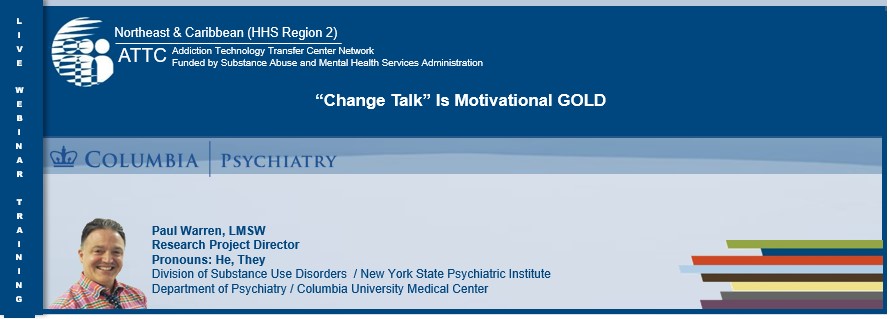
Most trainings on Motivational Interviewing (MI) convey the "concept" of "Change Talk" as essential to the practice and stop there. This interactive Learning Community Conversation will review the "types" of Change Talk and provide opportunities to practice identifying this truly essential part of the language of ambivalence; along with it's often vilified counterpart, Sustain Talk. A prior working knowledge of MI is helpful if you choose to join this conversation.
Please click link below to register!
https://cvent.me/4zyR84
This training meets the requirements for three renewal hours (CASAC, CPP, CPS) and three initial hours (CPP, CPS) through New York State’s Office of Addiction Services and Supports (NYS OASAS). As an IC & RC member board, OASAS accredited courses are granted reciprocal approval by the New Jersey Division of Consumer Affairs, Alcohol and Drug Counselor Committee. Many other states offer reciprocity - please check with your accrediting agency.
* Participants are required to attend the ENTIRE training, turn on their video cameras and actively participate in order to receive a Certificate of Completion.

For more information contact: Tri at: [email protected] or Tel: (646) 774-6186
Northeast & Caribbean Addiction Technology Transfer CenterNetwork (NeC-ATTC)
1051 Riverside Drive, New York, NY 10032
Division on Substance Use Disorders | New York State Psychiatric Institute
Department of Psychiatry | Columbia University Medical Center
Disclaimer: The development of these training materials is supported by grant TI082504 (PI: M. Chaple) from the Center for Substance Abuse Treatment, Substance Abuse and Mental Health Services Administration (SAMHSA), United States Department of Health and Human Services. The contents are solely the responsibility of the Northeast and Caribbean Addiction Technology Transfer Center, and do not necessarily represent the official views of SAMHSA.
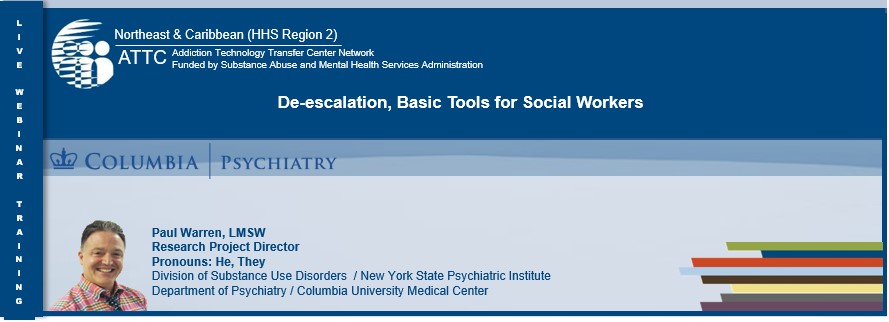
Difficult moments don’t have to grow into "incidents" that can threaten client engagement and retention. This workshop is designed to equip participants with basic concepts and preparatory actions that can be used to de-escalate a wide range of interactions.
Please click link below to register!
https://cvent.me/EQ7Kmo
This training meets the requirements for three renewal hours (CASAC, CPP, CPS) and three initial hours (CPP, CPS) through New York State’s Office of Addiction Services and Supports (NYS OASAS). As an IC & RC member board, OASAS accredited courses are granted reciprocal approval by the New Jersey Division of Consumer Affairs, Alcohol and Drug Counselor Committee. Many other states offer reciprocity - please check with your accrediting agency.
* Participants are required to attend the ENTIRE training, turn on their video cameras and actively participate in order to receive a Certificate of Completion.

For more information contact: Tri at: [email protected] or Tel: (646) 774-6186
Northeast & Caribbean Addiction Technology Transfer CenterNetwork (NeC-ATTC)
1051 Riverside Drive, New York, NY 10032
Division on Substance Use Disorders | New York State Psychiatric Institute
Department of Psychiatry | Columbia University Medical Center
Disclaimer: The development of these training materials is supported by grant TI082504 (PI: M. Chaple) from the Center for Substance Abuse Treatment, Substance Abuse and Mental Health Services Administration (SAMHSA), United States Department of Health and Human Services. The contents are solely the responsibility of the Northeast and Caribbean Addiction Technology Transfer Center, and do not necessarily represent the official views of SAMHSA.
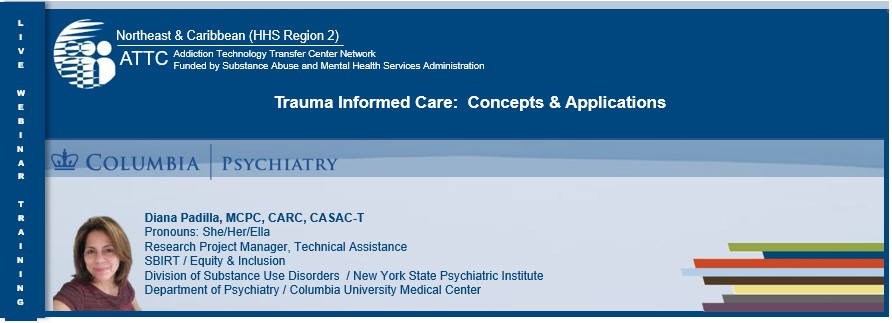
Data sources estimate that between 25 to 75% of people who survive different forms of abuse and/or a violent trauma develop issues related to substance use. Despite the prevalence of trauma, it often goes undetected particularly in people already dealing with life challenges and at high risk of substance use, misuse, and mental health problems.
This interactive training will review variations of trauma and potential impacts on the mind, and how self-regulation techniques can help address traumatic reactions. The content will further discuss practice specific opportunities for integration of trauma informed care principles and during various points of client interactions. Providers will learn how trauma informed care provides a preventive approach to engagement and supports person centered care.
Please click link below to register!
https://cvent.me/NKdPLB
This training meets the requirements for 3 renewal hours (CASAC, CPP, CPS) and 3 initial hours (CPP, CPS) through New York State’s Office of Addiction Services and Supports (NYS OASAS). As an IC & RC member board, OASAS accredited courses are granted reciprocal approval by the New Jersey Division of Consumer Affairs, Alcohol and Drug Counselor Committee. Many other states offer reciprocity - please check with your accrediting agency.
* Participants are required to attend the ENTIRE training, turn on their video cameras and actively participate in order to receive a Certificate of Completion.

For more information contact: Tri at: [email protected] or Tel: (646) 774-6186
Northeast & Caribbean Addiction Technology Transfer CenterNetwork (NeC-ATTC)
1051 Riverside Drive, New York, NY 10032
Division on Substance Use Disorders | New York State Psychiatric Institute
Department of Psychiatry | Columbia University Medical Center
Disclaimer: The development of these training materials is supported by grant TI082504 (PI: M. Chaple) from the Center for Substance Abuse Treatment, Substance Abuse and Mental Health Services Administration (SAMHSA), United States Department of Health and Human Services. The contents are solely the responsibility of the Northeast and Caribbean Addiction Technology Transfer Center, and do not necessarily represent the official views of SAMHSA.
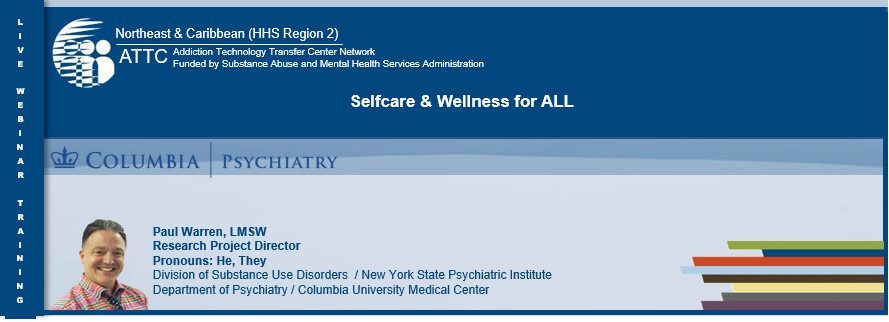
Behavioral health and health care settings offer a spectrum of programs including substance use, mental health, and medical and recovery services. Professionals providing these supports use an array of competencies to empathize and assist persons with substance use and other psychosocial problems. Always focused on helping others, professionals can experience challenges in practicing self-care for themselves.
This interactive workshop provides an opportunity for providers to review wellness practices and experience the benefits of intentional, micro-structured, self-care interventions. This training meets the requirements for two renewal hours (CASAC, CPP, CPS) and two initial hours (CPP, CPS) through New York State’s Office of Addiction Services and Supports (NYS OASAS). As an IC & RC member board, OASAS accredited courses are granted reciprocal approval by the New Jersey Division of Consumer Affairs, Alcohol and Drug Counselor Committee. Many other states offer reciprocity - please check with your accrediting agency.
Please click link below to register!
https://cvent.me/zyNO81
* Participants are required to attend the ENTIRE training, turn on their video cameras and actively participate in order to receive a Certificate of Completion.

For more information contact: Tri at: [email protected] or Tel: (646) 774-6186
Northeast & Caribbean Addiction Technology Transfer CenterNetwork (NeC-ATTC)
1051 Riverside Drive, New York, NY 10032
Division on Substance Use Disorders | New York State Psychiatric Institute
Department of Psychiatry | Columbia University Medical Center
Disclaimer: The development of these training materials is supported by grant TI082504 (PI: M. Chaple) from the Center for Substance Abuse Treatment, Substance Abuse and Mental Health Services Administration (SAMHSA), United States Department of Health and Human Services. The contents are solely the responsibility of the Northeast and Caribbean Addiction Technology Transfer Center, and do not necessarily represent the official views of SAMHSA.
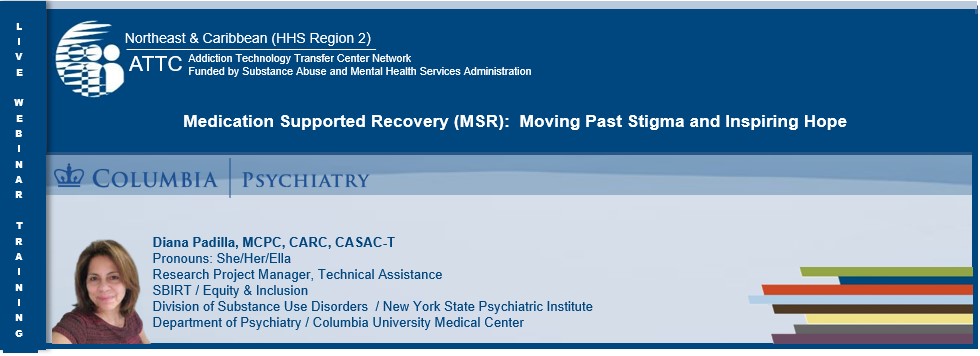
According to the CDC, opioid overdose deaths surpassed 100,000 during the 12-month period ending in December 2021, and is continuing to rise. On any given year, up to 90% of people needing addiction services do not access treatment.
This four hour, interactive training will review different types of MSR (medication supported recovery, previously referred to as MAT) approaches for opioid use disorders (OUD). It has long been noted that many types of treatment services are often stigmatized and prevent many people from seeking much needed help. The Content will examine how personal bias and stereotypical factors can negatively influence opportunities to speak about the benefits of MSR as an option for clients. Also included is the importance of using recovery oriented language and language practice activities to help enhance the peer professional’s communication skills and provide person centered support to clients on their recovery journey.
NOTE: Please note that this course is specifically designed for Peer Support Specialists and their roles. However, Peer Supervisors and other behavioral health professionals would also benefit. Participants are required to attend the ENTIRE training, turn on their video cameras and actively participate in order to receive a Certificate of Completion.
Please click link below to register!
https://cvent.me/kX7LZN
This training meets the requirements for four renewal hours (CASAC, CPP, CPS) and four initial hours (CPP, CPS) through New York State’s Office of Addiction Services and Supports (NYS OASAS). As an IC & RC member board, OASAS accredited courses are granted reciprocal approval by the New Jersey Division of Consumer Affairs, Alcohol and Drug Counselor Committee. Many other states offer reciprocity - please check with your accrediting agency. This specific course meets the 4 hours minimum on Medication Supported Recovery (formerly MAT) required toward the 50 hours of the required foundational training toward Initial Certification for CARC/CPRA (ASAP NYCB Certification Board).
* Participants are required to attend the ENTIRE training, turn on their video cameras and actively participate in order to receive a Certificate of Completion.

For more information contact: Tri at: [email protected] or Tel: (646) 774-6186
Northeast & Caribbean Addiction Technology Transfer CenterNetwork (NeC-ATTC)
1051 Riverside Drive, New York, NY 10032
Division on Substance Use Disorders | New York State Psychiatric Institute
Department of Psychiatry | Columbia University Medical Center
Disclaimer: The development of these training materials is supported by grant TI082504 (PI: M. Chaple) from the Center for Substance Abuse Treatment, Substance Abuse and Mental Health Services Administration (SAMHSA), United States Department of Health and Human Services. The contents are solely the responsibility of the Northeast and Caribbean Addiction Technology Transfer Center, and do not necessarily represent the official views of SAMHSA.
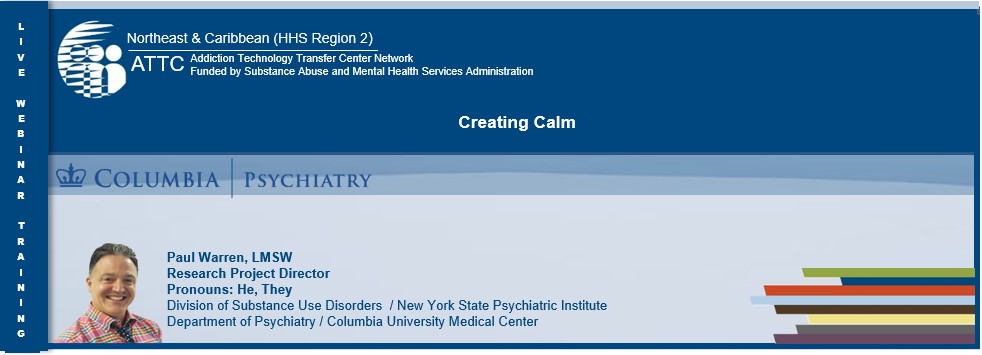
How and when we say what we say is as important as the words we use when we communicate. During incidents of heightened or intense affect our stance and responses can support the reestablishment of equilibrium or increase stress. This learning community conversation focuses on the intentional use of stance and approaches calculated to calm and decrease anxiety and agitation.
This training meets the requirements for 3 renewal hours (CASAC, CPP, CPS) and 3 initial hours (CPP, CPS) through New York State’s Office of Addiction Services and Supports (NYS OASAS). As an IC & RC member board, OASAS accredited courses are granted reciprocal approval by the New Jersey Division of Consumer Affairs, Alcohol and Drug Counselor Committee. Many other states offer reciprocity - please check with your accrediting agency.
Please click link below to register!
https://cvent.me/zyNNk1
This training meets the requirements for 3 renewal hours (CASAC, CPP, CPS) and 3 initial hours (CPP, CPS) through New York State’s Office of Addiction Services and Supports (NYS OASAS). As an IC & RC member board, OASAS accredited courses are granted reciprocal approval by the New Jersey Division of Consumer Affairs, Alcohol and Drug Counselor Committee. Many other states offer reciprocity - please check with your accrediting agency.
* Participants are required to attend the ENTIRE training, turn on their video cameras and actively participate in order to receive a Certificate of Completion.

For more information contact: Tri at: [email protected] or Tel: (646) 774-6186
Northeast & Caribbean Addiction Technology Transfer CenterNetwork (NeC-ATTC)
1051 Riverside Drive, New York, NY 10032
Division on Substance Use Disorders | New York State Psychiatric Institute
Department of Psychiatry | Columbia University Medical Center
Disclaimer: The development of these training materials is supported by grant TI082504 (PI: M. Chaple) from the Center for Substance Abuse Treatment, Substance Abuse and Mental Health Services Administration (SAMHSA), United States Department of Health and Human Services. The contents are solely the responsibility of the Northeast and Caribbean Addiction Technology Transfer Center, and do not necessarily represent the official views of SAMHSA.
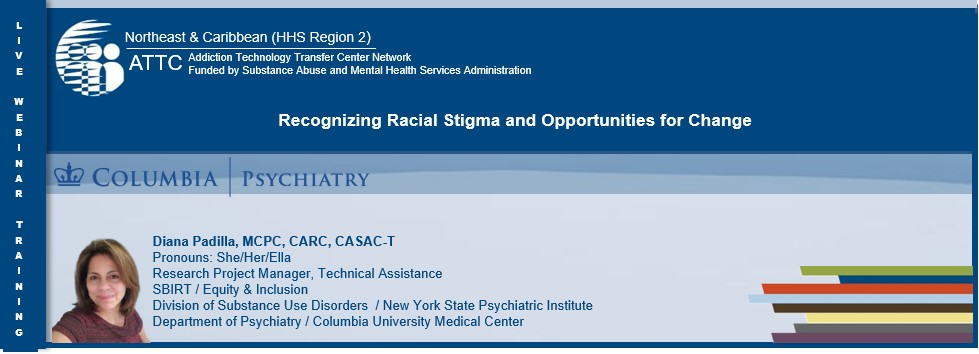
Stigma is associated with negative and often fear based perspectives and misunderstandings of people with mental health, substance use problems or physical disabilities. Add layers of race and ethnicity, and you have racial stigma, referring to how people of diverse backgrounds are unfairly perceived and treated. The combined impact plays a major role in why many who would benefit from treatment do not seek care.
This interactive four hour workshop will review mitigating factors such as stress, discrimination, microaggressions and societal attributions influence racial stigma and differential treatment. The intersecting challenges of social determinants of health and development of racial trauma in communities of color will also be explored. The content will also review bias reducing strategies that help mitigate stigma and benefits of integrating culturally responsive care to help attain and retain highest levels of patient centered care for persons of color and other marginalized communities.
Please click link below to register!
https://cvent.me/wWbXO9
This training meets the requirements for 4 renewal hours (CASAC, CPP, CPS) and 4 initial hours (CPP, CPS) through New York State’s Office of Addiction Services and Supports (NYS OASAS). As an IC & RC member board, OASAS accredited courses are granted reciprocal approval by the New Jersey Division of Consumer Affairs, Alcohol and Drug Counselor Committee. Many other states offer reciprocity - please check with your accrediting agency.
* Participants are required to attend the ENTIRE training, turn on their video cameras and actively participate in order to receive a Certificate of Completion.

For more information contact: Tri at: [email protected] or Tel: (646) 774-6186
Northeast & Caribbean Addiction Technology Transfer CenterNetwork (NeC-ATTC)
1051 Riverside Drive, New York, NY 10032
Division on Substance Use Disorders | New York State Psychiatric Institute
Department of Psychiatry | Columbia University Medical Center
Disclaimer: The development of these training materials is supported by grant TI082504 (PI: M. Chaple) from the Center for Substance Abuse Treatment, Substance Abuse and Mental Health Services Administration (SAMHSA), United States Department of Health and Human Services. The contents are solely the responsibility of the Northeast and Caribbean Addiction Technology Transfer Center, and do not necessarily represent the official views of SAMHSA.
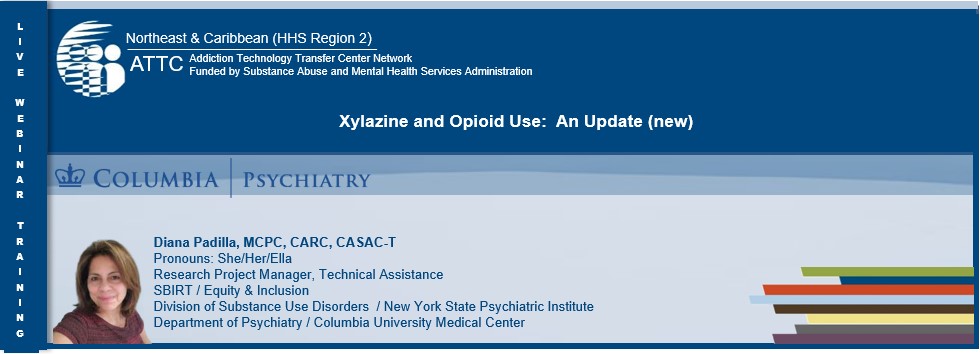
The urgency of the opioid crisis that began in 2019 has not abated and fentanyl continues to fuel the overdose rates. More recently, an emerging trend has been identified. Yet another dangerous substance called Xylazine has been found more frequently in various illicit substances and is worsening outcomes for people who use opioids.
This webinar is intended to provide the latest information available on Xylazine including associated effects on the body and long term impacts on opioid users, and review of current organizational strategies to help prevent exacerbated and related harm.
Please click link below to register!
https://cvent.me/bwEv5k
This training meets the requirements for 1.5 renewal hours (CASAC, CPP, CPS) and 1.5 initial hours (CPP, CPS) through New York State’s Office of Addiction Services and Supports (NYS OASAS). As an IC & RC member board, OASAS accredited courses are granted reciprocal approval by the New Jersey Division of Consumer Affairs, Alcohol and Drug Counselor Committee. Many other states offered reciprocity - please check with your accrediting agency.
* Participants are required to attend the ENTIRE training, turn on their video cameras and actively participate in order to receive a Certificate of Completion.

For more information contact: Tri at: [email protected] or Tel: (646) 774-6186
Northeast & Caribbean Addiction Technology Transfer CenterNetwork (NeC-ATTC)
1051 Riverside Drive, New York, NY 10032
Division on Substance Use Disorders | New York State Psychiatric Institute
Department of Psychiatry | Columbia University Medical Center
Disclaimer: The development of these training materials is supported by grant TI082504 (PI: M. Chaple) from the Center for Substance Abuse Treatment, Substance Abuse and Mental Health Services Administration (SAMHSA), United States Department of Health and Human Services. The contents are solely the responsibility of the Northeast and Caribbean Addiction Technology Transfer Center, and do not necessarily represent the official views of SAMHSA.
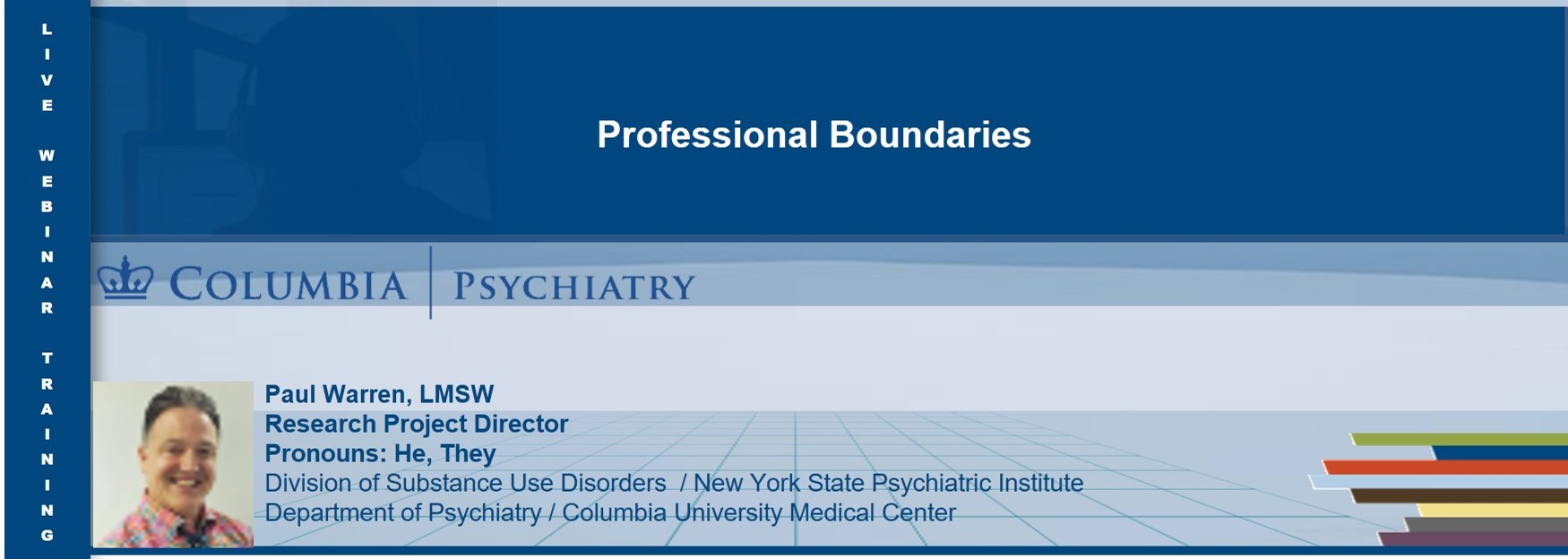
Professional boundaries set the parameters of effective and appropriate interaction between professionals and the people they serve. Boundaries protect clients and patients as well as providers. This interactive course will discuss professionalism and ethics, dual relationships, and how to build a safe working environment.
This training met the requirements for 3 renewal hours (CASAC, CPP, CPS) and 3 initial hours (CPP, CPS) through New York State’s Office of Addiction Services and Supports (NYS OASAS). As an IC & RC member board, OASAS accredited courses were granted reciprocal approval by the New Jersey Division of Consumer Affairs, Alcohol and Drug Counselor Committee. Many other states offered reciprocity

For more information contact: Tri at: [email protected] or Tel: (646) 774-6186
Northeast & Caribbean Addiction Technology Transfer CenterNetwork (NeC-ATTC)
1051 Riverside Drive, New York, NY 10032
Division on Substance Use Disorders | New York State Psychiatric Institute
Department of Psychiatry | Columbia University Medical Center
Disclaimer: The development of these training materials is supported by grant TI082504 (PI: M. Chaple) from the Center for Substance Abuse Treatment, Substance Abuse and Mental Health Services Administration (SAMHSA), United States Department of Health and Human Services. The contents are solely the responsibility of the Northeast and Caribbean Addiction Technology Transfer Center, and do not necessarily represent the official views of SAMHSA.

Difficult moments don’t have to grow into ‘incidents’ that can threaten client engagement and retention. This workshop is designed to equip participants with basic concepts and preparatory actions that can be used to de-escalate a wide range of interactions.
This training met the requirements for 3 renewal hours (CASAC, CPP, CPS) and 3 initial hours (CPP, CPS) through New York State’s Office of Addiction Services and Supports (NYS OASAS). As an IC & RC member board, OASAS accredited courses were granted reciprocal approval by the New Jersey Division of Consumer Affairs, Alcohol and Drug Counselor Committee. Many other states offered reciprocity.

For more information contact: Tri at: [email protected] or Tel: (646) 774-6186
Northeast & Caribbean Addiction Technology Transfer CenterNetwork (NeC-ATTC)
1051 Riverside Drive, New York, NY 10032
Division on Substance Use Disorders | New York State Psychiatric Institute
Department of Psychiatry | Columbia University Medical Center
Disclaimer: The development of these training materials is supported by grant TI082504 (PI: M. Chaple) from the Center for Substance Abuse Treatment, Substance Abuse and Mental Health Services Administration (SAMHSA), United States Department of Health and Human Services. The contents are solely the responsibility of the Northeast and Caribbean Addiction Technology Transfer Center, and do not necessarily represent the official views of SAMHSA.
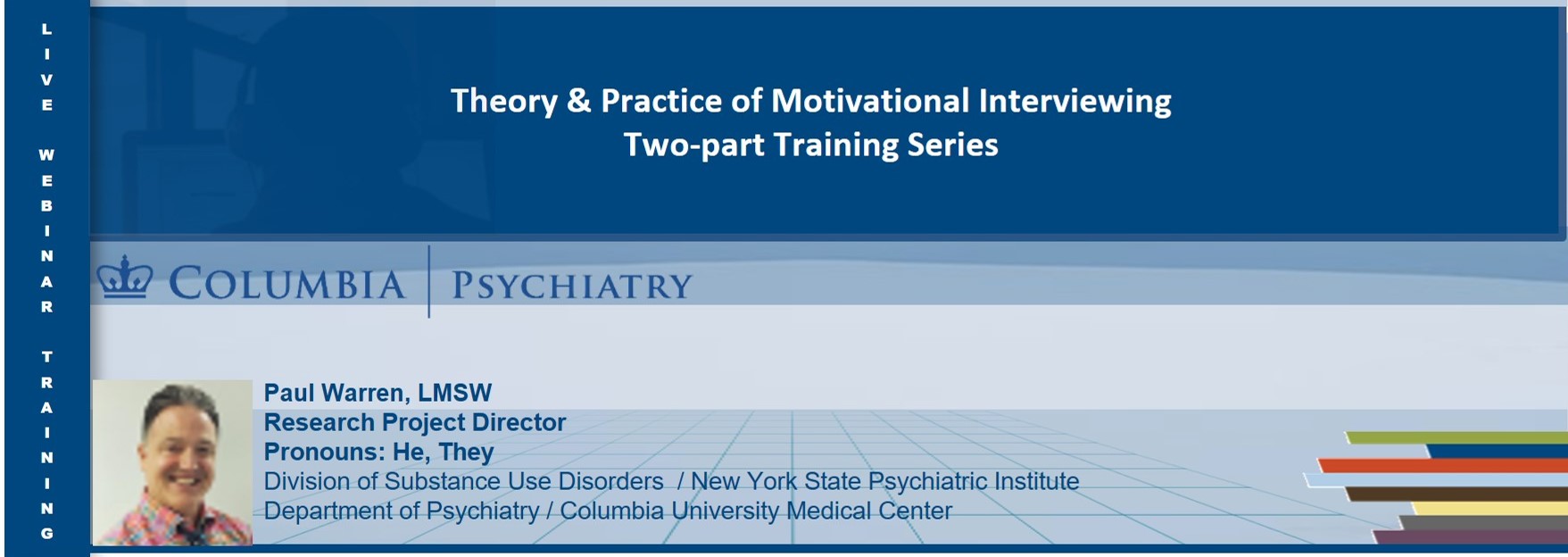 Friday, April 14 & Friday, April 21, 2023 10:00am - 1:00pm EDT
Friday, April 14 & Friday, April 21, 2023 10:00am - 1:00pm EDTMotivational interviewing is an evidence-based, conversation model for evoking and enhancing intrinsic motivation to change behaviors. In this video-conversation, participants will discuss the core components of this model and practice using the skills of Motivational Interviewing, particularly in the context of substance use behavior change(s). Prior knowledge of Motivational Interviewing is not required. This learning community is open to everyone engaging in conversations about behavior change - educational degrees or credentials are also not required.
This training met the requirements for 6 renewal hours (CASAC, CPP, CPS) and 6 initial hours (CPP, CPS) through New York State’s Office of Addiction Services and Supports (NYS OASAS). As an IC & RC member board, OASAS accredited courses were granted reciprocal approval by the New Jersey Division of Consumer Affairs, Alcohol and Drug Counselor Committee. Many other states offered reciprocity.

For more information contact: Tri at: [email protected] or Tel: (646) 774-6186
Northeast & Caribbean Addiction Technology Transfer CenterNetwork (NeC-ATTC)
1051 Riverside Drive, New York, NY 10032
Division on Substance Use Disorders | New York State Psychiatric Institute
Department of Psychiatry | Columbia University Medical Center
Disclaimer: The development of these training materials is supported by grant TI082504 (PI: M. Chaple) from the Center for Substance Abuse Treatment, Substance Abuse and Mental Health Services Administration (SAMHSA), United States Department of Health and Human Services. The contents are solely the responsibility of the Northeast and Caribbean Addiction Technology Transfer Center, and do not necessarily represent the official views of SAMHSA.
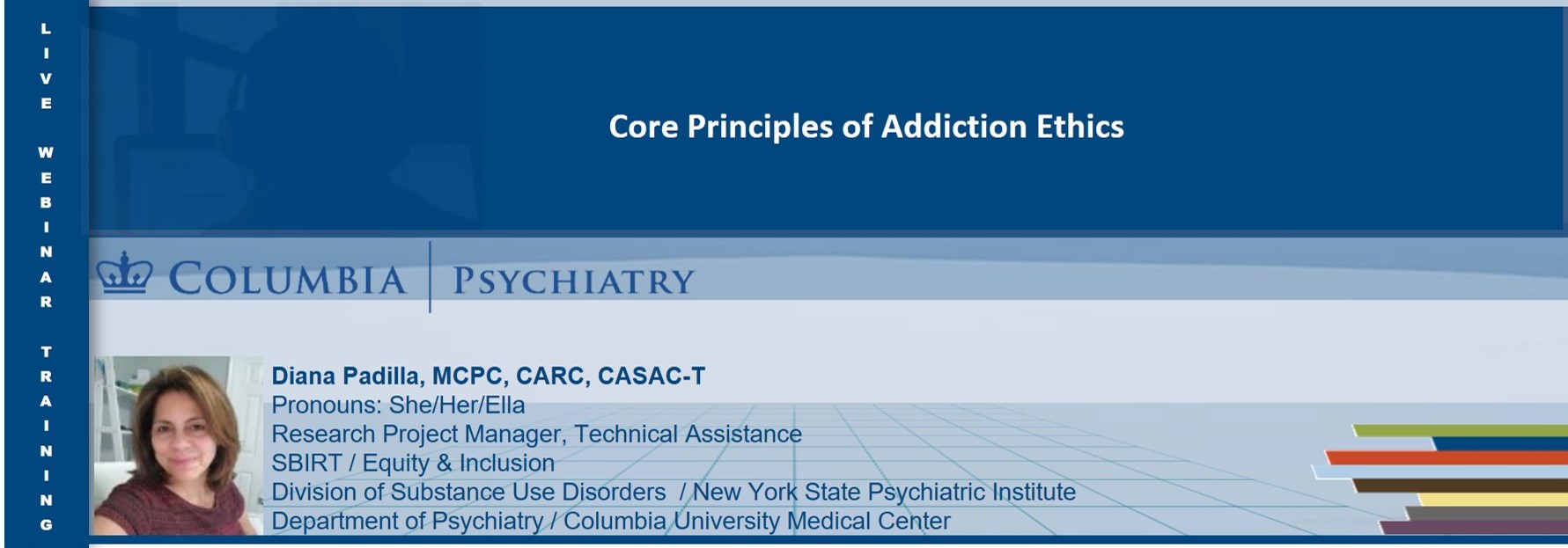
The unique factors of client situations and perspectives are addressed through patient centered care which is essential for helping individuals with substance use disorders and related concerns. This three hour interactive training will focus on the core principles ethical principles of autonomy, beneficence, nonmaleficence, and justice and they’re correlation to the Canon of Ethical Principles for Credentialed Alcoholism and Substance Abuse Counselors (CASAC).
Discussion will explore the origins of the “Do No Harm” concept, misinterpretations, and implications for practice. The content will review the application of core principles within the context of the 12 core functions of addiction counseling, and with sample case scenarios.
NOTE: As of January 1, 2018, CASACs are required to complete a continuing, 6-hour requirement for OASAS approved ethics training. This training met 3 of the 6 hours required for CASAC renewal.
This training met the requirements for 3 renewal hours (CASAC, CPP, CPS) and 3 initial hours (CPP, CPS) through New York State’s Office of Addiction Services and Supports (NYS OASAS). As an IC & RC member board, OASAS accredited courses were granted reciprocal approval by the New Jersey Division of Consumer Affairs, Alcohol and Drug Counselor Committee. Many other states offered reciprocity.

For more information contact: Tri at: [email protected] or Tel: (646) 774-6186
Northeast & Caribbean Addiction Technology Transfer CenterNetwork (NeC-ATTC)
1051 Riverside Drive, New York, NY 10032
Division on Substance Use Disorders | New York State Psychiatric Institute
Department of Psychiatry | Columbia University Medical Center
Disclaimer: The development of these training materials is supported by grant TI082504 (PI: M. Chaple) from the Center for Substance Abuse Treatment, Substance Abuse and Mental Health Services Administration (SAMHSA), United States Department of Health and Human Services. The contents are solely the responsibility of the Northeast and Caribbean Addiction Technology Transfer Center, and do not necessarily represent the official views of SAMHSA.
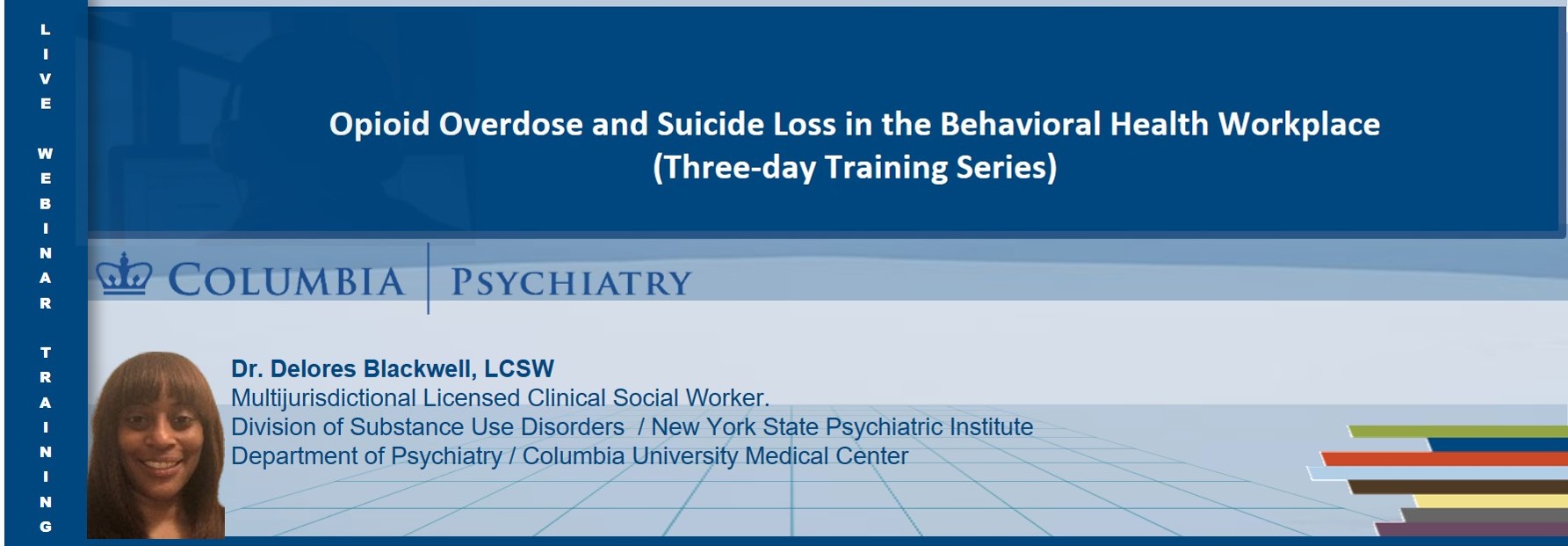
Nationwide, we continue to see an increase in both overdose and Suicide death. Each of these traumatic losses impact individual’s families and their communities, but also practitioners who provide care. This training will provide practitioners with statistics and risk identification in related to both Suicide and Overdose. Discuss Risk Management and how to begin to address Traumatic Grief and loss related to Suicide and Overdose in the Behavioral Health workspaces.
Learning Objectives:
This training met the requirements for 12 renewal hours (CASAC, CPP, CPS) and 12 initial hours (CPP, CPS) through New York State’s Office of Addiction Services and Supports (NYS OASAS). As an IC & RC member board, OASAS accredited courses were granted reciprocal approval by the New Jersey Division of Consumer Affairs, Alcohol and Drug Counselor Committee. Many other states offered reciprocity.

For more information contact: Tri at: [email protected] or Tel: (646) 774-6186
Northeast & Caribbean Addiction Technology Transfer CenterNetwork (NeC-ATTC)
1051 Riverside Drive, New York, NY 10032
Division on Substance Use Disorders | New York State Psychiatric Institute
Department of Psychiatry | Columbia University Medical Center
Disclaimer: The development of these training materials is supported by grant TI082504 (PI: M. Chaple) from the Center for Substance Abuse Treatment, Substance Abuse and Mental Health Services Administration (SAMHSA), United States Department of Health and Human Services. The contents are solely the responsibility of the Northeast and Caribbean Addiction Technology Transfer Center, and do not necessarily represent the official views of SAMHSA.
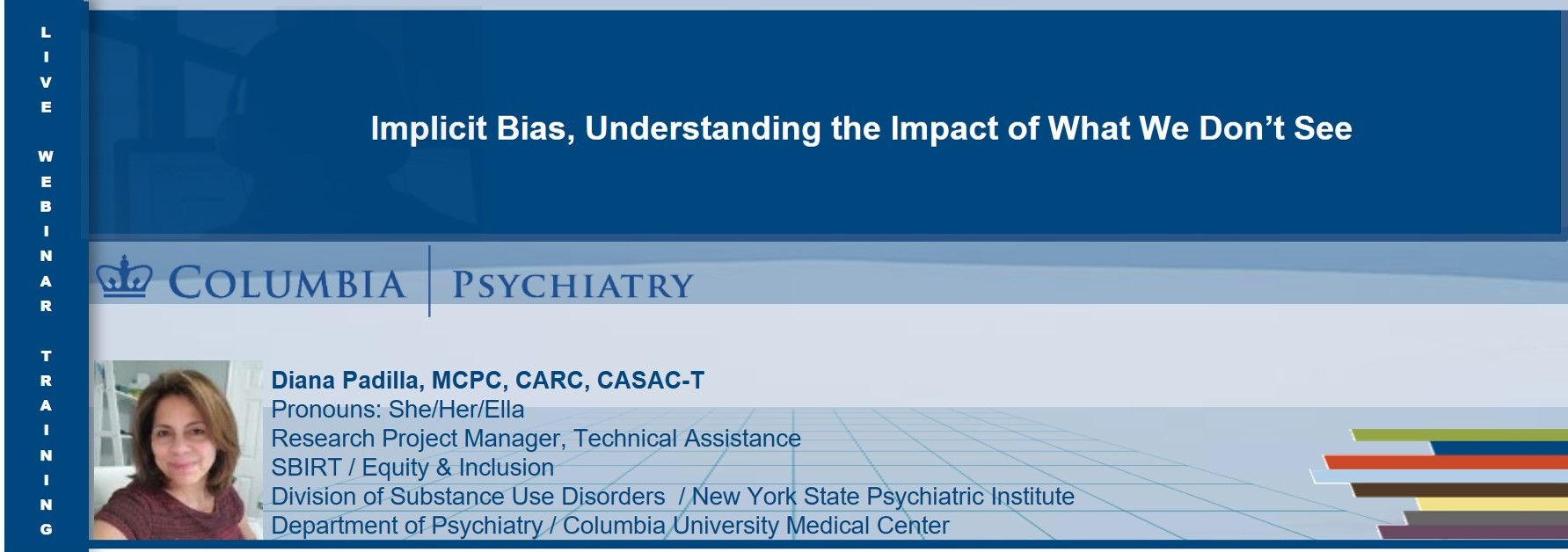
Research suggests that race and ethnicity are predictors of how services are delivered, and implicit bias is one component that has been identified as influencing the provision of poor care. The elusiveness of unconscious bias underscores provider perception, unwitting use of stigmatic language, and influences assumptions and microaggressions affecting a person's capacity to respond to care.
This interactive two-hour training will discuss how cognitive bias develops, is sustained by intrinsic and environmental factors, and contributes to inequitable outcomes for persons of color. The content will also inform on bias reducing techniques and person-first language approaches that can enhance provider-client interactions and outcomes for marginalized communities.
This training met the requirements for 2 renewal hours (CASAC, CPP, CPS) and 2 initial hours (CPP, CPS) through New York State’s Office of Addiction Services and Supports (NYS OASAS). As an IC & RC member board, OASAS accredited courses were granted reciprocal approval by the New Jersey Division of Consumer Affairs, Alcohol and Drug Counselor Committee. Many other states offered reciprocity. This training is also approved under the ASAP-NYCB Certification Board for CARC Elective & CARC/CRPA CE.

For more information contact: Tri at: [email protected] or Tel: (646) 774-6186
Northeast & Caribbean Addiction Technology Transfer CenterNetwork (NeC-ATTC)
1051 Riverside Drive, New York, NY 10032
Division on Substance Use Disorders | New York State Psychiatric Institute
Department of Psychiatry | Columbia University Medical Center
Disclaimer: The development of these training materials is supported by grant TI082504 (PI: M. Chaple) from the Center for Substance Abuse Treatment, Substance Abuse and Mental Health Services Administration (SAMHSA), United States Department of Health and Human Services. The contents are solely the responsibility of the Northeast and Caribbean Addiction Technology Transfer Center, and do not necessarily represent the official views of SAMHSA.
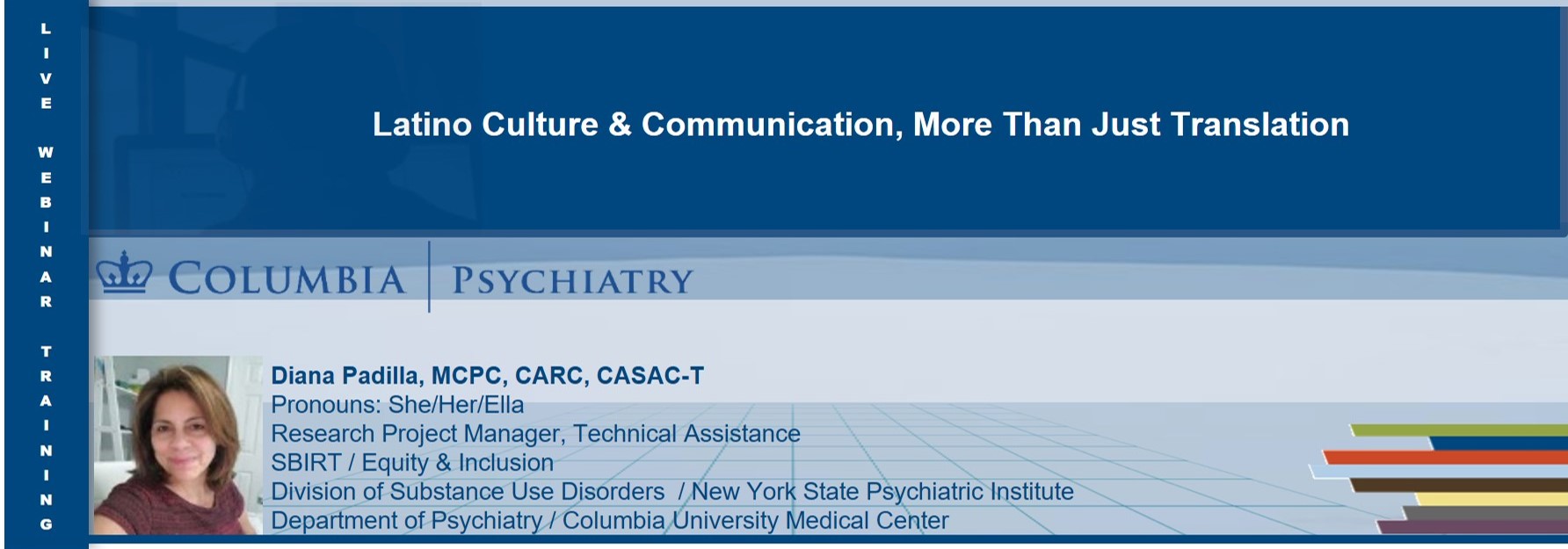
When working with Hispanic and Latino populations, clear language should never be a linear process, particularly for a collectivist society that defines and interprets experiences within a cultural context. Latino values such as ‘machismo and personalismo’ can be very insightful, but when defined and understood through an American perspective, we wonder why we feel a ‘disconnect’ with the Hispanic client/patient we need to provide prevention services to.
This interactive presentation informed on Latino cultural nuances that can reframe communication for Hispanic individuals with substance use and/or mental health problems and discussed prevention strategies to support “recuperación” (recovery).
This training met the requirements for 3 renewal hours (CASAC, CPP, CPS) and 3 initial hours (CPP, CPS) through New York State’s Office of Addiction Services and Supports (NYS OASAS). As an IC & RC member board, OASAS accredited courses were granted reciprocal approval by the New Jersey Division of Consumer Affairs, Alcohol and Drug Counselor Committee. Many other states offered reciprocity.

For more information contact: Tri at: [email protected] or Tel: (646) 774-6186
Northeast & Caribbean Addiction Technology Transfer CenterNetwork (NeC-ATTC)
1051 Riverside Drive, New York, NY 10032
Division on Substance Use Disorders | New York State Psychiatric Institute
Department of Psychiatry | Columbia University Medical Center
Disclaimer: The development of these training materials is supported by grant TI082504 (PI: M. Chaple) from the Center for Substance Abuse Treatment, Substance Abuse and Mental Health Services Administration (SAMHSA), United States Department of Health and Human Services. The contents are solely the responsibility of the Northeast and Caribbean Addiction Technology Transfer Center, and do not necessarily represent the official views of SAMHSA.
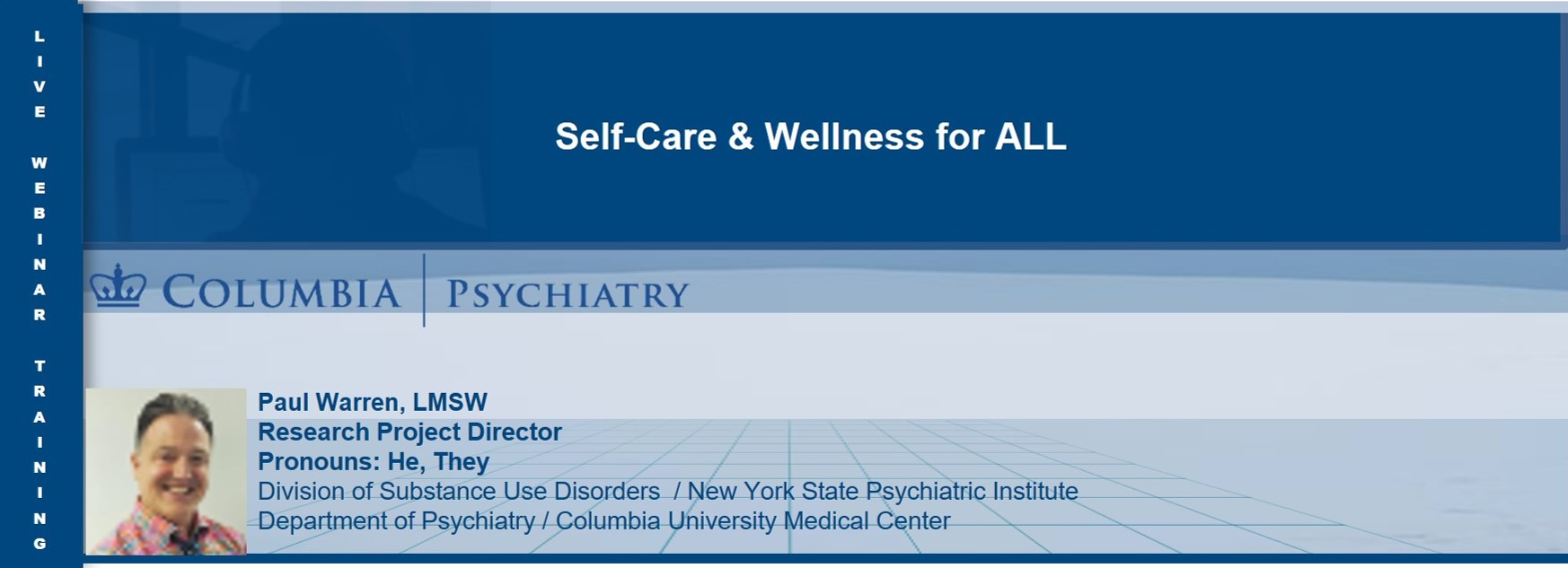
Behavioral health and healthcare settings offer a spectrum of programs including substance use, mental health, and medical and recovery services. Professionals providing these supports use an array of competencies to empathize and assist persons with substance use and other psychosocial problems. Always focused on helping others, professionals can experience challenges in practicing self-care for themselves.
This interactive workshop provided an opportunity for providers to review wellness practices and experience the benefits of intentional, micro-structured, self-care interventions. This training met the requirements for 2 renewal hours (CASAC, CPP, CPS) and 2 initial hours (CPP, CPS) through New York State’s Office of Addiction Services and Supports (NYS OASAS). As an IC & RC member board, OASAS accredited courses were granted reciprocal approval by the New Jersey Division of Consumer Affairs, Alcohol and Drug Counselor Committee. Many other states offered reciprocity.

For more information contact: Tri at: [email protected] or Tel: (646) 774-6186
Northeast & Caribbean Addiction Technology Transfer CenterNetwork (NeC-ATTC)
1051 Riverside Drive, New York, NY 10032
Division on Substance Use Disorders | New York State Psychiatric Institute
Department of Psychiatry | Columbia University Medical Center
Disclaimer: The development of these training materials is supported by grant TI082504 (PI: M. Chaple) from the Center for Substance Abuse Treatment, Substance Abuse and Mental Health Services Administration (SAMHSA), United States Department of Health and Human Services. The contents are solely the responsibility of the Northeast and Caribbean Addiction Technology Transfer Center, and do not necessarily represent the official views of SAMHSA.
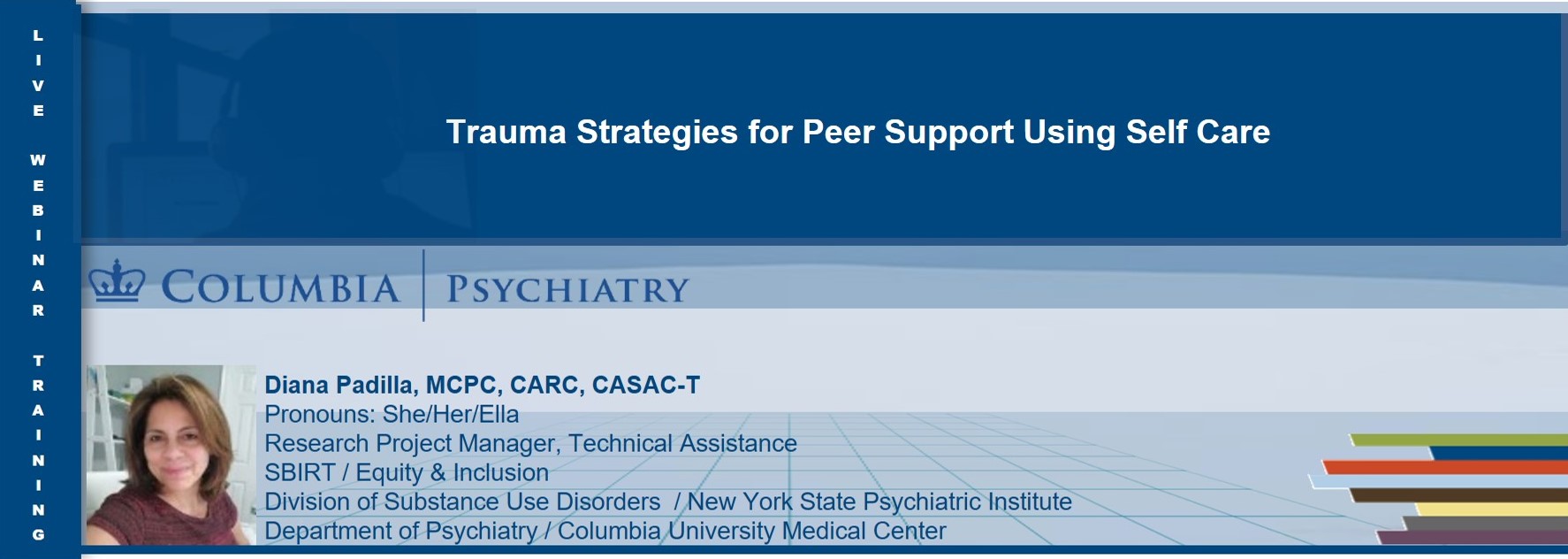
Peer professionals provide an array of recovery-oriented supports and person-centered care which include empathetic engagement with survivors of trauma circumstances. This work at times can increase the peer’s vulnerability to vicarious trauma or secondary stress. Potentially it can result in the loss of ability to objectively help others find their recovery pathways and can affect the peer’s mental and emotional wellbeing.
This two-hour interactive workshop will review how trauma situations may present, signs to recognize and cues alerting as to when to step away from a trauma inducing situation. Content will also offer practical strategies for self-care including ways to build resiliency.
This training met the requirements for renewal hours (CASAC, CPP, CPS) and 2 initial hours (CPP, CPS) through New York State’s Office of Addiction Services and Supports (NYS OASAS). As an IC & RC member board, OASAS accredited courses were granted reciprocal approval by the New Jersey Division of Consumer Affairs, Alcohol and Drug Counselor Committee. Many other states offered reciprocity This training was also approved under the ASAP-NYCB Certification Board for CARC Elective & CARC/CRPA CE in addition to OASAS-approved hours.

For more information contact: Tri at: [email protected] or Tel: (646) 774-6186
Northeast & Caribbean Addiction Technology Transfer CenterNetwork (NeC-ATTC)
1051 Riverside Drive, New York, NY 10032
Division on Substance Use Disorders | New York State Psychiatric Institute
Department of Psychiatry | Columbia University Medical Center
Disclaimer: The development of these training materials is supported by grant TI082504 (PI: M. Chaple) from the Center for Substance Abuse Treatment, Substance Abuse and Mental Health Services Administration (SAMHSA), United States Department of Health and Human Services. The contents are solely the responsibility of the Northeast and Caribbean Addiction Technology Transfer Center, and do not necessarily represent the official views of SAMHSA.
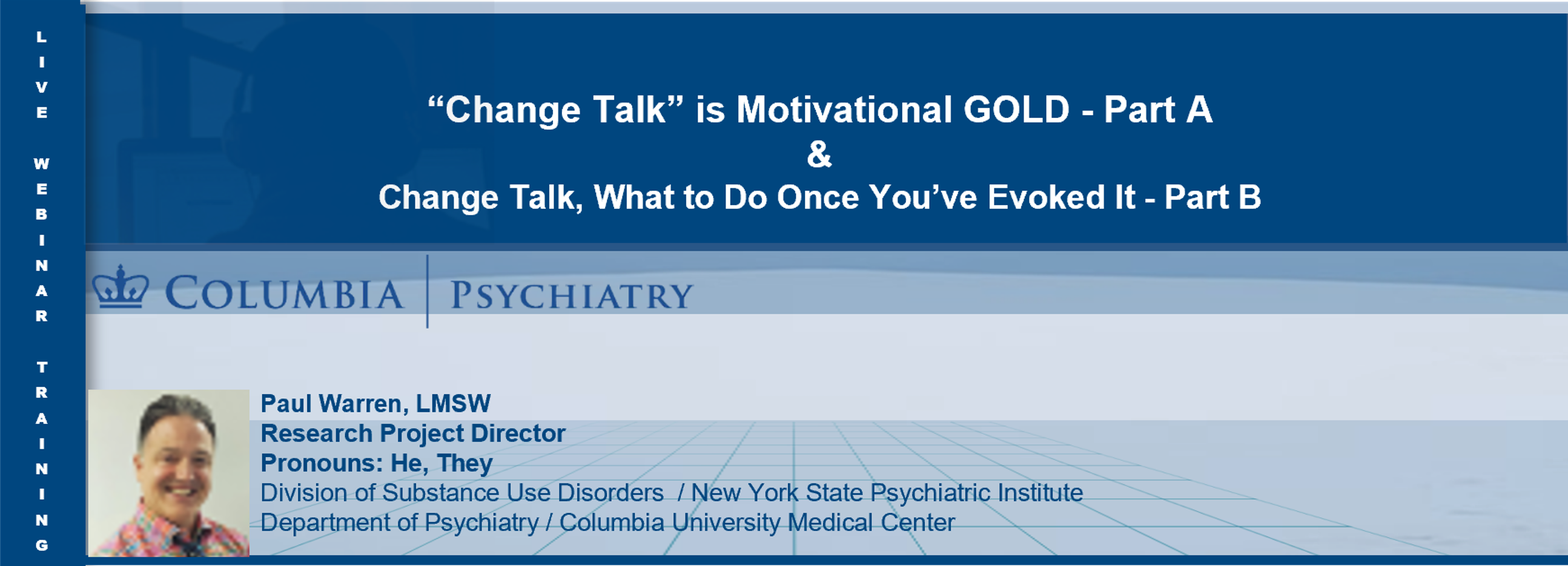
Most trainings on Motivational Interviewing (MI) convey the 'concept' of "Change Talk" as essential to the practice and stop there. This interactive Learning Community Conversation, will review the 'types' of Change Talk and provide opportunities to practice identifying this truly essential part of the language of ambivalence; along with it's often vilified counterpart, Sustain Talk. A prior working knowledge of MI is helpful if you choose to join this two-part conversation.
March 30th, Part B: Change Talk, What to Do Once You’ve Evoked It (open to those who attend Part A)
'Change Talk' is the solid GOLD motor that builds motivation for behavior change when practicing Motivational Interviewing (MI); without it the change-train is going nowhere and you're not practicing MI. During this Learning Community Conversation (LCC), we will review how to evoke Change Talk and how to employ it, once it's spoken by the client/patient. The LCC "Change Talk" Is Motivational GOLD, is a required prerequisite to join this conversation.
Each of the two trainings met the requirements for three renewal hours (CASAC, CPP, CPS) and three initial hours (CPP, CPS) through New York State’s Office of Addiction Services and Supports (NYS OASAS). As an IC & RC member board, OASAS accredited courses were granted reciprocal approval by the New Jersey Division of Consumer Affairs, Alcohol and Drug Counselor Committee. Many other states offered reciprocity.

For more information contact: Tri at: [email protected] or Tel: (646) 774-6186
Northeast & Caribbean Addiction Technology Transfer CenterNetwork (NeC-ATTC)
1051 Riverside Drive, New York, NY 10032
Division on Substance Use Disorders | New York State Psychiatric Institute
Department of Psychiatry | Columbia University Medical Center
Disclaimer: The development of these training materials is supported by grant TI082504 (PI: M. Chaple) from the Center for Substance Abuse Treatment, Substance Abuse and Mental Health Services Administration (SAMHSA), United States Department of Health and Human Services. The contents are solely the responsibility of the Northeast and Caribbean Addiction Technology Transfer Center, and do not necessarily represent the official views of SAMHSA.
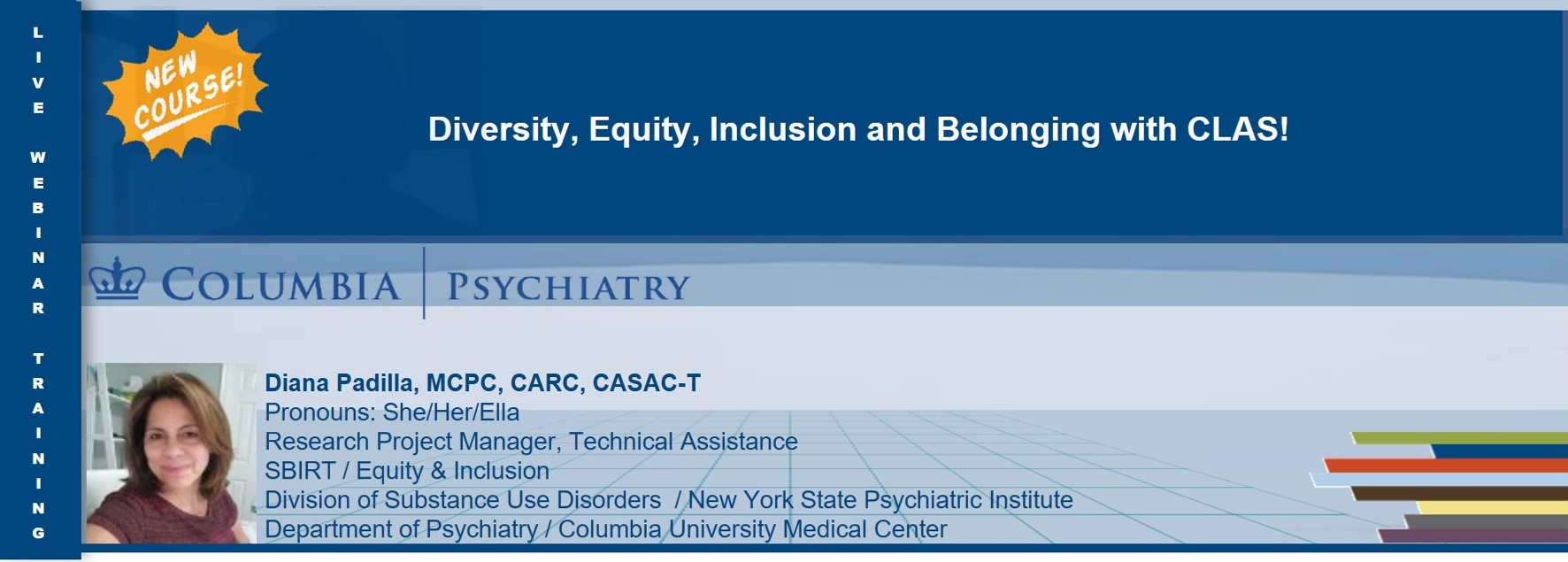
The mental and emotional well-being of diverse populations are exacerbated by social, environmental, and economic conditions that have been identified as barriers affecting help seeking behaviors. Moreover, research is indicating how organizational staff providing services to diverse communities are increasingly experiencing their own wellness challenges dealing with client loss and overwhelming responsibilities, can benefit from work environments that consider and support their wellbeing.
The National Culturally and Linguistically Appropriate Services (CLAS) Standards provide a framework to assist organizations to work more effectively and resourcefully with diverse populations. This interactive training will instruct on how to implement the National CLAS Standards within behavioral health care settings to build organizational capacity and provide culturally informed and linguistically conducive services that enhance recovery and wellness pathways, integrate strategies to reduce racial and ethnic disparities and advance behavioral health equity and inclusion for both communities and the professionals that provide care.
This training met the requirements for 3 renewal hours (CASAC, CPP, CPS) and 3 initial hours (CPP, CPS) through New York State’s Office of Addiction Services and Supports (NYS OASAS). As an IC & RC member board, OASAS accredited courses were granted reciprocal approval by the New Jersey Division of Consumer Affairs, Alcohol and Drug Counselor Committee. Many other states offered reciprocity.

For more information contact: Tri at: [email protected] or Tel: (646) 774-6186
Northeast & Caribbean Addiction Technology Transfer CenterNetwork (NeC-ATTC)
1051 Riverside Drive, New York, NY 10032
Division on Substance Use Disorders | New York State Psychiatric Institute
Department of Psychiatry | Columbia University Medical Center
Disclaimer: The development of these training materials is supported by grant TI082504 (PI: M. Chaple) from the Center for Substance Abuse Treatment, Substance Abuse and Mental Health Services Administration (SAMHSA), United States Department of Health and Human Services. The contents are solely the responsibility of the Northeast and Caribbean Addiction Technology Transfer Center, and do not necessarily represent the official views of SAMHSA
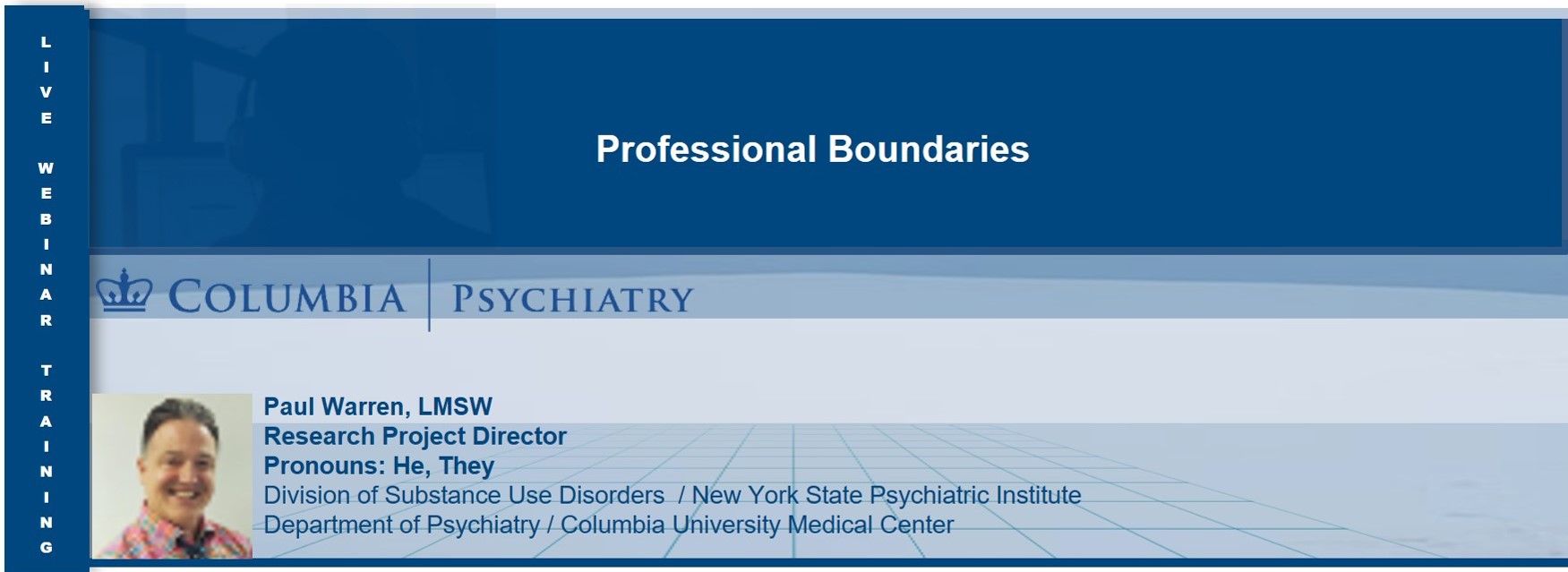
Professional boundaries set the parameters of effective and appropriate interaction between professionals and the people they serve. Boundaries protect clients and patients as well as providers. This interactive course will discuss professionalism and ethics, dual relationships, and how to build a safe working environment.
This training met the requirements for 3 renewal hours (CASAC, CPP, CPS) and 3 initial hours (CPP, CPS) through New York State’s Office of Addiction Services and Supports (NYS OASAS). As an IC & RC member board, OASAS accredited courses were granted reciprocal approval by the New Jersey Division of Consumer Affairs, Alcohol and Drug Counselor Committee. Many other states offered reciprocity

For more information contact: Tri at: [email protected] or Tel: (646) 774-6186
Northeast & Caribbean Addiction Technology Transfer CenterNetwork (NeC-ATTC)
1051 Riverside Drive, New York, NY 10032
Division on Substance Use Disorders | New York State Psychiatric Institute
Department of Psychiatry | Columbia University Medical Center
Disclaimer: The development of these training materials is supported by grant TI082504 (PI: M. Chaple) from the Center for Substance Abuse Treatment, Substance Abuse and Mental Health Services Administration (SAMHSA), United States Department of Health and Human Services. The contents are solely the responsibility of the Northeast and Caribbean Addiction Technology Transfer Center, and do not necessarily represent the official views of SAMHSA.

Research suggests that race and ethnicity are predictors of how services are delivered, and implicit bias is one component that has been identified as influencing the provision of poor care. The elusiveness of unconscious bias underscores provider perception, unwitting use of stigmatic language, and influences assumptions and microaggressions affecting a person's capacity to respond to care.
This interactive three-hour training discussed how cognitive bias develops, is sustained by intrinsic and environmental factors, and contributes to inequitable outcomes for persons of color. The content will also inform on bias reducing techniques and person-first language approaches that can enhance provider-client interactions and outcomes for marginalized communities.
This training met the requirements for 2 renewal hours (CASAC, CPP, CPS) and 2 initial hours (CPP, CPS) through New York State’s Office of Addiction Services and Supports (NYS OASAS). As an IC & RC member board, OASAS accredited courses were granted reciprocal approval by the New Jersey Division of Consumer Affairs, Alcohol and Drug Counselor Committee. Many other states offered reciprocity.

For more information contact: Tri at: [email protected] or Tel: (646) 774-6186
Northeast & Caribbean Addiction Technology Transfer CenterNetwork (NeC-ATTC)
1051 Riverside Drive, New York, NY 10032
Division on Substance Use Disorders | New York State Psychiatric Institute
Department of Psychiatry | Columbia University Medical Center
Disclaimer: The development of these training materials is supported by grant TI082504 (PI: M. Chaple) from the Center for Substance Abuse Treatment, Substance Abuse and Mental Health Services Administration (SAMHSA), United States Department of Health and Human Services. The contents are solely the responsibility of the Northeast and Caribbean Addiction Technology Transfer Center, and do not necessarily represent the official views of SAMHSA
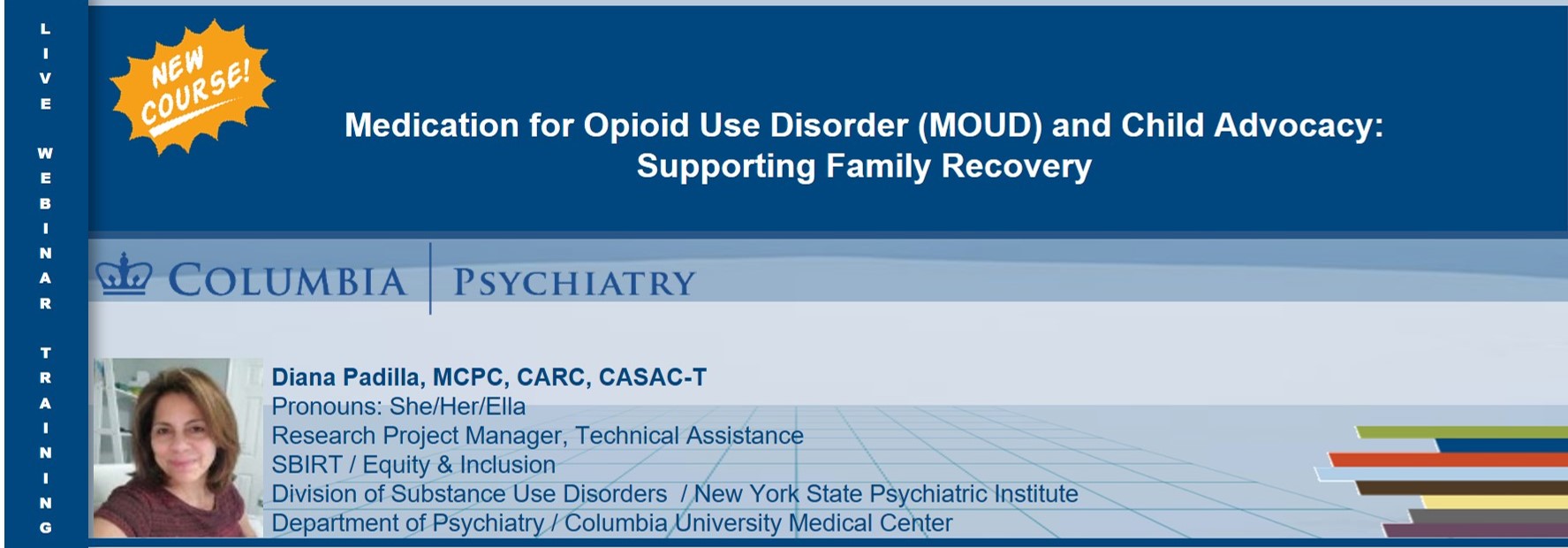
Medications for Opioid Use Disorders (MOUD) are recommended for individuals with an opioid use disorder, including pregnant women. While facilitating pathways to recovery for the person with an opioid use disorder (OUD) is appropriate, it is important to consider and address the severe effects OUD has on family relationships and functioning. Children are especially vulnerable and are at an increased risk of trauma, academic challenges, or child neglect, which can disrupt healthy development. This interactive webinar will define opioid use disorder (OUD), review adverse effects of opioid use on family dynamics, and review behavioral and developmental concerns for children, including neonatal abstinence syndrome (NAS). The content will also discuss medications recommended to treat OUD and inform on approaches to support healthy recovery for children and family wellness.
This training meets the requirements for 2 renewal hours (CASAC, CPP, CPS) and 2 initial hours (CPP, CPS) through New York State’s Office of Addiction Services and Supports (NYS OASAS). As an IC & RC member board, OASAS accredited courses are granted reciprocal approval by the New Jersey Division of Consumer Affairs, Alcohol and Drug Counselor Committee. Many other states offered reciprocity - please check with your accrediting agency.

For more information contact: Tri at: [email protected] or Tel: (646) 774-6186
Northeast & Caribbean Addiction Technology Transfer CenterNetwork (NeC-ATTC)
1051 Riverside Drive, New York, NY 10032
Division on Substance Use Disorders | New York State Psychiatric Institute
Department of Psychiatry | Columbia University Medical Center
Disclaimer: The development of these training materials is supported by grant TI082504 (PI: M. Chaple) from the Center for Substance Abuse Treatment, Substance Abuse and Mental Health Services Administration (SAMHSA), United States Department of Health and Human Services. The contents are solely the responsibility of the Northeast and Caribbean Addiction Technology Transfer Center, and do not necessarily represent the official views of SAMHSA
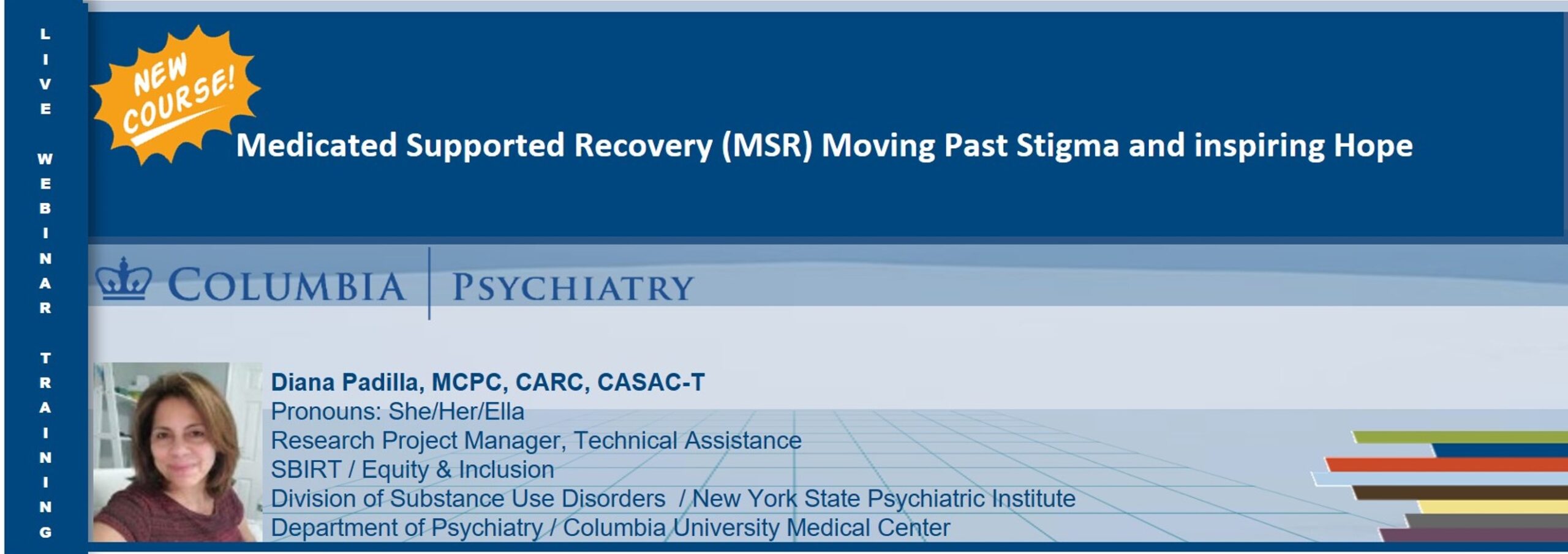
According to the CDC, opioid overdose deaths surpassed 100, 000 during the 12-month period ending in December 2021, and is continuing to rise. On any given year, up to 90% of people needing addiction services do not access treatment.
This four hour, interactive training will review different types of MSR (medication supported recovery, previously referred to as MAT) approaches for opioid use disorders (OUD). It has long been noted that many types of treatment services are often stigmatized and prevent many people from seeking much needed help. The Content will examine how personal bias and stereotypical factors can negatively influence opportunities to speak about the benefits of MSR as an option for clients. Also included is the importance of using recovery oriented language and language practice activities to help enhance the peer professional’s communication skills and provide person centered support to clients on their recovery journey.
NOTE: Please note that this course is specifically designed for Peer Support Specialists and their roles. But Peer Supervisors and other behavioral health professionals would benefit.
*This specific course meets 4 hours minimum on Medication Supported Recovery (formerly MAT) required toward the 50 hours of the required foundational training toward Initial Certification for CARC/CPRA, (ASAP NYCB Certification Board)
This training met the requirements for 4 renewal hours (CASAC, CPP, CPS) and 4 initial hours (CPP, CPS) through New York State’s Office of Addiction Services and Supports (NYS OASAS). As an IC & RC member board, OASAS accredited courses were granted reciprocal approval by the New Jersey Division of Consumer Affairs, Alcohol and Drug Counselor Committee. Many other states offer reciprocity.

For more information contact: Tri at: [email protected] or Tel: (646) 774-6186
Northeast & Caribbean Addiction Technology Transfer CenterNetwork (NeC-ATTC)
1051 Riverside Drive, New York, NY 10032
Division on Substance Use Disorders | New York State Psychiatric Institute
Department of Psychiatry | Columbia University Medical Center
Disclaimer: The development of these training materials is supported by grant TI082504 (PI: M. Chaple) from the Center for Substance Abuse Treatment, Substance Abuse and Mental Health Services Administration (SAMHSA), United States Department of Health and Human Services. The contents are solely the responsibility of the Northeast and Caribbean Addiction Technology Transfer Center, and do not necessarily represent the official views of SAMHSA
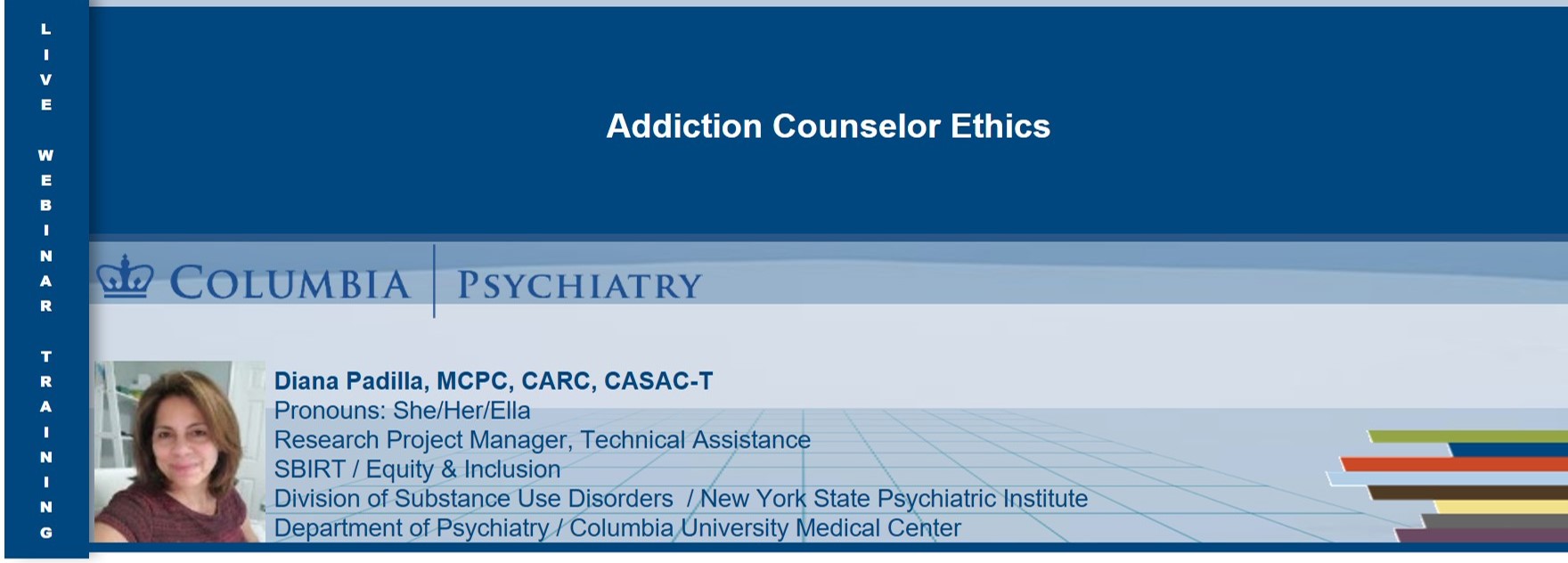
Various situations and professional perspectives are considered when helping individuals with substance use disorders. As such, counselors are guided by ethical principles based on courage, empathy, humility, and respect.
This three-hour interactive training reviewed the Canon of Ethical Principles for Credentialed Alcoholism and Substance Abuse Counselors (CASAC). Topics include definitions, principles, and questions emerging from challenging situations. Content will further discuss the concept of, “do no harm,” and implications for practice.
NOTE: As of January 1, 2018, CASACs are required to complete a continuing, 6-hour requirement for OASAS approved ethics training. This training meets 3 of the 6 hours required for CASAC renewal.
This training met approval for 3 renewal hours (CASAC, CPP, CPS) and 3 initial hours (CPP, CPS) through New York State’s Office of Addiction Services and Supports (NYS OASAS). As an IC & RC member board, OASAS accredited courses were granted reciprocal approval by the New Jersey Division of Consumer Affairs, Alcohol and Drug Counselor Committee. Many other states offered reciprocity.

For more information contact: Tri at: [email protected] or Tel: (646) 774-6186
Northeast & Caribbean Addiction Technology Transfer CenterNetwork (NeC-ATTC)
1051 Riverside Drive, New York, NY 10032
Division on Substance Use Disorders | New York State Psychiatric Institute
Department of Psychiatry | Columbia University Medical Center
Disclaimer: The development of these training materials is supported by grant TI082504 (PI: M. Chaple) from the Center for Substance Abuse Treatment, Substance Abuse and Mental Health Services Administration (SAMHSA), United States Department of Health and Human Services. The contents are solely the responsibility of the Northeast and Caribbean Addiction Technology Transfer Center, and do not necessarily represent the official views of SAMHSA
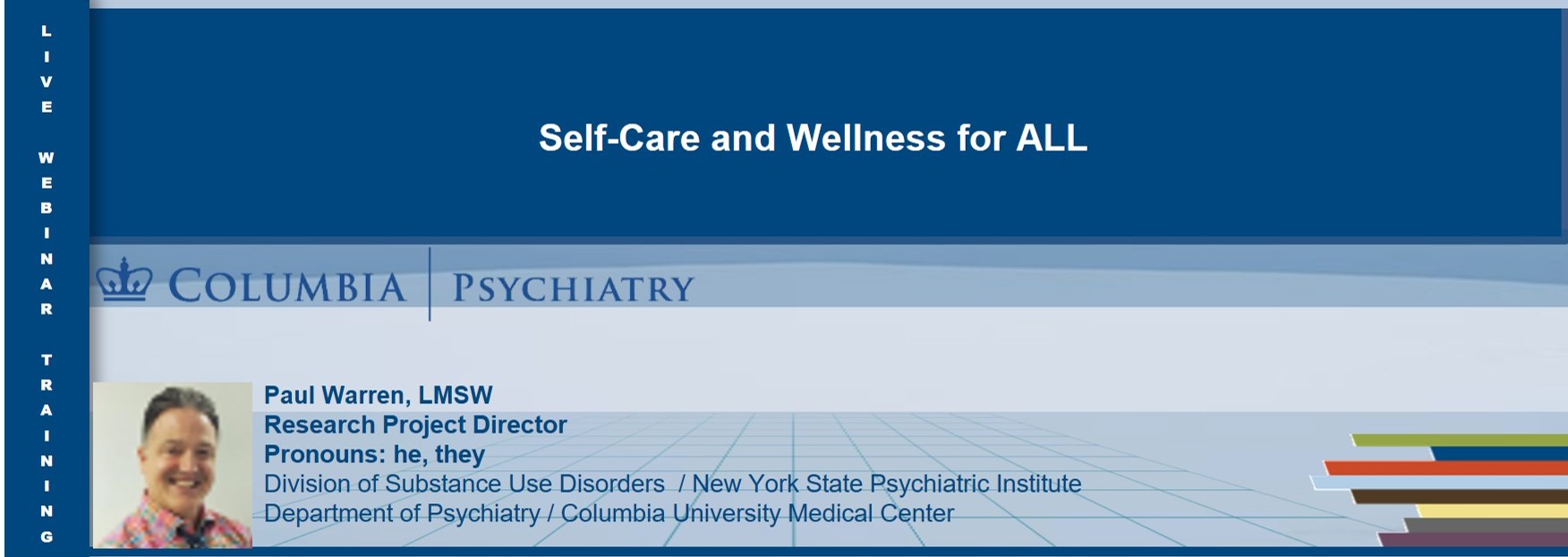
Behavioral health and health care settings offer a spectrum of programs including substance use, mental health, and medical and recovery services. Professionals providing these supports use an array of competencies to empathize and assist persons with substance use and other psychosocial problems. Always focused on helping others, professionals can experience challenges in practicing self-care for themselves. This interactive workshop provides an opportunity for providers to review wellness practices and experience the benefits of intention
This training met the requirements for 2 renewal hours (CASAC, CPP, CPS) and 2 initial hours (CPP, CPS) through New York State’s Office of Addiction Services and Supports (NYS OASAS). As an IC & RC member board, OASAS accredited courses were granted reciprocal approval by the New Jersey Division of Consumer Affairs, Alcohol and Drug Counselor Committee. Many other states offered reciprocity

For more information contact: Tri at: [email protected] or Tel: (646) 774-6186
Northeast & Caribbean Addiction Technology Transfer CenterNetwork (NeC-ATTC)
1051 Riverside Drive, New York, NY 10032
Division on Substance Use Disorders | New York State Psychiatric Institute
Department of Psychiatry | Columbia University Medical Center
Disclaimer: The development of these training materials is supported by grant TI082504 (PI: M. Chaple) from the Center for Substance Abuse Treatment, Substance Abuse and Mental Health Services Administration (SAMHSA), United States Department of Health and Human Services. The contents are solely the responsibility of the Northeast and Caribbean Addiction Technology Transfer Center, and do not necessarily represent the official views of SAMHSA
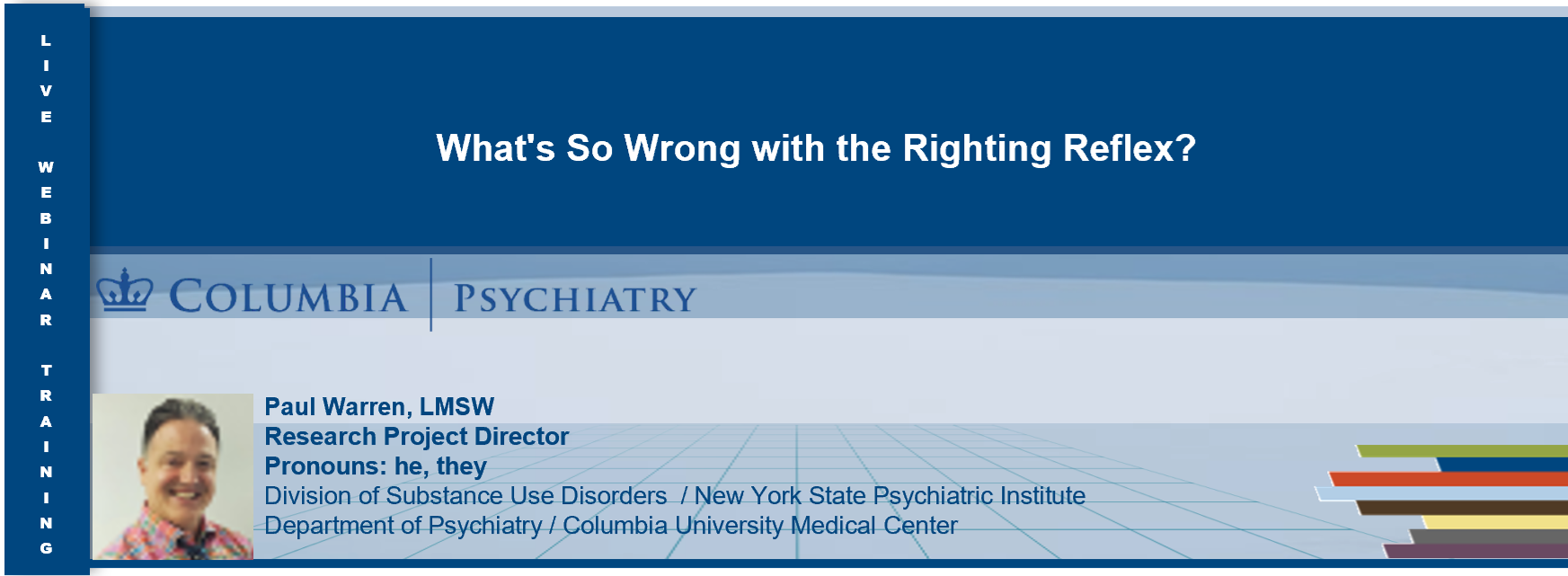
An ATTC learning-community-conversation focused on 'help' that is helpful and 'help' that is not. This interactive opportunity explores the complex reasons workers are drawn to the helping professions and how some forms of 'helping' can become a worker-evoked barrier to positive health/life outcomes. Being client-centered and nondirective are more than ideas; they require intentional approaches and actions. Effective methods of helping and their related skills will be reviewed and practiced.
Learning Objectives:
Outline:
Welcome, Logistics & Introductions
What is the Righting (Fixing) Reflex
Why you help
Since I'm an Expert, why can't I be directive?
The Client/Patient is the Expert
Help that's helpful
NO CURE, life long management
What to do next
This training met the requirements for 2 renewal hours (CASAC, CPP, CPS) and 2 initial hours (CPP, CPS) through New York State’s Office of Addiction Services and Supports (NYS OASAS). As an IC & RC member board, OASAS accredited courses were granted reciprocal approval by the New Jersey Division of Consumer Affairs, Alcohol and Drug Counselor Committee. Many other states offered reciprocity.

For more information contact: Tri at: [email protected] or Tel: (646) 774-6186
Northeast & Caribbean Addiction Technology Transfer CenterNetwork (NeC-ATTC)
1051 Riverside Drive, New York, NY 10032
Division on Substance Use Disorders | New York State Psychiatric Institute
Department of Psychiatry | Columbia University Medical Center
Disclaimer: The development of these training materials is supported by grant TI082504 (PI: M. Chaple) from the Center for Substance Abuse Treatment, Substance Abuse and Mental Health Services Administration (SAMHSA), United States Department of Health and Human Services. The contents are solely the responsibility of the Northeast and Caribbean Addiction Technology Transfer Center, and do not necessarily represent the official views of SAMHSA
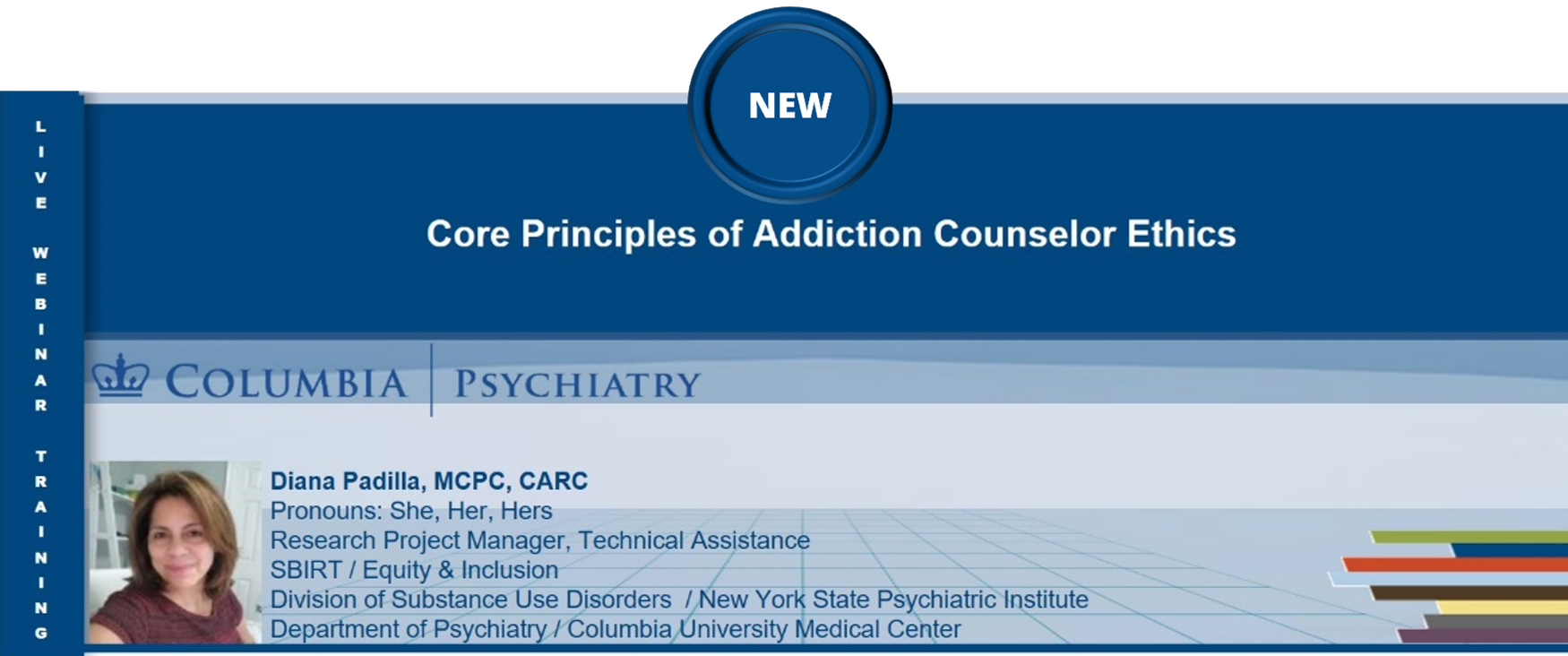
The unique factors of client situations and perspectives are addressed through patient centered care which is essential for helping individuals with substance use disorders and related concerns. This three hour interactive training will focus on the core principles ethical principles of autonomy, beneficence, nonmaleficence, and justice and they’re correlation to the Canon of Ethical Principles for Credentialed Alcoholism and Substance Abuse Counselors (CASAC). Discussion will explore the origins of the “Do No Harm” concept, misinterpretations, and implications for practice. The content will review the application of core principles within the context of the 12 core functions of addiction counseling, and with sample case scenarios.
NOTE: As of January 1, 2018, CASACs are required to complete a continuing, 6-hour requirement for OASAS approved ethics training. This training met 3 of the 6 hours required for CASAC renewal.
This training met the requirements for 3 renewal hours (CASAC, CPP, CPS) and 3 initial hours (CPP, CPS) through New York State’s Office of Addiction Services and Supports (NYS OASAS). As an IC & RC member board, OASAS accredited courses were granted reciprocal approval by the New Jersey Division of Consumer Affairs, Alcohol and Drug Counselor Committee. Many other states offered reciprocity

For more information contact: Tri at: [email protected] or Tel: (646) 774-6186
Northeast & Caribbean Addiction Technology Transfer CenterNetwork (NeC-ATTC)
1051 Riverside Drive, New York, NY 10032
Division on Substance Use Disorders | New York State Psychiatric Institute
Department of Psychiatry | Columbia University Medical Center
Disclaimer: The development of these training materials is supported by grant TI082504 (PI: M. Chaple) from the Center for Substance Abuse Treatment, Substance Abuse and Mental Health Services Administration (SAMHSA), United States Department of Health and Human Services. The contents are solely the responsibility of the Northeast and Caribbean Addiction Technology Transfer Center, and do not necessarily represent the official views of SAMHSA

Research suggests that race and ethnicity are predictors of how services are delivered, and implicit bias is one component (of many) that is been identified as influencing the provision of poor care. The elusiveness of unconscious bias underscores provider perception, unwitting use of stigmatic language, and instigates assumptions and microaggressions affecting a person's capacity to respond to care.
This interactive two-hour training will discuss how cognitive bias develops, is sustained by intrinsic and environmental factors, and contributes to inequitable outcomes for persons of color. The content will also inform on bias reducing techniques and person-first language approaches that can enhance provider-client interactions and outcomes for marginalized communities.
This training met the requirements for 2 renewal hours (CASAC, CPP, CPS) and 2 initial hours (CPP, CPS) through New York State’s Office of Addiction Services and Supports (NYS OASAS). As an IC & RC member board, OASAS accredited courses were granted reciprocal approval by the New Jersey Division of Consumer Affairs, Alcohol and Drug Counselor Committee. Many other states offered reciprocity. This training was approved under the ASAP-NYCB Certification Board for CARC Elective & CARC/CRPA CE in addition to OASAS-approved hours.

For more information contact: Tri at: [email protected] or Tel: (646) 774-6186
Northeast & Caribbean Addiction Technology Transfer CenterNetwork (NeC-ATTC)
1051 Riverside Drive, New York, NY 10032
Division on Substance Use Disorders | New York State Psychiatric Institute
Department of Psychiatry | Columbia University Medical Center
Disclaimer: The development of these training materials is supported by grant TI082504 (PI: M. Chaple) from the Center for Substance Abuse Treatment, Substance Abuse and Mental Health Services Administration (SAMHSA), United States Department of Health and Human Services. The contents are solely the responsibility of the Northeast and Caribbean Addiction Technology Transfer Center, and do not necessarily represent the official views of SAMHSA
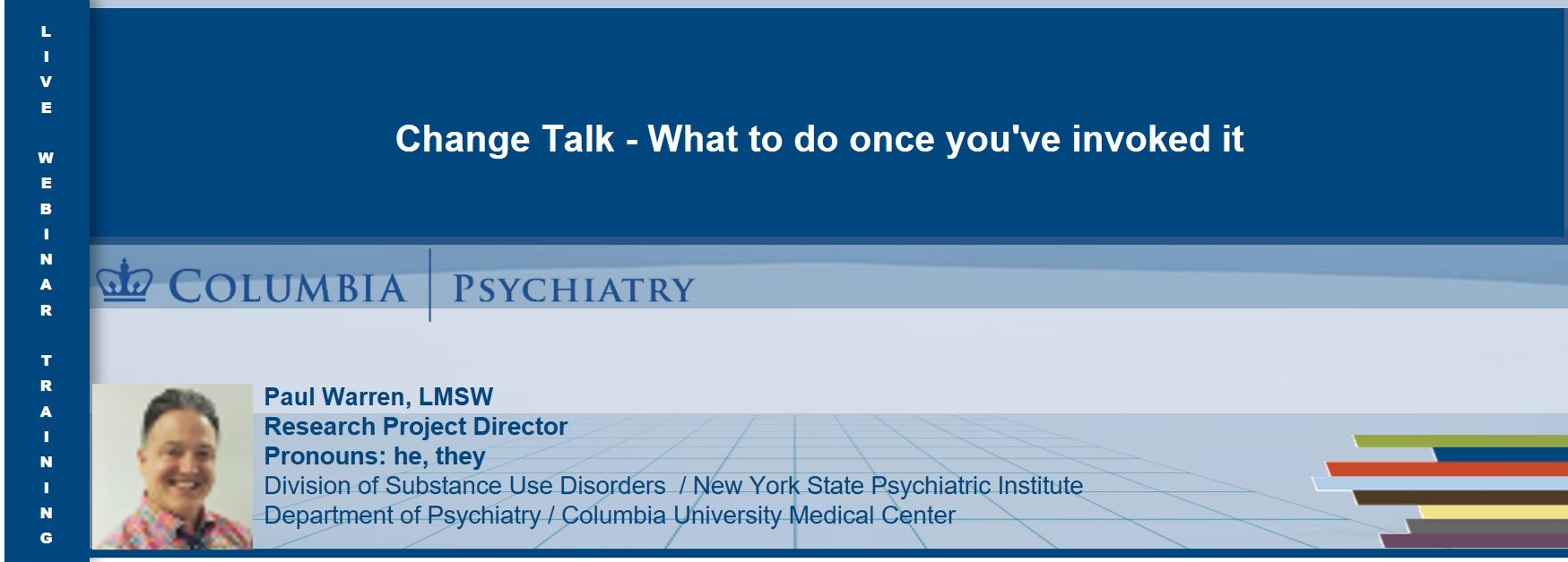
Most trainings on Motivational Interviewing don't do more than convey the 'concept' of "Change Talk" as something essential to the success of this evidence-based practice. This training goes beyond concept and into action. You will learn how to evoke Change Talk and what to do with it. A prior knowledge of the CORE skills of MI (OARS) is helpful, but not required to join us.
This training met the requirements for 2 renewal hours (CASAC, CPP, CPS) and 2 initial hours (CPP, CPS) through New York State’s Office of Addiction Services and Supports (NYS OASAS). As an IC & RC member board, OASAS accredited courses were granted reciprocal approval by the New Jersey Division of Consumer Affairs, Alcohol and Drug Counselor Committee. Many other states offered reciprocity

For more information contact: Tri at: [email protected] or Tel: (646) 774-6186
Northeast & Caribbean Addiction Technology Transfer CenterNetwork (NeC-ATTC)
1051 Riverside Drive, New York, NY 10032
Division on Substance Use Disorders | New York State Psychiatric Institute
Department of Psychiatry | Columbia University Medical Center
Disclaimer: The development of these training materials is supported by grant TI082504 (PI: M. Chaple) from the Center for Substance Abuse Treatment, Substance Abuse and Mental Health Services Administration (SAMHSA), United States Department of Health and Human Services. The contents are solely the responsibility of the Northeast and Caribbean Addiction Technology Transfer Center, and do not necessarily represent the official views of SAMHSA
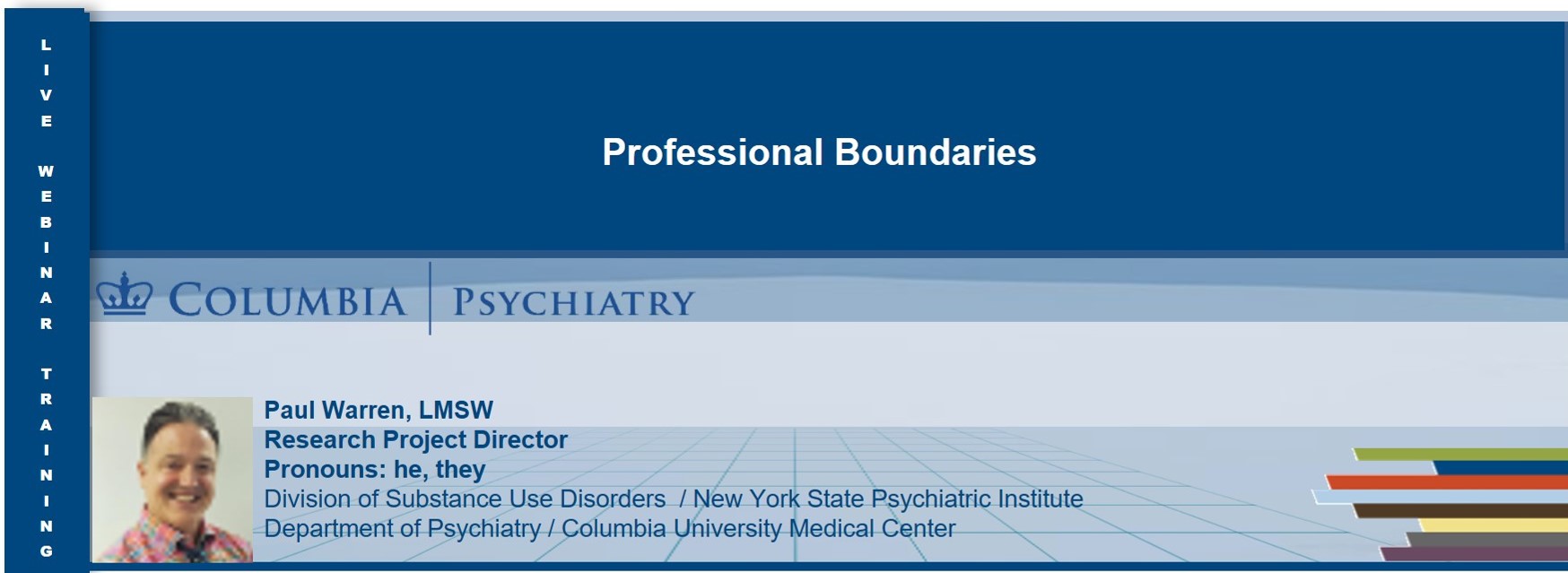
Professional boundaries set the parameters of effective and appropriate interaction between professionals and the people they serve. Boundaries protect clients and patients as well as providers. This interactive course will discuss professionalism and ethics, dual relationships, and how to build a safe working environment.
This training met the requirements for 3 renewal hours (CASAC, CPP, CPS) and 3 initial hours (CPP, CPS) through New York State’s Office of Addiction Services and Supports (NYS OASAS). As an IC & RC member board, OASAS accredited courses were granted reciprocal approval by the New Jersey Division of Consumer Affairs, Alcohol and Drug Counselor Committee. Many other states offered reciprocity.

For more information contact: Tri at: [email protected] or Tel: (646) 774-6186
Northeast & Caribbean Addiction Technology Transfer CenterNetwork (NeC-ATTC)
1051 Riverside Drive, New York, NY 10032
Division on Substance Use Disorders | New York State Psychiatric Institute
Department of Psychiatry | Columbia University Medical Center
Disclaimer: The development of these training materials is supported by grant TI082504 (PI: M. Chaple) from the Center for Substance Abuse Treatment, Substance Abuse and Mental Health Services Administration (SAMHSA), United States Department of Health and Human Services. The contents are solely the responsibility of the Northeast and Caribbean Addiction Technology Transfer Center, and do not necessarily represent the official views of SAMHSA
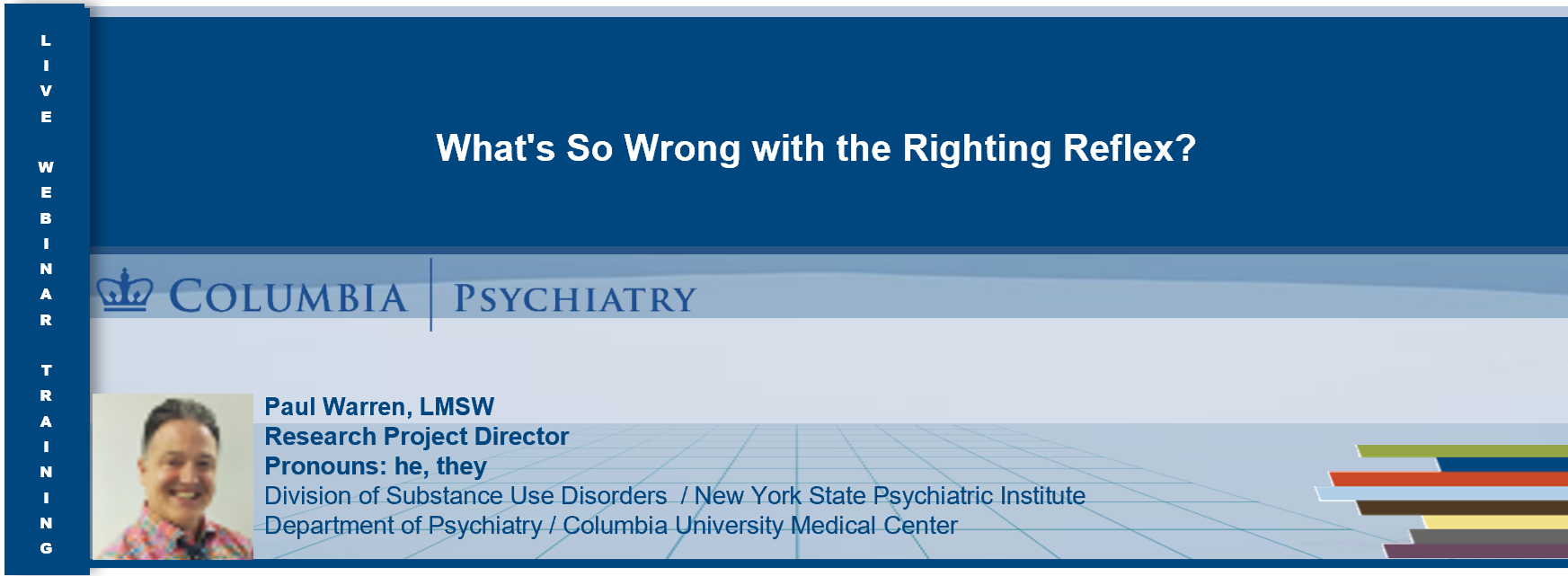
An ATTC learning-community-conversation focused on 'help' that is helpful and 'help' that is not. This interactive opportunity explores the complex reasons workers are drawn to the helping professions and how some forms of 'helping' can become a worker-evoked barrier to positive health/life outcomes. Being client-centered and nondirective are more than ideas; they require intentional approaches and actions. Effective methods of helping and their related skills will be reviewed and practiced.
Learning Objectives:
Outline:
Welcome, Logistics & Introductions
What is the Righting (Fixing) Reflex
Why you help
Since I'm an Expert, why can't I be directive?
The Client/Patient is the Expert
Help that's helpful
NO CURE, life long management
What to do next
This training met the requirements for 4 renewal hours (CASAC, CPP, CPS) and 4 initial hours (CPP, CPS) through New York State’s Office of Addiction Services and Supports (NYS OASAS). As an IC & RC member board, OASAS accredited courses were granted reciprocal approval by the New Jersey Division of Consumer Affairs, Alcohol and Drug Counselor Committee. Many other states offered reciprocity

For more information contact: Tri at: [email protected] or Tel: (646) 774-6186
Northeast & Caribbean Addiction Technology Transfer CenterNetwork (NeC-ATTC)
1051 Riverside Drive, New York, NY 10032
Division on Substance Use Disorders | New York State Psychiatric Institute
Department of Psychiatry | Columbia University Medical Center
Disclaimer: The development of these training materials is supported by grant TI082504 (PI: M. Chaple) from the Center for Substance Abuse Treatment, Substance Abuse and Mental Health Services Administration (SAMHSA), United States Department of Health and Human Services. The contents are solely the responsibility of the Northeast and Caribbean Addiction Technology Transfer Center, and do not necessarily represent the official views of SAMHSA
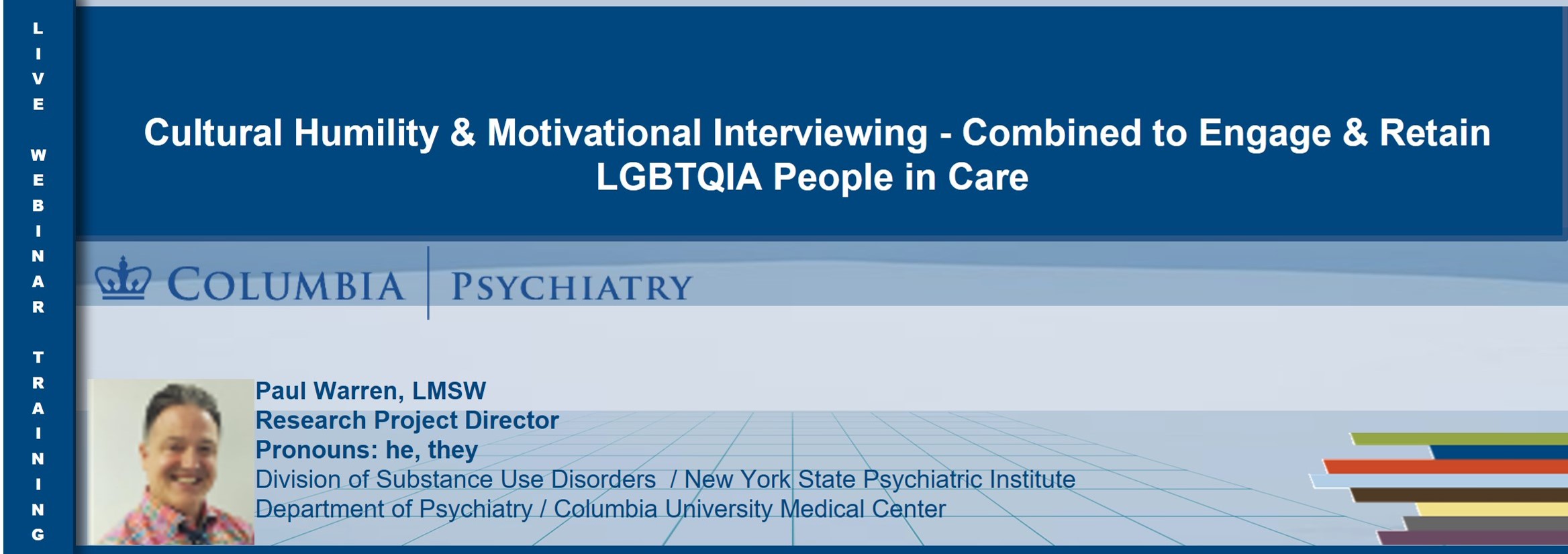
LGBTQIA people are much more than their sexual orientation and gender identity. This interactive webinar combines the perspectives and practices of both Cultural Humility and Motivational Interviewing, inviting participants to consider how these approaches, used in tandem, can enhance engagement and retention of LGBTQIA people.
This training met the requirements for 2 renewal hours (CASAC, CPP, CPS) and 2 initial hours (CPP, CPS) through New York State’s Office of Addiction Services and Supports (NYS OASAS). As an IC & RC member board, OASAS accredited courses are granted reciprocal approval by the New Jersey Division of Consumer Affairs, Alcohol and Drug Counselor Committee. Many other states offered reciprocity.

For more information contact: Tri at: [email protected] or Tel: (646) 774-6186
Northeast & Caribbean Addiction Technology Transfer CenterNetwork (NeC-ATTC)
1051 Riverside Drive, New York, NY 10032
Division on Substance Use Disorders | New York State Psychiatric Institute
Department of Psychiatry | Columbia University Medical Center
Disclaimer: The development of these training materials is supported by grant TI082504 (PI: M. Chaple) from the Center for Substance Abuse Treatment, Substance Abuse and Mental Health Services Administration (SAMHSA), United States Department of Health and Human Services. The contents are solely the responsibility of the Northeast and Caribbean Addiction Technology Transfer Center, and do not necessarily represent the official views of SAMHSA
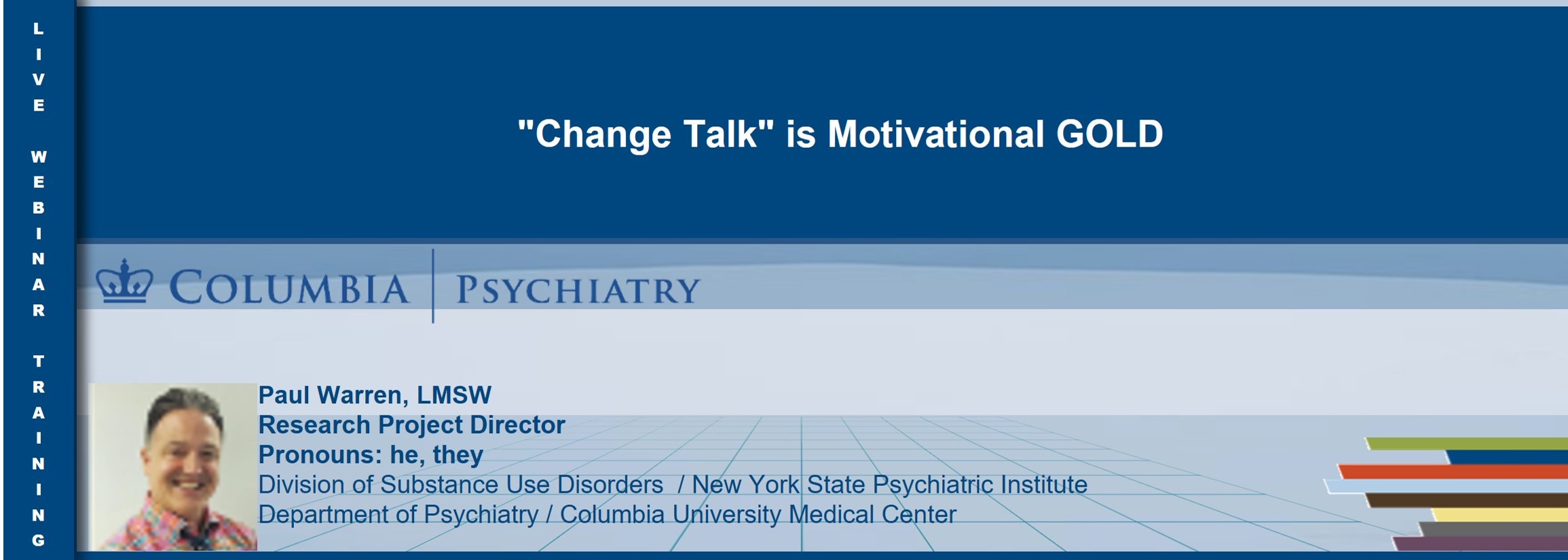
Most trainings on Motivational Interviewing convey the 'concept' of "Change Talk" as essential and ignore or gloss over how to intentionally use Change Talk to build motivation for change. This practice session goes beyond concept and into action. You will learn how to evoke Change Talk and what to do with it when you hear it. A prior knowledge of the CORE skills of MI (OARS) is helpful and not required to join this Learning Community Practice Session (LCPS).
This training met the requirements for 2 renewal hours (CASAC, CPP, CPS) and 2 initial hours (CPP, CPS) through New York State’s Office of Addiction Services and Supports (NYS OASAS). As an IC & RC member board, OASAS accredited courses are granted reciprocal approval by the New Jersey Division of Consumer Affairs, Alcohol and Drug Counselor Committee. Many other states offered reciprocity

For more information contact: Tri at: [email protected] or Tel: (646) 774-6186
Northeast & Caribbean Addiction Technology Transfer CenterNetwork (NeC-ATTC)
1051 Riverside Drive, New York, NY 10032
Division on Substance Use Disorders | New York State Psychiatric Institute
Department of Psychiatry | Columbia University Medical Center
Disclaimer: The development of these training materials is supported by grant TI082504 (PI: M. Chaple) from the Center for Substance Abuse Treatment, Substance Abuse and Mental Health Services Administration (SAMHSA), United States Department of Health and Human Services. The contents are solely the responsibility of the Northeast and Caribbean Addiction Technology Transfer Center, and do not necessarily represent the official views of SAMHSA
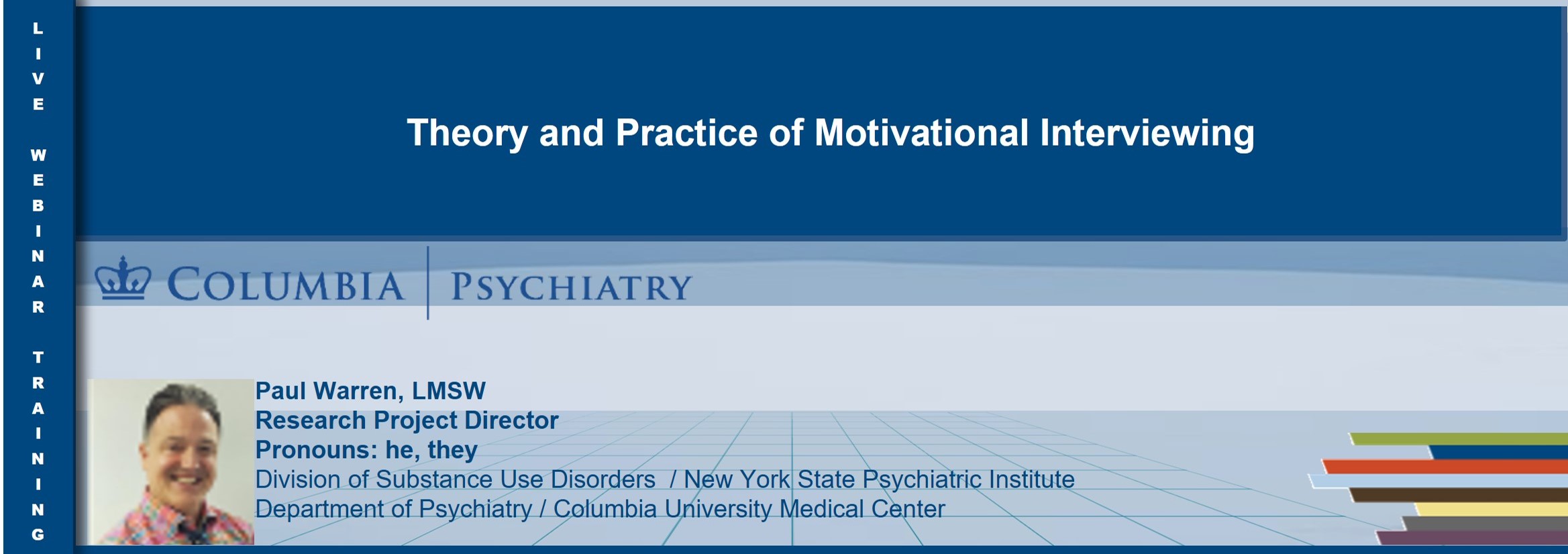
Motivational interviewing is an evidence-based, conversation model for evoking and enhancing intrinsic motivation to change behaviors. In this video-conversation, participants will discuss the core components of this model and practice using the skills of Motivational Interviewing, particularly in the context of substance use behavior change(s). Prior knowledge of Motivational Interviewing is not required. This learning community is open to everyone engaging in conversations about behavior change - educational degrees or credentials are also not required.
This training met the requirements for 3 renewal hours (CASAC, CPP, CPS) and 3 initial hours (CPP, CPS) through New York State’s Office of Addiction Services and Supports (NYS OASAS). As an IC & RC member board, OASAS accredited courses are granted reciprocal approval by the New Jersey Division of Consumer Affairs, Alcohol and Drug Counselor Committee. Many other states offered reciprocity

For more information contact: Tri at: [email protected] or Tel: (646) 774-6186
Northeast & Caribbean Addiction Technology Transfer CenterNetwork (NeC-ATTC)
1051 Riverside Drive, New York, NY 10032
Division on Substance Use Disorders | New York State Psychiatric Institute
Department of Psychiatry | Columbia University Medical Center
Disclaimer: The development of these training materials is supported by grant TI082504 (PI: M. Chaple) from the Center for Substance Abuse Treatment, Substance Abuse and Mental Health Services Administration (SAMHSA), United States Department of Health and Human Services. The contents are solely the responsibility of the Northeast and Caribbean Addiction Technology Transfer Center, and do not necessarily represent the official views of SAMHSA
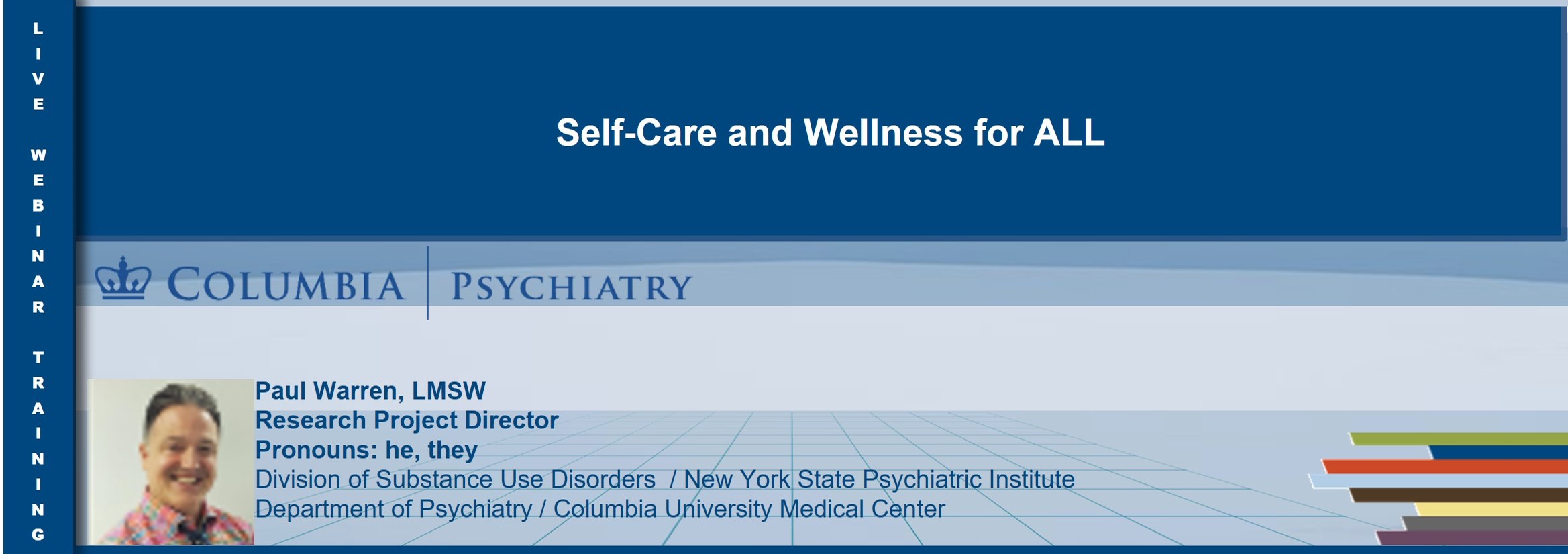
Behavioral health and health care settings offer a spectrum of programs including substance use, mental health, and medical and recovery services. Professionals providing these supports use an array of competencies to empathize and assist persons with substance use and other psychosocial problems. Always focused on helping others, professionals can experience challenges in practicing self-care for themselves. This interactive workshop provides an opportunity for providers to review wellness practices and experience the benefits of intentional, micro-structured, self-care interventions.
This training met the requirements for 2 renewal hours (CASAC, CPP, CPS) and 2 initial hours (CPP, CPS) through New York State’s Office of Addiction Services and Supports (NYS OASAS). As an IC & RC member board, OASAS accredited courses are granted reciprocal approval by the New Jersey Division of Consumer Affairs, Alcohol and Drug Counselor Committee. Many other states offered reciprocity

For more information contact: Tri at: [email protected] or Tel: (646) 774-6186
Northeast & Caribbean Addiction Technology Transfer CenterNetwork (NeC-ATTC)
1051 Riverside Drive, New York, NY 10032
Division on Substance Use Disorders | New York State Psychiatric Institute
Department of Psychiatry | Columbia University Medical Center
Disclaimer: The development of these training materials is supported by grant TI082504 (PI: M. Chaple) from the Center for Substance Abuse Treatment, Substance Abuse and Mental Health Services Administration (SAMHSA), United States Department of Health and Human Services. The contents are solely the responsibility of the Northeast and Caribbean Addiction Technology Transfer Center, and do not necessarily represent the official views of SAMHSA
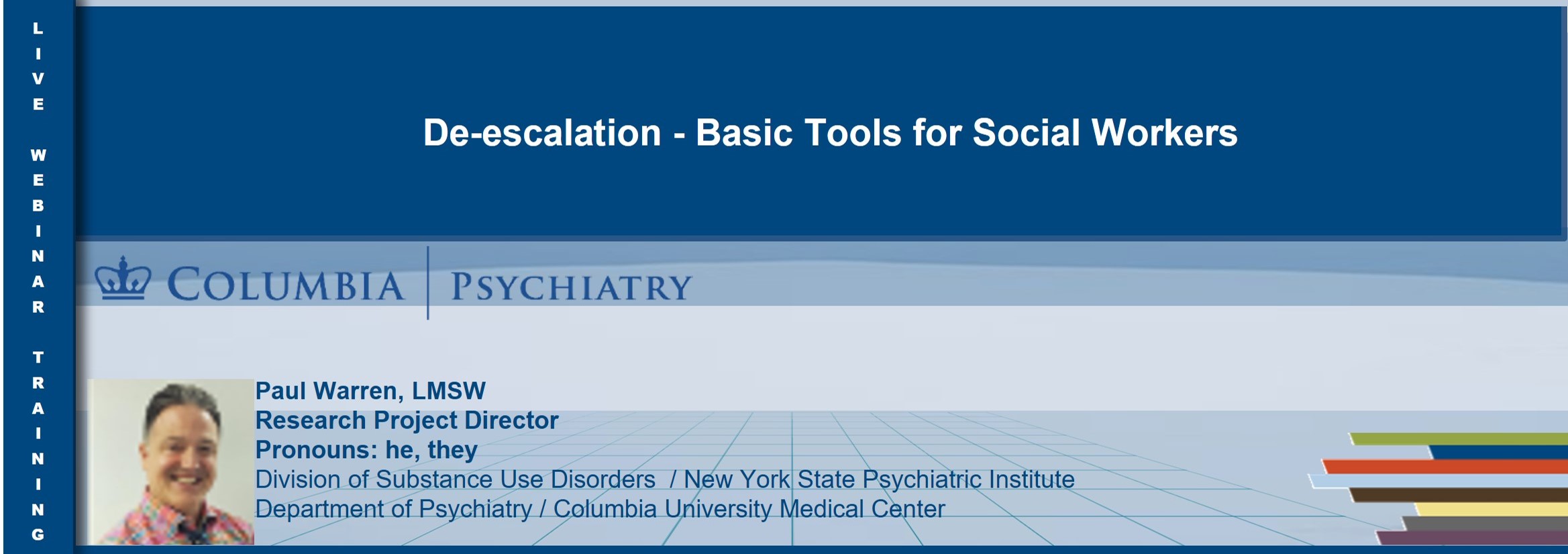
Difficult moments don’t have to grow into ‘incidents’ that can threaten client engagement and retention. This workshop is designed to equip participants with basic concepts and preparatory actions that can be used to de-escalate a wide range of interactions.
This training met the requirements for 3 renewal hours (CASAC, CPP, CPS) and 3 initial hours (CPP, CPS) through New York State’s Office of Addiction Services and Supports (NYS OASAS). As an IC & RC member board, OASAS accredited courses are granted reciprocal approval by the New Jersey Division of Consumer Affairs, Alcohol and Drug Counselor Committee. Many other states offered reciprocity

For more information contact: Tri at: [email protected] or Tel: (646) 774-6186
Northeast & Caribbean Addiction Technology Transfer CenterNetwork (NeC-ATTC)
1051 Riverside Drive, New York, NY 10032
Division on Substance Use Disorders | New York State Psychiatric Institute
Department of Psychiatry | Columbia University Medical Center
Disclaimer: The development of these training materials is supported by grant TI082504 (PI: M. Chaple) from the Center for Substance Abuse Treatment, Substance Abuse and Mental Health Services Administration (SAMHSA), United States Department of Health and Human Services. The contents are solely the responsibility of the Northeast and Caribbean Addiction Technology Transfer Center, and do not necessarily represent the official views of SAMHSA
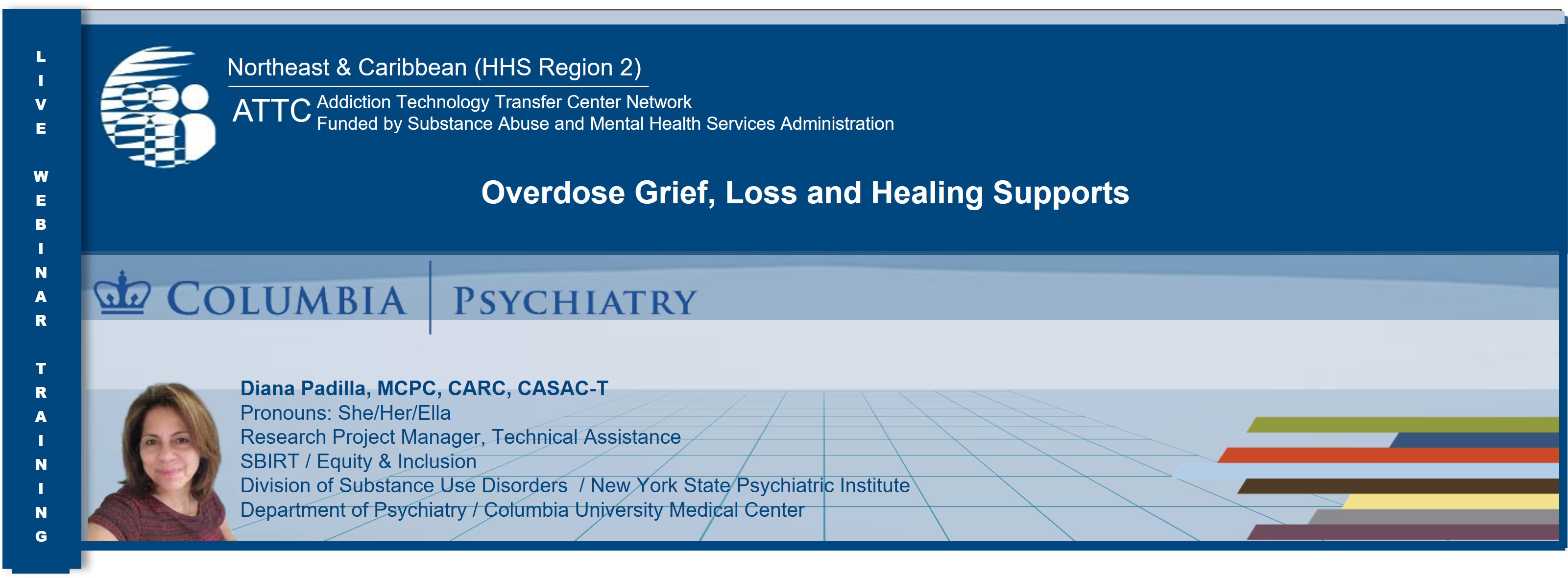
Opioid overdoses have increased by 28% between April 2020-2021. Statistics are indicating over 100,000 overdoses are occurring annually. Appropriately, funding is targeting many organizational and structural opportunities. But how do we respond to the emotional and psychological toll the overdose of a client or resident has on professional caregivers and other peers? What are the best ways to support both staff and clients in care?
This interactive session will review some of the concerns that arise when residents in recovery environments experience and don’t survive a recurrence. Content will review the behavioral, physical, and psychological responses to grief, self-care, and coping strategies. Discussion will also review overdose postvention activities that can help support those staff and other residents impacted by overdose loss.
This training met the requirements for 2 renewal hours (CASAC, CPP, CPS) and 2 initial hours (CPP, CPS) through New York State’s Office of Addiction Services and Supports (NYS OASAS). As an IC & RC member board, OASAS accredited courses are granted reciprocal approval by the New Jersey Division of Consumer Affairs, Alcohol and Drug Counselor Committee. Many othered states offered reciprocity. This course was also approved under the ASAP-NYCB Certification Board for CARC Elective & CARC/CRPA CE in addition to OASAS-approved hours.

For more information contact: Tri at: [email protected] or Tel: (646) 774-6186
Northeast & Caribbean Addiction Technology Transfer CenterNetwork (NeC-ATTC)
1051 Riverside Drive, New York, NY 10032
Division on Substance Use Disorders | New York State Psychiatric Institute
Department of Psychiatry | Columbia University Medical Center
Disclaimer: The development of these training materials is supported by grant TI082504 (PI: M. Chaple) from the Center for Substance Abuse Treatment, Substance Abuse and Mental Health Services Administration (SAMHSA), United States Department of Health and Human Services. The contents are solely the responsibility of the Northeast and Caribbean Addiction Technology Transfer Center, and do not necessarily represent the official views of SAMHSA
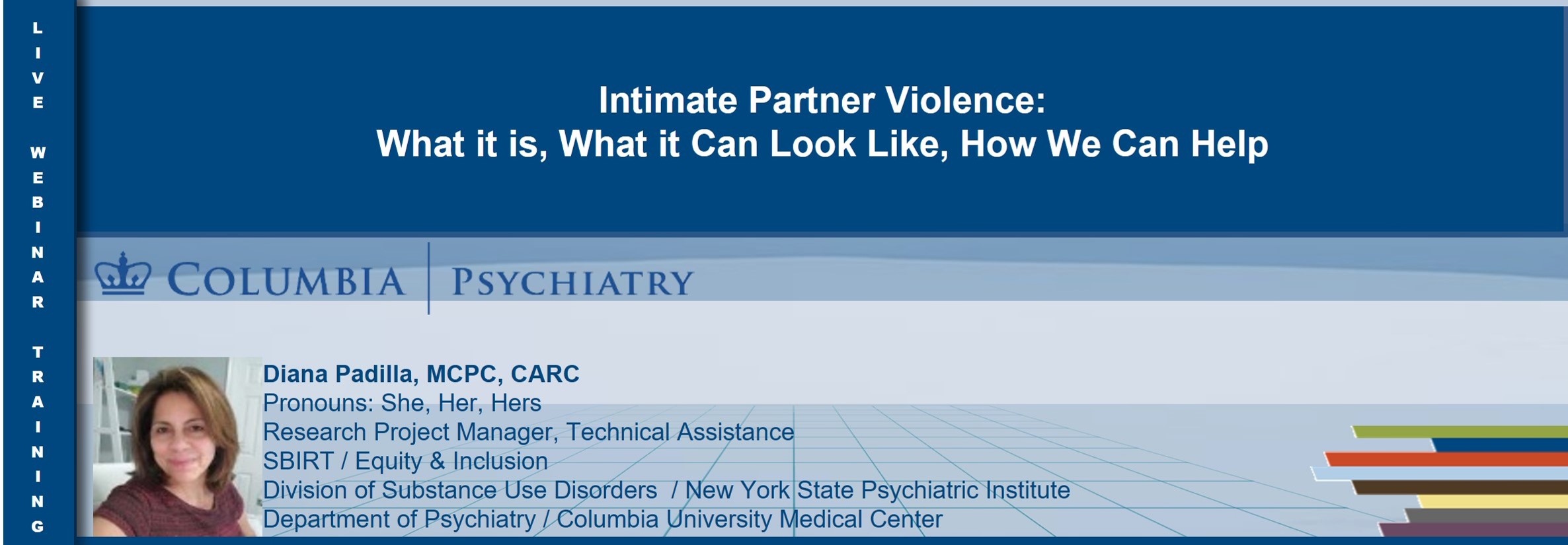
Nearly a third of all Americans have been affected by intimate partner violence (IPV) at some point in their lives. Health and behavioral health care professionals are well positioned to respond to cases of domestic violence or intimate partner violence. The trust within the provider and client/patient relationship, offers opportunity to identify and support persons who may be victimized by IPV.
This interactive webinar will review risk factors of IPV, screening tools for consideration, support strategies and resources.
This training met the requirements for 2 renewal hours (CASAC, CPP, CPS) and 2 initial hours (CPP, CPS) through New York State’s Office of Addiction Services and Supports (NYS OASAS). As an IC & RC member board, OASAS accredited courses are granted reciprocal approval by the New Jersey Division of Consumer Affairs, Alcohol and Drug Counselor Committee. Many othered states offered reciprocity. This course was also approved under the ASAP-NYCB Certification Board for CARC Elective & CARC/CRPA CE in addition to OASAS-approved hours.

For more information contact: Tri at: [email protected] or Tel: (646) 774-6186
Northeast & Caribbean Addiction Technology Transfer CenterNetwork (NeC-ATTC)
1051 Riverside Drive, New York, NY 10032
Division on Substance Use Disorders | New York State Psychiatric Institute
Department of Psychiatry | Columbia University Medical Center
Disclaimer: The development of these training materials is supported by grant TI082504 (PI: M. Chaple) from the Center for Substance Abuse Treatment, Substance Abuse and Mental Health Services Administration (SAMHSA), United States Department of Health and Human Services. The contents are solely the responsibility of the Northeast and Caribbean Addiction Technology Transfer Center, and do not necessarily represent the official views of SAMHSA
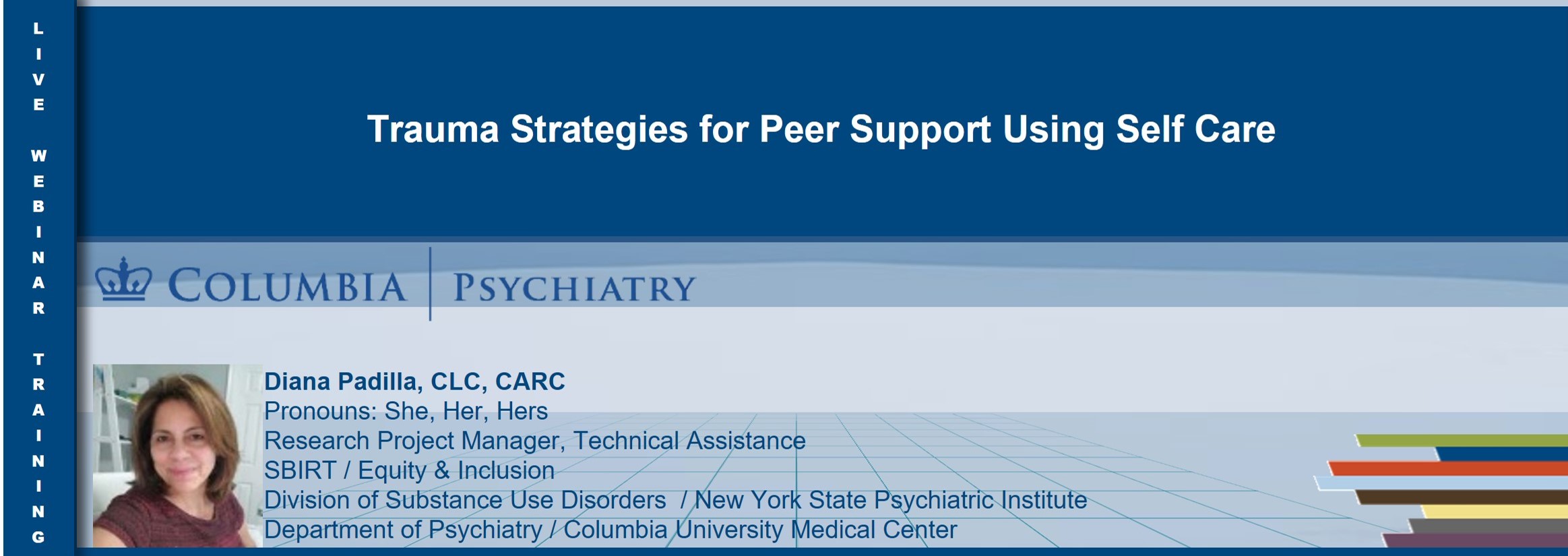
Peer professionals provide an array of recovery-oriented supports and person-centered care which include empathetic engagement with survivors of trauma circumstances. This work at times can increase the peer’s vulnerability to vicarious trauma or secondary stress. Potentially it can result in the loss of ability to objectively help others find their recovery pathways and can affect the peer’s mental and emotional well-being.
This two-hour interactive workshop will review how trauma situations may present, signs to recognize and cues alerting as to when to step away from a trauma inducing situation. Content will also offer practical strategies for self-care including ways to build resiliency.
Our trainings met the requirements for renewal hours (CASAC, CPP, CPS) and initial hours (CPP, CPS) through New York State’s Office of Addiction Services and Supports (NYS OASAS). As an IC & RC member board, OASAS accredited courses are granted reciprocal approval by the New Jersey Division of Consumer Affairs, Alcohol and Drug Counselor Committee. Many other states offered reciprocity. Trauma Strategies for Peer Support Using Self Care was also approved under the ASAP-NYCB Certification Board for CARC Elective & CARC/CRPA CE in addition to OASAS-approved hours

For more information contact: Tri at: [email protected] or Tel: (646) 774-6186
Northeast & Caribbean Addiction Technology Transfer CenterNetwork (NeC-ATTC)
1051 Riverside Drive, New York, NY 10032
Division on Substance Use Disorders | New York State Psychiatric Institute
Department of Psychiatry | Columbia University Medical Center
Disclaimer: The development of these training materials is supported by grant TI082504 (PI: M. Chaple) from the Center for Substance Abuse Treatment, Substance Abuse and Mental Health Services Administration (SAMHSA), United States Department of Health and Human Services. The contents are solely the responsibility of the Northeast and Caribbean Addiction Technology Transfer Center, and do not necessarily represent the official views of SAMHSA
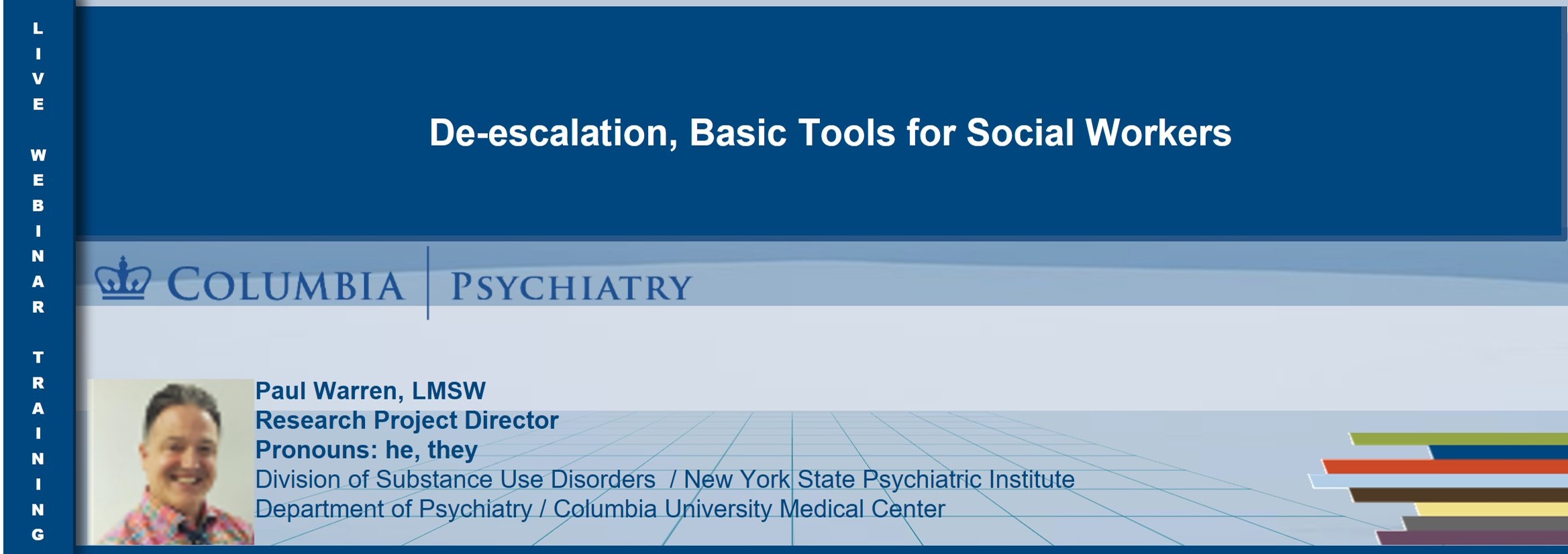
Difficult moments don’t have to grow into ‘incidents’ that can threaten client engagement and retention. This workshop is designed to equip participants with basic concepts and preparatory actions that can be used to de-escalate a wide range of interactions.
This training met the requirements for 3 renewal hours (CASAC, CPP, CPS) and 3 initial hours (CPP, CPS) through New York State’s Office of Addiction Services and Supports (NYS OASAS). As an IC & RC member board, OASAS accredited courses are granted reciprocal approval by the New Jersey Division of Consumer Affairs, Alcohol and Drug Counselor Committee. Many other states offered reciprocity.

For more information contact: Tri at: [email protected] or Tel: (646) 774-6186
Northeast & Caribbean Addiction Technology Transfer CenterNetwork (NeC-ATTC)
1051 Riverside Drive, New York, NY 10032
Division on Substance Use Disorders | New York State Psychiatric Institute
Department of Psychiatry | Columbia University Medical Center
Disclaimer: The development of these training materials is supported by grant TI082504 (PI: M. Chaple) from the Center for Substance Abuse Treatment, Substance Abuse and Mental Health Services Administration (SAMHSA), United States Department of Health and Human Services. The contents are solely the responsibility of the Northeast and Caribbean Addiction Technology Transfer Center, and do not necessarily represent the official views of SAMHSA

Racialized minority populations are disproportionately impacted by structural barriers to treatment for substance use disorder (SUD) and severe mental illness (SMI). Despite the rate of co-occurring SMI and SUD, treatment for each often remains isolated from the other. This webinar will examine the intersection between these conditions, and how structural racism uniquely affects BIPOC experiencing co-occurring disorders. Speakers will offer perspectives from clinical practice, research, and advocacy, while presenting innovative models of thinking and care delivery that aim to bridge the gap between need and access to treatment.
Educational Objectives:
a. Describe key policies and processes that underly the relationship between SUD and SMI among racialized minorities
b. Identify strategies to deliver culturally competent treatment for co-occurring disorders to racialized minorities
c. Describe specific examples of challenges faced in accessing SUD and SMI treatment for BIPOC communities
d. Provide existing and developing tools to improve the treatment of co-occurring SMI and SUD
For more information contact: Emely Santiago Sosa at: [email protected]. or Tel: (646) 774-6187
Opioid Response Network
Division on Substance Use Disorders
1051 Riverside Drive, New York, NY 10032 Division on Substance Use Disorders | New York State Psychiatric Institute Department of Psychiatry | Columbia University Medical Center
Disclaimer: Funding for this initiative was made possible (in part) by grant no. 1H79TI083343 from SAMHSA. The views expressed in written conference materials or publications and by speakers and moderators do not necessarily reflect the official policies of the Department of Health and Human Services; nor does mention of trade names, commercial practices, or organizations imply endorsement by the U.S. Government.

LGBTQIA people are much more than their sexual orientation and gender identity. This interactive webinar combines the perspectives and practices of both Cultural Humility and Motivational Interviewing, inviting participants to consider how these approaches, used in tandem, can enhance engagement and retention of LGBTQIA people.
This training met the requirements for 2 renewal hours (CASAC, CPP, CPS) and 2 initial hours (CPP, CPS) through New York State’s Office of Addiction Services and Supports (NYS OASAS). As an IC & RC member board, OASAS accredited courses are granted reciprocal approval by the New Jersey Division of Consumer Affairs, Alcohol and Drug Counselor Committee. Many other states offered reciprocity.

For more information contact: Tri at: [email protected] or Tel: (646) 774-6186
Northeast & Caribbean Addiction Technology Transfer CenterNetwork (NeC-ATTC)
1051 Riverside Drive, New York, NY 10032
Division on Substance Use Disorders | New York State Psychiatric Institute
Department of Psychiatry | Columbia University Medical Center
Disclaimer: The development of these training materials is supported by grant TI082504 (PI: M. Chaple) from the Center for Substance Abuse Treatment, Substance Abuse and Mental Health Services Administration (SAMHSA), United States Department of Health and Human Services. The contents are solely the responsibility of the Northeast and Caribbean Addiction Technology Transfer Center, and do not necessarily represent the official views of SAMHSA

Immigration status in the U.S. can significantly limit access to employment, healthcare, and social services. Among undocumented populations, stigma, discrimination, and restrictive legal processes increase risk for substance use disorders while keeping vital resources out of reach. Given the risk of family separation and penalizing nature of regulatory bodies, the needs of this population are not always understood or discussed. This webinar will discuss the nuances of the undocumented experience, from those working with these populations directly in areas of behavioral health, advocacy, research, and policymaking.
Educational Objectives:
a. Describe trends in SUD among undocumented BIPOC communities
b. Identify unique needs and risk factors of undocumented BIPOC communities in the field of substance use
c. Describe barriers to care specific to undocumented populations
d. Provide strategies and examples of preventing and addressing SUD among undocumented populations
For more information contact: Emely Santiago Sosa at: [email protected]. or Tel: (646) 774-6187
Opioid Response Network
Division on Substance Use Disorders
1051 Riverside Drive, New York, NY 10032 Division on Substance Use Disorders | New York State Psychiatric Institute Department of Psychiatry | Columbia University Medical Center
Disclaimer: Funding for this initiative was made possible (in part) by grant no. 1H79TI083343 from SAMHSA. The views expressed in written conference materials or publications and by speakers and moderators do not necessarily reflect the official policies of the Department of Health and Human Services; nor does mention of trade names, commercial practices, or organizations imply endorsement by the U.S. Government.

Motivational interviewing is an evidence-based, conversation model for evoking and enhancing intrinsic motivation to change behaviors. In this video-conversation, participants will discuss the core components of this model and practice using the skills of Motivational Interviewing, particularly in the context of substance use behavior change(s). Prior knowledge of Motivational Interviewing is not required. This learning community is open to everyone engaging in conversations about behavior change - educational degrees or credentials are also not required.
This training met the requirements for 6 renewal hours (CASAC, CPP, CPS) and 6 initial hours (CPP, CPS) through New York State’s Office of Addiction Services and Supports (NYS OASAS). As an IC & RC member board, OASAS accredited courses are granted reciprocal approval by the New Jersey Division of Consumer Affairs, Alcohol and Drug Counselor Committee. Many other states were offered reciprocity

For more information contact: Tri at: [email protected] or Tel: (646) 774-6186
Northeast & Caribbean Addiction Technology Transfer CenterNetwork (NeC-ATTC)
1051 Riverside Drive, New York, NY 10032
Division on Substance Use Disorders | New York State Psychiatric Institute
Department of Psychiatry | Columbia University Medical Center
Disclaimer: The development of these training materials is supported by grant TI082504 (PI: M. Chaple) from the Center for Substance Abuse Treatment, Substance Abuse and Mental Health Services Administration (SAMHSA), United States Department of Health and Human Services. The contents are solely the responsibility of the Northeast and Caribbean Addiction Technology Transfer Center, and do not necessarily represent the official views of SAMHSA.

SBIRT (Screening, Brief Intervention, and Referral to Treatment) is an evidence-based practice that uses a preventive public health approach to identify and intervene with persons whose pattern of use put them at risk for or are experiencing substance-related health and psychosocial problems. SBIRT can also be useful in identifying those with a high likelihood for a substance use disorder. As an effective intervention, SBIRT helps to reduce harmful levels of substance use in health and behavioral health settings.
This interactive (role plays, videos, large group activities) 6 hour, two-part webinar (three hour virtual sessions) training will provide an extensive review of validated substance use screening tools and will include skills practice focused on the brief intervention and a review of essential components of successful referrals to treatment.
NOTE: This training will also identify points of contact and other opportunities to use a cultural lens in facilitating SBIRT model without compromising the fidelity of the evidence based practice.
This training met the requirements for 6 renewal hours (CASAC, CPP, CPS) and 6 initial hours (CPP, CPS) through New York State’s Office of Addiction Services and Supports (NYS OASAS). As an IC & RC member board, OASAS accredited courses are granted reciprocal approval by the New Jersey Division of Consumer Affairs, Alcohol and Drug Counselor Committee. Many other states were offered reciprocity.

For more information contact: Tri at: [email protected] or Tel: (646) 774-6186
Northeast & Caribbean Addiction Technology Transfer CenterNetwork (NeC-ATTC)
1051 Riverside Drive, New York, NY 10032
Division on Substance Use Disorders | New York State Psychiatric Institute
Department of Psychiatry | Columbia University Medical Center
Disclaimer: The development of these training materials is supported by grant TI082504 (PI: M. Chaple) from the Center for Substance Abuse Treatment, Substance Abuse and Mental Health Services Administration (SAMHSA), United States Department of Health and Human Services. The contents are solely the responsibility of the Northeast and Caribbean Addiction Technology Transfer Center, and do not necessarily represent the official views of SAMHSA

The history of racially motivated drug policymaking in the U.S. continues to drive the disproportionate rate of incarceration and drug-related sentencing among BIPOC communities. Involvement in the carceral system alters one’s experience with addiction, access to treatment, and experience with recovery through various complex pathways. This panel discussion seeks to provide a space for honest discussion of issues surrounding these pathways and ways to facilitate more journeys to recovery. Speakers with lived experience and diverse perspectives will discuss the impact of current policies regarding SUD treatment in the carceral system, underlying factors of SUD among this population, and strategies to address determinants of health at the intersection of addiction, race and criminal justice.
Objectives:
a. Describe key policies and processes that underly the relationship
between SUD, race and incarceration
b. Identify unique needs of incarcerated BIPOC experiencing SUD
c. Describe specific examples of challenges faced in accessing SUD treatment for BIPOC who are or have been incarcerated
d. Provide strategies for improving access to treatment while incarcerated and disproportionate rates of drug-related sentencing among BIPOC communities
For more information contact: Emely Santiago Sosa at: [email protected]. or Tel: (646) 774-6187
Opioid Response Network
Division on Substance Use Disorders
1051 Riverside Drive, New York, NY 10032 Division on Substance Use Disorders | New York State Psychiatric Institute Department of Psychiatry | Columbia University Medical Center
Disclaimer: Funding for this initiative was made possible (in part) by grant no. 1H79TI083343 from SAMHSA. The views expressed in written conference materials or publications and by speakers and moderators do not necessarily reflect the official policies of the Department of Health and Human Services; nor does mention of trade names, commercial practices, or organizations imply endorsement by the U.S. Government.

Most trainings on Motivational Interviewing don't do more than convey the 'concept' of "Change Talk" as something essential to the success of this evidence-based practice. This training goes beyond concept and into action. You will learn how to evoke Change Talk and what to do with it. A prior knowledge of the CORE skills of MI (OARS) is helpful, but not required to join us.
This training met the requirements for 2 renewal hours (CASAC, CPP, CPS) and 2 initial hours (CPP, CPS) through New York State’s Office of Addiction Services and Supports (NYS OASAS). As an IC & RC member board, OASAS accredited courses were granted reciprocal approval by the New Jersey Division of Consumer Affairs, Alcohol and Drug Counselor Committee. Many other states offer reciprocity - please check with your accrediting agency.

For more information contact: Tri at: [email protected] or Tel: (646) 774-6186
Northeast & Caribbean Addiction Technology Transfer CenterNetwork (NeC-ATTC)
1051 Riverside Drive, New York, NY 10032
Division on Substance Use Disorders | New York State Psychiatric Institute
Department of Psychiatry | Columbia University Medical Center
Disclaimer: The development of these training materials is supported by grant TI082504 (PI: M. Chaple) from the Center for Substance Abuse Treatment, Substance Abuse and Mental Health Services Administration (SAMHSA), United States Department of Health and Human Services. The contents are solely the responsibility of the Northeast and Caribbean Addiction Technology Transfer Center, and do not necessarily represent the official views of SAMHSA

Access to affordable housing has significant implications for access to healthcare. The disproportionate representation of BIPOC among the homeless population in the U.S. presents unique challenges to racial equity given the existing disparities in substance use disorder treatment, and the impact of COVID-19 has disproportionately exacerbated these challenges for BIPOC experiencing SUD. This webinar will review trends at the intersection of these issues and emerging models of success, from the perspectives of providers delivering care to this population and those who have found recovery from homelessness and SUD.
Educational Objectives: a. Describe trends in homelessness and SUD among BIPOC communities prior to and during the COVID-19 pandemic b. Identify unique needs of BIPOC unhoused communities in the field of substance use c. Describe specific examples of challenges faced in BIPOC unhoused communities during COVID-19 d. Provide strategies for addressing homelessness and SUD among BIPOC communities
For more information contact: Emely Santiago Sosa at: [email protected]. or Tel: (646) 774-6187
Opioid Response Network
Division on Substance Use Disorders
1051 Riverside Drive, New York, NY 10032 Division on Substance Use Disorders | New York State Psychiatric Institute Department of Psychiatry | Columbia University Medical Center
Disclaimer: Funding for this initiative was made possible (in part) by grant no. 1H79TI083343 from SAMHSA. The views expressed in written conference materials or publications and by speakers and moderators do not necessarily reflect the official policies of the Department of Health and Human Services; nor does mention of trade names, commercial practices, or organizations imply endorsement by the U.S. Government.

The Brief Negotiated Interview is an evidence-based approach to conducting a person-centered conversation to incite behavior change. In this interactive training, the brief intervention focuses on reducing unhealthy levels of substance use or other at-risk behavior. The content is based on the brief intervention component of SBIRT (screening, brief intervention, and referral to treatment) which utilizes basic Motivational Interviewing (MI) core communication skills. This workshop will review dynamics of person centered interactions and offer practice activities to enhance provider competencies to effectively facilitate a brief intervention 'conversation' and support behavior change.
NOTE: This workshop is recommended for those who have gone through the SBIRT training who would like more time to practice the Brief Intervention communication skills.
This training met the requirements for 3 renewal hours (CASAC, CPP, CPS) and 3 initial hours (CPP, CPS) through New York State’s Office of Addiction Services and Supports (NYS OASAS). As an IC & RC member board, OASAS accredited courses are granted reciprocal approval by the New Jersey Division of Consumer Affairs, Alcohol and Drug Counselor Committee. Many other states offered reciprocity.

For more information contact: Tri at: [email protected] or Tel: (646) 774-6186
Northeast & Caribbean Addiction Technology Transfer CenterNetwork (NeC-ATTC)
1051 Riverside Drive, New York, NY 10032
Division on Substance Use Disorders | New York State Psychiatric Institute
Department of Psychiatry | Columbia University Medical Center
Disclaimer: The development of these training materials is supported by grant TI082504 (PI: M. Chaple) from the Center for Substance Abuse Treatment, Substance Abuse and Mental Health Services Administration (SAMHSA), United States Department of Health and Human Services. The contents are solely the responsibility of the Northeast and Caribbean Addiction Technology Transfer Center, and do not necessarily represent the official views of SAMHSA

Most trainings on Motivational Interviewing convey the 'concept' of "Change Talk" as essential and ignore or gloss over how to intentionally use Change Talk to build motivation for change. This practice session goes beyond concept and into action. You will learn how to evoke Change Talk and what to do with it when you hear it. A prior knowledge of the CORE skills of MI (OARS) is helpful and not required to join this Learning Community Practice Session (LCPS).
Goal: To provide tools that will help Substance Use Services providers to evoke Change Talk and opportunities to employ and strengthen Change Talk related to a specific Change Goal.
This training met the requirements for 2 renewal hours (CASAC, CPP, CPS) and 2 initial hours (CPP, CPS) through New York State’s Office of Addiction Services and Supports (NYS OASAS). As an IC & RC member board, OASAS accredited courses are granted reciprocal approval by the New Jersey Division of Consumer Affairs, Alcohol and Drug Counselor Committee. Many other states offered reciprocity.

For more information contact: Tri at: [email protected] or Tel: (646) 774-6186
Northeast & Caribbean Addiction Technology Transfer CenterNetwork (NeC-ATTC)
1051 Riverside Drive, New York, NY 10032
Division on Substance Use Disorders | New York State Psychiatric Institute
Department of Psychiatry | Columbia University Medical Center
Disclaimer: The development of these training materials is supported by grant TI082504 (PI: M. Chaple) from the Center for Substance Abuse Treatment, Substance Abuse and Mental Health Services Administration (SAMHSA), United States Department of Health and Human Services. The contents are solely the responsibility of the Northeast and Caribbean Addiction Technology Transfer Center, and do not necessarily represent the official views of SAMHSA

Despite the demands that come with a profession in the health and behavioral health care disciplines, providers are dedicated to their craft and enjoy a deep satisfaction from helping others. The other side of the job brings pressures and stress that can increase susceptibility to exhaustion leading to compassion fatigue and other occupational hazards. The consequences of compassion fatigue can decrease the provider’s emotional and physical well-being, influence the quality of care they provide for their clients, and negatively impact the interactions with coworkers and so creating an unhealthy work environment for themselves and others. The current health crisis has had a profound effect on people's ability to cope for both communities and professionals, and the need for healthy providers is critical.
This interactive webinar will identify and define often elusive work related conditions, self-assessment tools and practical strategies for self-care and building resiliency.
This training met the requirements for 2 renewal hours (CASAC, CPP, CPS) and 2 initial hours (CPP, CPS) through New York State’s Office of Addiction Services and Supports (NYS OASAS). As an IC & RC member board, OASAS accredited courses are granted reciprocal approval by the New Jersey Division of Consumer Affairs, Alcohol and Drug Counselor Committee. Many other states offered reciprocity.

For more information contact: Tri at: [email protected] or Tel: (646) 774-6186
Northeast & Caribbean Addiction Technology Transfer CenterNetwork (NeC-ATTC)
1051 Riverside Drive, New York, NY 10032
Division on Substance Use Disorders | New York State Psychiatric Institute
Department of Psychiatry | Columbia University Medical Center
Disclaimer: The development of these training materials is supported by grant TI082504 (PI: M. Chaple) from the Center for Substance Abuse Treatment, Substance Abuse and Mental Health Services Administration (SAMHSA), United States Department of Health and Human Services. The contents are solely the responsibility of the Northeast and Caribbean Addiction Technology Transfer Center, and do not necessarily represent the official views of SAMHSA

Difficult moments don’t have to grow into ‘incidents’ that can threaten client engagement and retention. This workshop is designed to equip participants with basic concepts and preparatory actions that can be used to de-escalate a wide range of interactions.
This training met the requirements for 2 renewal hours (CASAC, CPP, CPS) and 2 initial hours (CPP, CPS) through New York State’s Office of Addiction Services and Supports (NYS OASAS). As an IC & RC member board, OASAS accredited courses are granted reciprocal approval by the New Jersey Division of Consumer Affairs, Alcohol and Drug Counselor Committee. Many other states offered reciprocity.

For more information contact: Tri at: [email protected] or Tel: (646) 774-6186
Northeast & Caribbean Addiction Technology Transfer CenterNetwork (NeC-ATTC)
1051 Riverside Drive, New York, NY 10032
Division on Substance Use Disorders | New York State Psychiatric Institute
Department of Psychiatry | Columbia University Medical Center
Disclaimer: The development of these training materials is supported by grant TI082504 (PI: M. Chaple) from the Center for Substance Abuse Treatment, Substance Abuse and Mental Health Services Administration (SAMHSA), United States Department of Health and Human Services. The contents are solely the responsibility of the Northeast and Caribbean Addiction Technology Transfer Center, and do not necessarily represent the official views of SAMHSA

For decades, research data has documented poor behavioral health treatment outcomes for racial and ethnic communities. Behavioral health professionals and organizations are actively seeking to advance equity and meet the needs of diverse populations and provide quality care. The National Culturally and Linguistically Appropriate Services (CLAS) Standards (developed by the Office of Minority Health) provide a framework for organizations and individual professionals to integrate CLAS, and operational activities to become culturally responsive in care and bridge the gaps of disparities for underserved communities.
This interactive training reviewed the National CLAS Standards as an outline of actionable steps to promote responsive care and offers interactive opportunities and group work where participants can brainstorm and develop strategies that help reduce racial and ethnic disparities and advance behavioral health equity and inclusion in their settings.
This training met the requirements for 3 renewal hours (CASAC, CPP, CPS) and 3 initial hours (CPP, CPS) through New York State’s Office of Addiction Services and Supports (NYS OASAS). As an IC & RC member board, OASAS accredited courses are granted reciprocal approval by the New Jersey Division of Consumer Affairs, Alcohol and Drug Counselor Committee. Many other states offered reciprocity.

For more information contact: Tri at: [email protected] or Tel: (646) 774-6186
Northeast & Caribbean Addiction Technology Transfer CenterNetwork (NeC-ATTC)
1051 Riverside Drive, New York, NY 10032
Division on Substance Use Disorders | New York State Psychiatric Institute
Department of Psychiatry | Columbia University Medical Center
Disclaimer: The development of these training materials is supported by grant TI082504 (PI: M. Chaple) from the Center for Substance Abuse Treatment, Substance Abuse and Mental Health Services Administration (SAMHSA), United States Department of Health and Human Services. The contents are solely the responsibility of the Northeast and Caribbean Addiction Technology Transfer Center, and do not necessarily represent the official views of SAMHSA

Disparities in prevention, treatment, and recovery from substance use disorders are evident among special populations. However, substance use is often an unrecognized issue among older adults, especially among BIPOC older adults. This webinar seek to examine the scope of substance use among aging communities and describe the impact substances have on health, emotional well-being, and social relationships for aging communities. This webinar provided strategies on how providers and caretakers can support patients and clients seek treatment.
Learning Objectives: A. Understand the scope of substance use among aging communities. B. Describe the role and implications of substance use among aging communities. C. Identify unique needs of BIPOC aging communities in the field of substance use. D. Provide harm reduction & recovery strategies for supporting BIPOC aging communities that use substances
Disclaimer: Funding for this initiative was made possible (in part) by grant no. 1H79TI083343 from SAMHSA. The views expressed in written conference materials or publications and by speakers and moderators do not necessarily reflect the official policies of the Department of Health and Human Services; nor does mention of trade names, commercial practices, or organizations imply endorsement by the U.S. Government.

"What if I say the wrong thing - I don't want to offend them." Join this interactive, learning community conversation where we will explore the limitations of "cultural competence" while providing services to LGBTQIA people. The concept and practice of "Cultural Humility" offers a starting point and a path that offers respect and can build trust between providers and the LGBTQIA people they serve.
This training met the requirements for 2 renewal hours (CASAC, CPP, CPS) and 2 initial hours (CPP, CPS) through New York State’s Office of Addiction Services and Supports (NYS OASAS). As an IC & RC member board, OASAS accredited courses were granted reciprocal approval by the New Jersey Division of Consumer Affairs, Alcohol and Drug Counselor Committee. Many other states offered reciprocity.

For more information contact: Tri at: [email protected] or Tel: (646) 774-6186
Northeast & Caribbean Addiction Technology Transfer CenterNetwork (NeC-ATTC)
1051 Riverside Drive, New York, NY 10032
Division on Substance Use Disorders | New York State Psychiatric Institute
Department of Psychiatry | Columbia University Medical Center
Disclaimer: The development of these training materials is supported by grant TI082504 (PI: M. Chaple) from the Center for Substance Abuse Treatment, Substance Abuse and Mental Health Services Administration (SAMHSA), United States Department of Health and Human Services. The contents are solely the responsibility of the Northeast and Caribbean Addiction Technology Transfer Center, and do not necessarily represent the official views of SAMHSA

Nearly a third of all Americans have been affected by intimate partner violence (IPV) at some point in their lives. Health and behavioral health care professionals are well positioned to respond to cases of domestic violence or intimate partner violence. The trust within the provider and client/patient relationship, offers opportunity to identify and support persons who may be victimized by IPV.
This interactive webinar reviewed risk factors of IPV, screening tools for considerations, support strategies and resources.
This training met the requirements for 1.5 renewal hours (CASAC, CPP, CPS) and 1.5 initial hours (CPP, CPS) through New York State’s Office of Addiction Services and Supports (NYS OASAS). As an IC & RC member board, OASAS accredited courses are granted reciprocal approval by the New Jersey Division of Consumer Affairs, Alcohol and Drug Counselor Committee. Many other states offered reciprocity.

For more information contact: Tri at: [email protected] or Tel: (646) 774-6186
Northeast & Caribbean Addiction Technology Transfer CenterNetwork (NeC-ATTC)
1051 Riverside Drive, New York, NY 10032
Division on Substance Use Disorders | New York State Psychiatric Institute
Department of Psychiatry | Columbia University Medical Center
Disclaimer: The development of these training materials is supported by grant TI082504 (PI: M. Chaple) from the Center for Substance Abuse Treatment, Substance Abuse and Mental Health Services Administration (SAMHSA), United States Department of Health and Human Services. The contents are solely the responsibility of the Northeast and Caribbean Addiction Technology Transfer Center, and do not necessarily represent the official views of SAMHSA

Peer professionals provide an array of recovery-oriented supports and person-centered care which include empathetic engagement with survivors of trauma circumstances. This work at times can increase the peer’s vulnerability to vicarious trauma or secondary stress. Potentially it can result in the loss of ability to objectively help others find their recovery pathways and can affect the peer’s mental and emotional wellbeing. This two-hour interactive workshop reviewed how trauma situations may present, signs to recognize and cues alerting as to when to step away from a trauma inducing situation. Content will also offer practical strategies for self-care including ways to build resiliency.
This training met the requirements for 2 renewal hours (CASAC, CPP, CPS) and 2 initial hours (CPP, CPS) through New York State’s Office of Addiction Services and Supports (NYS OASAS). As an IC & RC member board, OASAS accredited courses are granted reciprocal approval by the New Jersey Division of Consumer Affairs, Alcohol and Drug Counselor Committee. Many other states offered reciprocity. This webinar training was also approved under the ASAP-NYCB Certification Board for CARC Elective & CARC/CRPA CE.

For more information contact: Tri at: [email protected] or Tel: (646) 774-6186
Northeast & Caribbean Addiction Technology Transfer CenterNetwork (NeC-ATTC)
1051 Riverside Drive, New York, NY 10032
Division on Substance Use Disorders | New York State Psychiatric Institute
Department of Psychiatry | Columbia University Medical Center
Disclaimer: The development of these training materials is supported by grant TI082504 (PI: M. Chaple) from the Center for Substance Abuse Treatment, Substance Abuse and Mental Health Services Administration (SAMHSA), United States Department of Health and Human Services. The contents are solely the responsibility of the Northeast and Caribbean Addiction Technology Transfer Center, and do not necessarily represent the official views of SAMHSA

Medications for Opioid Use Disorders (MOUD) are recommended for individuals with an opioid use disorder, including pregnant women. While facilitating pathways to recovery for the person with an opioid use disorder (OUD) is appropriate, it is important to consider and address the severe effects OUD has on family relationships and functioning. Children are especially vulnerable and are at an increased risk of trauma, academic challenges, or child neglect, which can disrupt healthy development. This interactive webinar defined opioid use disorder (OUD), review adverse effects of opioid use on family dynamics, and review behavioral and developmental concerns for children, including neonatal abstinence syndrome (NAS). The content also discussed medications recommended to treat OUD and inform on approaches to support healthy recovery for children and family wellness.
This training met the requirements for 2 renewal hours (CASAC, CPP, CPS) and 2 initial hours (CPP, CPS) through New York State’s Office of Addiction Services and Supports (NYS OASAS). As an IC & RC member board, OASAS accredited courses are granted reciprocal approval by the New Jersey Division of Consumer Affairs, Alcohol and Drug Counselor Committee. Many other states offered reciprocity.

For more information contact: Tri at: [email protected] or Tel: (646) 774-6186
Northeast & Caribbean Addiction Technology Transfer CenterNetwork (NeC-ATTC)
1051 Riverside Drive, New York, NY 10032
Division on Substance Use Disorders | New York State Psychiatric Institute
Department of Psychiatry | Columbia University Medical Center
Disclaimer: The development of these training materials is supported by grant TI082504 (PI: M. Chaple) from the Center for Substance Abuse Treatment, Substance Abuse and Mental Health Services Administration (SAMHSA), United States Department of Health and Human Services. The contents are solely the responsibility of the Northeast and Caribbean Addiction Technology Transfer Center, and do not necessarily represent the official views of SAMHSA

Various situations and professional perspectives are considered when helping individuals with substance use disorders. As such, counselors are guided by ethical principles based on courage, empathy, humility, and respect.
This three-hour interactive training reviewed the Canon of Ethical Principles for Credentialed Alcoholism and Substance Abuse Counselors (CASAC). Topics included definitions, principles, and questions emerging from challenging situations. Content further discussed the concept of, “do no harm,” and implications for practice.

For more information contact: Tri at: [email protected] or Tel: (646) 774-6186
Northeast & Caribbean Addiction Technology Transfer CenterNetwork (NeC-ATTC)
1051 Riverside Drive, New York, NY 10032
Division on Substance Use Disorders | New York State Psychiatric Institute
Department of Psychiatry | Columbia University Medical Center
Disclaimer: The development of these training materials is supported by grant TI082504 (PI: M. Chaple) from the Center for Substance Abuse Treatment, Substance Abuse and Mental Health Services Administration (SAMHSA), United States Department of Health and Human Services. The contents are solely the responsibility of the Northeast and Caribbean Addiction Technology Transfer Center, and do not necessarily represent the official views of SAMHSA

Difficult moments don’t have to grow into ‘incidents’ that can threaten client engagement and retention. This workshop is designed to equip participants with basic concepts and preparatory actions that can be used to de-escalate a wide range of interactions.
This training met the requirements for 2 renewal hours (CASAC, CPP, CPS) and 2 initial hours (CPP, CPS) through New York State’s Office of Addiction Services and Supports (NYS OASAS). As an IC & RC member board, OASAS accredited courses are granted reciprocal approval by the New Jersey Division of Consumer Affairs, Alcohol and Drug Counselor Committee. Many other states offered reciprocity.

For more information contact: Tri at: [email protected] or Tel: (646) 774-6186
Northeast & Caribbean Addiction Technology Transfer CenterNetwork (NeC-ATTC)
1051 Riverside Drive, New York, NY 10032
Division on Substance Use Disorders | New York State Psychiatric Institute
Department of Psychiatry | Columbia University Medical Center
Disclaimer: The development of these training materials is supported by grant TI082504 (PI: M. Chaple) from the Center for Substance Abuse Treatment, Substance Abuse and Mental Health Services Administration (SAMHSA), United States Department of Health and Human Services. The contents are solely the responsibility of the Northeast and Caribbean Addiction Technology Transfer Center, and do not necessarily represent the official views of SAMHSA

Opioid overdoses have increased by 28% between April 2020-2021. Statistics are indicating over 100,000 overdoses are occurring annually. Appropriately, funding is appropriately targeting many organizational and structural prevention opportunities. But how do we respond to the emotional and psychological toll the overdose of a client or resident has on professionals and peers? What are the best ways to support both staff and clients?
This interactive session reviewed some of the main issues that arise when residents in recovery environments experience and don’t survive a recurrence. Content reviewed the behavioral, physical, and psychological responses to grief, self-care and coping strategies. Discussion had also reviewed overdose postvention activities that can help support those staff and other residents impacted by overdose loss.
Goal: Participants considered the effects and impacts an overdose can have on other clients, residents, and staff; and develop supportive responses and opportunities for healing
Objectives:
This training met the requirements for 1.5 renewal hours (CASAC, CPP, CPS) and 1.5 initial hours (CPP, CPS) through New York State’s Office of Addiction Services and Supports (NYS OASAS). As an IC & RC member board, OASAS accredited courses are granted reciprocal approval by the New Jersey Division of Consumer Affairs, Alcohol and Drug Counselor Committee. Many other states offered reciprocity.

For more information contact: Tri at: [email protected] or Tel: (646) 774-6186
Northeast & Caribbean Addiction Technology Transfer CenterNetwork (NeC-ATTC)
1051 Riverside Drive, New York, NY 10032
Division on Substance Use Disorders | New York State Psychiatric Institute
Department of Psychiatry | Columbia University Medical Center
Disclaimer: The development of these training materials is supported by grant TI082504 (PI: M. Chaple) from the Center for Substance Abuse Treatment, Substance Abuse and Mental Health Services Administration (SAMHSA), United States Department of Health and Human Services. The contents are solely the responsibility of the Northeast and Caribbean Addiction Technology Transfer Center, and do not necessarily represent the official views of SAMHSA

"What if I say the wrong the wrong thing - I don't want to offend them." Join this interactive, learning community conversation where we will explore the limitations of "cultural competence" while providing services to LGBTQIA people. The concept and practice of "Cultural Humility" offers a starting point and a path that offers respect and can build trust between providers and the LGBtQIA people they serve.
This training met the requirements for 2 renewal hours (CASAC, CPP, CPS) and 2 initial hours (CPP, CPS) through New York State’s Office of Addiction Services and Supports (NYS OASAS). As an IC & RC member board, OASAS accredited courses were granted reciprocal approval by the New Jersey Division of Consumer Affairs, Alcohol and Drug Counselor Committee. Many other states offered reciprocity.

For more information contact: Tri at: [email protected] or Tel: (646) 774-6186
Northeast & Caribbean Addiction Technology Transfer CenterNetwork (NeC-ATTC)
1051 Riverside Drive, New York, NY 10032
Division on Substance Use Disorders | New York State Psychiatric Institute
Department of Psychiatry | Columbia University Medical Center
Disclaimer: The development of these training materials is supported by grant TI082504 (PI: M. Chaple) from the Center for Substance Abuse Treatment, Substance Abuse and Mental Health Services Administration (SAMHSA), United States Department of Health and Human Services. The contents are solely the responsibility of the Northeast and Caribbean Addiction Technology Transfer Center, and do not necessarily represent the official views of SAMHSA

This learning community conversation is for service providers facing ethical dilemmas in our technology and social media world. The training reflects on ethics, use of social networking websites by providers, and clients, conducting internet searches, and providing services online. This training will also explore self-disclosure and self-disclosures in the age of the internet, privacy and security, and ethical reasoning.
This training met the requirements for 2 renewal hours (CASAC, CPP, CPS) and 2 initial hours (CPP, CPS) through New York State’s Office of Addiction Services and Supports (NYS OASAS). As an IC & RC member board, OASAS accredited courses are granted reciprocal approval by the New Jersey Division of Consumer Affairs, Alcohol and Drug Counselor Committee. Many other states offered reciprocity.

For more information contact: Tri at: [email protected] or Tel: (646) 774-6186
Northeast & Caribbean Addiction Technology Transfer CenterNetwork (NeC-ATTC)
1051 Riverside Drive, New York, NY 10032
Division on Substance Use Disorders | New York State Psychiatric Institute
Department of Psychiatry | Columbia University Medical Center
Disclaimer: The development of these training materials is supported by grant TI082504 (PI: M. Chaple) from the Center for Substance Abuse Treatment, Substance Abuse and Mental Health Services Administration (SAMHSA), United States Department of Health and Human Services. The contents are solely the responsibility of the Northeast and Caribbean Addiction Technology Transfer Center, and do not necessarily represent the official views of SAMHSA

Disparities in prevention, treatment, and recovery from substance use disorders are evident among special populations. While there has been an increase in attention placed in addressing these disparities, there is still much unknown about communities impacted by intersectionality, such as Black, Indigenous, and people of color (BIPOC) and LGBTQ+ communities. This webinar seeks to examine the stigma, setbacks, and successes that members of the BIPOC and LGBTQ+ community encounter in their individual experiences with substance use disorders. This webinar will also review how providers and others in the substance use field can support their own patients and clients with these identities in accessing equitable care.
Learning Objectives: A. Describe key terms for working with the population, such as intersectionality, BIPOC, LGBTQ+, sexual diversity, and others B. Identify unique needs of BIPOC LGBTQ+ community in the field of substance use C. Describe specific examples of challenges faced in BIPOC LGBTQ+ substance use. D. Provide strategies for supporting BIPOC patients/clients who identify as LGBTQ+
Disclaimer: Funding for this initiative was made possible (in part) by grant no. 1H79TI083343 from SAMHSA. The views expressed in written conference materials or publications and by speakers and moderators do not necessarily reflect the official policies of the Department of Health and Human Services; nor does mention of trade names, commercial practices, or organizations imply endorsement by the U.S. Government

Professional boundaries set the parameters of effective and appropriate interaction between professionals and the people they serve. Boundaries protect clients and patients as well as providers. This interactive course will discuss professionalism and ethics, dual relationships, and how to build a safe working environment.
This training met the requirements for 2 renewal hours (CASAC, CPP, CPS) and 2 initial hours (CPP, CPS) through New York State’s Office of Addiction Services and Supports (NYS OASAS). As an IC & RC member board, OASAS accredited courses are granted reciprocal approval by the New Jersey Division of Consumer Affairs, Alcohol and Drug Counselor Committee. Many other states offered reciprocity.
 For more information contact: Tri at: [email protected] or Tel: (646) 774-6186
For more information contact: Tri at: [email protected] or Tel: (646) 774-6186
Northeast & Caribbean Addiction Technology Transfer CenterNetwork (NeC-ATTC)
1051 Riverside Drive, New York, NY 10032
Division on Substance Use Disorders | New York State Psychiatric Institute
Department of Psychiatry | Columbia University Medical Center
Disclaimer: The development of these training materials is supported by grant TI082504 (PI: M. Chaple) from the Center for Substance Abuse Treatment, Substance Abuse and Mental Health Services Administration (SAMHSA), United States Department of Health and Human Services. The contents are solely the responsibility of the Northeast and Caribbean Addiction Technology Transfer Center, and do not necessarily represent the official views of SAMHSA

Difficult moments don’t have to grow into ‘incidents’ that can threaten client engagement and retention. This workshop is designed to equip participants with basic concepts and preparatory actions that can be used to de-escalate a wide range of interactions.
This training met the requirements for 2 renewal hours (CASAC, CPP, CPS) and 2 initial hours (CPP, CPS) through New York State’s Office of Addiction Services and Supports (NYS OASAS). As an IC & RC member board, OASAS accredited courses are granted reciprocal approval by the New Jersey Division of Consumer Affairs, Alcohol and Drug Counselor Committee. Many other states offered reciprocity.
 For more information contact: Tri at: [email protected] or Tel: (646) 774-6186
For more information contact: Tri at: [email protected] or Tel: (646) 774-6186
Northeast & Caribbean Addiction Technology Transfer CenterNetwork (NeC-ATTC)
1051 Riverside Drive, New York, NY 10032
Division on Substance Use Disorders | New York State Psychiatric Institute
Department of Psychiatry | Columbia University Medical Center
Disclaimer: The development of these training materials is supported by grant TI082504 (PI: M. Chaple) from the Center for Substance Abuse Treatment, Substance Abuse and Mental Health Services Administration (SAMHSA), United States Department of Health and Human Services. The contents are solely the responsibility of the Northeast and Caribbean Addiction Technology Transfer Center, and do not necessarily represent the official views of SAMHSA

This practical and interactive learning community conversation provides guidance for preparing for and maximizing the impact of on-line supervision. All supervisors are welcome. This conversation assumes prior supervisory training and/or experience.
This training met the requirements for 2 renewal hours (CASAC, CPP, CPS) and 2 initial hours (CPP, CPS) through New York State’s Office of Addiction Services and Supports (NYS OASAS). As an IC & RC member board, OASAS accredited courses are granted reciprocal approval by the New Jersey Division of Consumer Affairs, Alcohol and Drug Counselor Committee. Many other states offered reciprocity.
 For more information contact: Tri at: [email protected] or Tel: (646) 774-6186
For more information contact: Tri at: [email protected] or Tel: (646) 774-6186
Northeast & Caribbean Addiction Technology Transfer CenterNetwork (NeC-ATTC)
1051 Riverside Drive, New York, NY 10032
Division on Substance Use Disorders | New York State Psychiatric Institute
Department of Psychiatry | Columbia University Medical Center
Disclaimer: The development of these training materials is supported by grant TI082504 (PI: M. Chaple) from the Center for Substance Abuse Treatment, Substance Abuse and Mental Health Services Administration (SAMHSA), United States Department of Health and Human Services. The contents are solely the responsibility of the Northeast and Caribbean Addiction Technology Transfer Center, and do not necessarily represent the official views of SAMHSA

"What if I say the wrong the wrong thing - I don't want to offend them." Join this interactive, learning community conversation where we will explore the limitations of "cultural competence" while providing services to LGBTQIA people. The concept and practice of "Cultural Humility" offers a starting point and a path that offers respect and can build trust between providers and the LGBtQIA people they serve.
This training met the requirements for 2 renewal hours (CASAC, CPP, CPS) and 2 initial hours (CPP, CPS) through New York State’s Office of Addiction Services and Supports (NYS OASAS). As an IC & RC member board, OASAS accredited courses were granted reciprocal approval by the New Jersey Division of Consumer Affairs, Alcohol and Drug Counselor Committee. Many other states offered reciprocity.
 For more information contact: Tri at: [email protected] or Tel: (646) 774-6186
For more information contact: Tri at: [email protected] or Tel: (646) 774-6186
Northeast & Caribbean Addiction Technology Transfer CenterNetwork (NeC-ATTC)
1051 Riverside Drive, New York, NY 10032
Division on Substance Use Disorders | New York State Psychiatric Institute
Department of Psychiatry | Columbia University Medical Center
Disclaimer: The development of these training materials is supported by grant TI082504 (PI: M. Chaple) from the Center for Substance Abuse Treatment, Substance Abuse and Mental Health Services Administration (SAMHSA), United States Department of Health and Human Services. The contents are solely the responsibility of the Northeast and Caribbean Addiction Technology Transfer Center, and do not necessarily represent the official views of SAMHSA

Peer professionals provide an array of recovery-oriented supports and person-centered care which include empathetic engagement with survivors of trauma circumstances. This work at times can increase the peer’s vulnerability to vicarious trauma or secondary stress. Potentially it can result in the loss of ability to objectively help others find their recovery pathways and can affect the peer’s mental and emotional wellbeing.
This two-hour interactive workshop reviewed how trauma situations may present, signs to recognize and cues alerting as to when to step away from a trauma inducing situation. Content also offered practical strategies for self-care including ways to build resiliency.
This training meets the requirements for 2 renewal hours (CASAC, CPP, CPS) and 2 initial hours (CPP, CPS) through New York State’s Office of Addiction Services and Supports (NYS OASAS). As an IC & RC member board, OASAS accredited courses were granted reciprocal approval by the New Jersey Division of Consumer Affairs, Alcohol and Drug Counselor Committee. Many other states offered reciprocity. This webinar training was also approved under the ASAP-NYCB Certification Board for CARC Elective & CARC/CRPA CE.
 For more information contact: Tri at: [email protected] or Tel: (646) 774-6186
For more information contact: Tri at: [email protected] or Tel: (646) 774-6186
Northeast & Caribbean Addiction Technology Transfer CenterNetwork (NeC-ATTC)
1051 Riverside Drive, New York, NY 10032
Division on Substance Use Disorders | New York State Psychiatric Institute
Department of Psychiatry | Columbia University Medical Center
Disclaimer: The development of these training materials is supported by grant TI082504 (PI: M. Chaple) from the Center for Substance Abuse Treatment, Substance Abuse and Mental Health Services Administration (SAMHSA), United States Department of Health and Human Services. The contents are solely the responsibility of the Northeast and Caribbean Addiction Technology Transfer Center, and do not necessarily represent the official views of SAMHSA

Nearly a third of all Americans have been affected by intimate partner violence (IPV) at some point in their lives. Health and behavioral health care professionals are well positioned to respond to cases of domestic violence or intimate partner violence. The trust within the provider and client/patient relationship offers opportunity to identify and support persons who may be victimized by IPV. This interactive webinar reviewed risk factors of IPV, screening tools for consideration, support strategies and resources.
This training met the requirements for 2 renewal hours (CASAC, CPP, CPS) and 2 initial hours (CPP, CPS) through New York State’s Office of Addiction Services and Supports (NYS OASAS). As an IC & RC member board, OASAS accredited courses were granted reciprocal approval by the New Jersey Division of Consumer Affairs, Alcohol and Drug Counselor Committee. Many other states offered reciprocity.
 For more information contact: Tri at: [email protected] or Tel: (646) 774-6186
For more information contact: Tri at: [email protected] or Tel: (646) 774-6186
Northeast & Caribbean Addiction Technology Transfer CenterNetwork (NeC-ATTC)
1051 Riverside Drive, New York, NY 10032
Division on Substance Use Disorders | New York State Psychiatric Institute
Department of Psychiatry | Columbia University Medical Center
Disclaimer: The development of these training materials is supported by grant TI082504 (PI: M. Chaple) from the Center for Substance Abuse Treatment, Substance Abuse and Mental Health Services Administration (SAMHSA), United States Department of Health and Human Services. The contents are solely the responsibility of the Northeast and Caribbean Addiction Technology Transfer Center, and do not necessarily represent the official views of SAMHSA

When working with Hispanic and Latino populations, clear language should never be a linear process, particularly for a collectivist society that defines and interprets experiences within a cultural context. Latino values such as ‘machismo and personalismo’ can be very insightful, but when defined and understood through an American perspective, we wonder why we feel a ‘disconnect’ with the Hispanic client/patient we need to provide prevention services to. This interactive presentation informed on Latino cultural nuances that can reframe communication for Hispanic individuals with substance use and/or mental health problems and discussed prevention strategies to support “recuperación” (recovery).
This training met the requirements for 2 renewal hours (CASAC, CPP, CPS) and 2 initial hours (CPP, CPS) through New York State’s Office of Addiction Services and Supports (NYS OASAS). As an IC & RC member board, OASAS accredited courses were granted reciprocal approval by the New Jersey Division of Consumer Affairs, Alcohol and Drug Counselor Committee. Many other states offered reciprocity. For more information contact: Tri at: [email protected] or Tel: (646) 774-6186
For more information contact: Tri at: [email protected] or Tel: (646) 774-6186
Northeast & Caribbean Addiction Technology Transfer CenterNetwork (NeC-ATTC)
1051 Riverside Drive, New York, NY 10032
Division on Substance Use Disorders | New York State Psychiatric Institute
Department of Psychiatry | Columbia University Medical Center
Disclaimer: The development of these training materials is supported by grant TI082504 (PI: M. Chaple) from the Center for Substance Abuse Treatment, Substance Abuse and Mental Health Services Administration (SAMHSA), United States Department of Health and Human Services. The contents are solely the responsibility of the Northeast and Caribbean Addiction Technology Transfer Center, and do not necessarily represent the official views of SAMHSA

The National Alliance on Mental Illness recognizes that current environmental factors are traumatizing people of color, which as a risk factor can also initiate or increase stress and substance use. Provider bias in stigmatic language or other microaggressions can also affect a client’s capacity to respond to clinical services and are often identified in research, as components of poor behavioral health outcomes.
Culturally responsive organizations integrate cultural humility in all levels of practice and service delivery, providing highest levels of patient centered care and building equity with persons of color and other marginalized communities. This interactive virtual training reviewed how to integrate cultural humility within care, review culturally and linguistically appropriate services for organizational capacity building opportunities, and demonstrated how culturally informed care increases patient wellness for racial and ethnic populations.
This training met the requirements for 2 renewal hours (CASAC, CPP, CPS) and 2 initial hours (CPP, CPS) through New York State’s Office of Addiction Services and Supports (NYS OASAS) and is also approved for 2 Peer CPRA/CARC certification hours. As an IC & RC member board, OASAS accredited courses were granted reciprocal approval by the New Jersey Division of Consumer Affairs, Alcohol and Drug Counselor Committee. Many other states offered reciprocity.
 For more information contact: Tri at: [email protected] or Tel: (646) 774-6186
For more information contact: Tri at: [email protected] or Tel: (646) 774-6186
Northeast & Caribbean Addiction Technology Transfer CenterNetwork (NeC-ATTC)
1051 Riverside Drive, New York, NY 10032
Division on Substance Use Disorders | New York State Psychiatric Institute
Department of Psychiatry | Columbia University Medical Center
Disclaimer: The development of these training materials is supported by grant TI082504 (PI: M. Chaple) from the Center for Substance Abuse Treatment, Substance Abuse and Mental Health Services Administration (SAMHSA), United States Department of Health and Human Services. The contents are solely the responsibility of the Northeast and Caribbean Addiction Technology Transfer Center, and do not necessarily represent the official views of SAMHSA

Research suggests that race and ethnicity are predictors of how services are delivered, and implicit bias is one component that has been identified as influencing the provision of poor care. The elusiveness of unconscious bias underscores provider perception, unwitting use of stigmatic language, and influences assumptions and microaggressions affecting a person's capacity to respond to care.
This interactive two-hour training discussed how cognitive bias develops, is sustained by intrinsic and environmental factors, and contributes to inequitable outcomes for persons of color. The content also informed on bias reducing techniques and person-first language approaches that can enhance provider-client interactions and outcomes for marginalized communities.
This training met the requirements for 2 renewal hours (CASAC, CPP, CPS) and 2 initial hours (CPP, CPS) through New York State’s Office of Addiction Services and Supports (NYS OASAS) and is also approved for 2 Peer CPRA/CARC certification hours. As an IC & RC member board, OASAS accredited courses were granted reciprocal approval by the New Jersey Division of Consumer Affairs, Alcohol and Drug Counselor Committee. Many other states offered reciprocity.
 For more information contact: Tri at: [email protected] or Tel: (646) 774-6186
For more information contact: Tri at: [email protected] or Tel: (646) 774-6186
Northeast & Caribbean Addiction Technology Transfer CenterNetwork (NeC-ATTC)
1051 Riverside Drive, New York, NY 10032
Division on Substance Use Disorders | New York State Psychiatric Institute
Department of Psychiatry | Columbia University Medical Center
Disclaimer: The development of these training materials is supported by grant TI082504 (PI: M. Chaple) from the Center for Substance Abuse Treatment, Substance Abuse and Mental Health Services Administration (SAMHSA), United States Department of Health and Human Services. The contents are solely the responsibility of the Northeast and Caribbean Addiction Technology Transfer Center, and do not necessarily represent the official views of SAMHSA
This session identified and described effective behavioral treatment interventions and considerations when providing services to people with a stimulant use disorder. The content included a discussion on stigma free language, physical exercise and other recovery supports that assist in potential long-term healing.
This session met the requirements for 2 renewal hours (CASAC, CPP, CPS) and 2 initial hours (CPP, CPS) through New York State’s Office of Addiction Services and Supports (NYS OASAS). As an IC & RC member board, OASAS accredited courses were granted reciprocal approval by the New Jersey Division of Consumer Affairs, Alcohol and Drug Counselor Committee. Many other states offered reciprocity.
 For more information contact: Tri at: [email protected] or Tel: (646) 774-6186
For more information contact: Tri at: [email protected] or Tel: (646) 774-6186
Northeast & Caribbean Addiction Technology Transfer CenterNetwork (NeC-ATTC)
1051 Riverside Drive, New York, NY 10032
Division on Substance Use Disorders | New York State Psychiatric Institute
Department of Psychiatry | Columbia University Medical Center
Disclaimer: The development of these training materials is supported by grant TI082504 (PI: M. Chaple) from the Center for Substance Abuse Treatment, Substance Abuse and Mental Health Services Administration (SAMHSA), United States Department of Health and Human Services. The contents are solely the responsibility of the Northeast and Caribbean Addiction Technology Transfer Center, and do not necessarily represent the official views of SAMHSA
This sessio reviewed the fundamentals of neurobiology as it applies to cocaine and methamphetamine use. Reviewed of the effects of acute and chronic stimulant use can help providers understand the potential impact on a person’s cognitive and memory functions and inform on conducive approaches for engagement and potential recovery pathways.
This session met the requirements for 2 renewal hours (CASAC, CPP, CPS) and 2 initial hours (CPP, CPS) through New York State’s Office of Addiction Services and Supports (NYS OASAS). As an IC & RC member board, OASAS accredited courses were granted reciprocal approval by the New Jersey Division of Consumer Affairs, Alcohol and Drug Counselor Committee. Many other states offered reciprocity.
 For more information contact: Tri at: [email protected] or Tel: (646) 774-6186
For more information contact: Tri at: [email protected] or Tel: (646) 774-6186
Northeast & Caribbean Addiction Technology Transfer CenterNetwork (NeC-ATTC)
1051 Riverside Drive, New York, NY 10032
Division on Substance Use Disorders | New York State Psychiatric Institute
Department of Psychiatry | Columbia University Medical Center
Disclaimer: The development of these training materials is supported by grant TI082504 (PI: M. Chaple) from the Center for Substance Abuse Treatment, Substance Abuse and Mental Health Services Administration (SAMHSA), United States Department of Health and Human Services. The contents are solely the responsibility of the Northeast and Caribbean Addiction Technology Transfer Center, and do not necessarily represent the official views of SAMHSA
This virtual session provided an epidemiological review of cocaine and methamphetamine, and other prescribed stimulants. The content reviewed the mental and physical health impact of stimulant use, prevalence rates, communities impacted and medical consequences of use such as HIV.
This session met the requirements for 2 renewal hours (CASAC, CPP, CPS) and 2 initial hours (CPP, CPS) through New York State’s Office of Addiction Services and Supports (NYS OASAS). As an IC & RC member board, OASAS accredited courses were granted reciprocal approval by the New Jersey Division of Consumer Affairs, Alcohol and Drug Counselor Committee. Many other states offered reciprocity.
 For more information contact: Tri at: [email protected] or Tel: (646) 774-6186
For more information contact: Tri at: [email protected] or Tel: (646) 774-6186
Northeast & Caribbean Addiction Technology Transfer CenterNetwork (NeC-ATTC)
1051 Riverside Drive, New York, NY 10032
Division on Substance Use Disorders | New York State Psychiatric Institute
Department of Psychiatry | Columbia University Medical Center
Disclaimer: The development of these training materials is supported by grant TI082504 (PI: M. Chaple) from the Center for Substance Abuse Treatment, Substance Abuse and Mental Health Services Administration (SAMHSA), United States Department of Health and Human Services. The contents are solely the responsibility of the Northeast and Caribbean Addiction Technology Transfer Center, and do not necessarily represent the official views of SAMHSA

A major focus in behavioral health care is the reduction of stigma to help bridge the gap in access to quality care for marginalized communities. Supportive and motivating language is essential for engaging persons in care who are already burdened with dealing with the challenges that come from substance use disorders, mental illness, physical disabilities and more.
This interactive webinar provided a review and practice skills on the use of person-first language (aligns with person centered care), as an effective means of enhancing the provider-client communication and reducing bias perspectives with racial and ethnic populations, persons with disabilities and other underserved communities.
This (2-hour) training was provided under New York State Office of Addiction Services and Supports (OASAS) Education and Training. Provider Certification Number (115) Training under a New York State OASAS Provider Certification is acceptable for meeting all or part of the CASAC/CPP/CPS education and training requirements.
 For more information contact: Tri at: [email protected] or Tel: (646) 774-6186
For more information contact: Tri at: [email protected] or Tel: (646) 774-6186
Northeast & Caribbean Addiction Technology Transfer Center (NeC-ATTC)
1051 Riverside Drive, New York, NY 10032
Division on Substance Use Disorders | New York State Psychiatric Institute
Department of Psychiatry | Columbia University Medical Center
Disclaimer: The development of these training materials is supported by grant TI082504 (PI: M. Chaple) from the Center for Substance Abuse Treatment, Substance Abuse and Mental Health Services Administration (SAMHSA), United States Department of Health and Human Services. The contents are solely the responsibility of the Northeast and Caribbean Addiction Technology Transfer Center, and do not necessarily represent the official views of SAMHSA

Nearly a third of all Americans have been affected by intimate partner violence (IPV) at some point in their lives. Health and behavioral health care professionals are well positioned to respond to cases of domestic violence or intimate partner violence. The trust within the provider and client/patient relationship, offers opportunity to identify and support persons who may be victimized by IPV. This interactive webinar will review risk factors of IPV, screening tools for considerations, support strategies and resources.
This (2-hour) training was provided under New York State Office of Addiction Services and Supports (OASAS) Education and Training. Provider Certification Number (115) Training under a New York State OASAS Provider Certification is acceptable for meeting all or part of the CASAC/CPP/CPS education and training requirements.
 For more information contact: Tri at: [email protected] or Tel: (646) 774-6186
For more information contact: Tri at: [email protected] or Tel: (646) 774-6186
Northeast & Caribbean Addiction Technology Transfer Center (NeC-ATTC)
1051 Riverside Drive, New York, NY 10032
Division on Substance Use Disorders | New York State Psychiatric Institute
Department of Psychiatry | Columbia University Medical Center
Disclaimer: The development of these training materials is supported by grant TI082504 (PI: M. Chaple) from the Center for Substance Abuse Treatment, Substance Abuse and Mental Health Services Administration (SAMHSA), United States Department of Health and Human Services. The contents are solely the responsibility of the Northeast and Caribbean Addiction Technology Transfer Center, and do not necessarily represent the official views of SAMHSA

With the dramatic increases in overdose deaths during the pandemic, and while practitioners and programs are encouraged to increase access to medications for opioid or alcohol use disorders, (MOUD, MAUD), explaining the effective intervention to communities in need has been identified as one of the major challenges of behavioral health.
This interactive virtual training reviewed the impact of chronic opioid use, cognitive impairment, compulsivity factors, and physical dependence for OUD and AUD. Content will discuss myths associated with medications used to treat OUD and a review of available and effective interventions. The content used experiential activities that help participants integrate a public health approach to effectively explain MOUD to clients and their families.
This (3-hour) training was provided under New York State Office of Addiction Services and Supports (OASAS) Education and Training. Provider Certification Number (115) Training under a New York State OASAS Provider Certification is acceptable for meeting all or part of the CASAC/CPP/CPS education and training requirements.
 For more information contact: Tri at: [email protected] or Tel: (646) 774-6186
For more information contact: Tri at: [email protected] or Tel: (646) 774-6186
Northeast & Caribbean Addiction Technology Transfer Center (NeC-ATTC)
1051 Riverside Drive, New York, NY 10032
Division on Substance Use Disorders | New York State Psychiatric Institute
Department of Psychiatry | Columbia University Medical Center
Disclaimer: The development of these training materials is supported by grant TI082504 (PI: M. Chaple) from the Center for Substance Abuse Treatment, Substance Abuse and Mental Health Services Administration (SAMHSA), United States Department of Health and Human Services. The contents are solely the responsibility of the Northeast and Caribbean Addiction Technology Transfer Center, and do not necessarily represent the official views of SAMHSA

Suicide is a significant public health issue in New York State and across the country. U.S. deaths from drug overdoses leapt nearly 30% to more than 93,000 in 2020, the highest ever recorded. But how do we respond to the emotional and psychological toll the suicide or overdose of a client has on professional caregivers? What are the best ways to support both staff and clients?
This interactive 2-session (4hrs each) training provided an overview of the main issues that can arise when clinical providers and staff experience the death of a client by suicide or opioid overdose. The content provided guidance on how to address grief, debriefing staff and clients, supporting those affected by the death, risk identification, and the use of risk assessments for suicidal ideation. Content will also included the behavioral, physical, and psychological responses to grief, self-care and coping strategies, overdose postvention, and ‘Response Roadmap,’ plans for agencies including ‘Zero Suicide Initiative,’ and modifications for developing an agency overdose prevention plan.
This (8-hour) training was provided under New York State Office of Addiction Services and Supports (OASAS) Education and Training. Provider Certification Number (115) Training under a New York State OASAS Provider Certification is acceptable for meeting all or part of the CASAC/CPP/CPS education and training requirements.
 For more information contact: Tri at: [email protected] or Tel: (646) 774-6186
For more information contact: Tri at: [email protected] or Tel: (646) 774-6186
Northeast & Caribbean Addiction Technology Transfer Center (NeC-ATTC)
1051 Riverside Drive, New York, NY 10032
Division on Substance Use Disorders | New York State Psychiatric Institute
Department of Psychiatry | Columbia University Medical Center
Disclaimer:
The development of these training materials is supported by grant TI082504 (PI: M. Chaple) from the Center for Substance Abuse Treatment, Substance Abuse and Mental Health Services Administration (SAMHSA), United States Department of Health and Human Services. The contents are solely the responsibility of the Northeast and Caribbean Addiction Technology Transfer Center, and do not necessarily represent the official views of SAMHSA

Overview: Did you know that most codes of ethics include direction on self-care? It is the responsibility of the counselor to respond fully and be present for clients. Self-care enhances a counselor’s ability to do this. This course will review the definition of ethics and look at different codes of ethics (CASAC, NAADAC, CRC, and Social Work) and describe how self-care is important to maintain ethical practice.
This (2-hour) training was provided under New York State Office of Addiction Services and Supports (OASAS) Education and Training. Provider Certification Number (115) Training under a New York State OASAS Provider Certification is acceptable for meeting all or part of the CASAC/CPP/CPS education and training requirements.
 For more information contact: Tri at: [email protected] or Tel: (646) 774-6186
For more information contact: Tri at: [email protected] or Tel: (646) 774-6186
Northeast & Caribbean Addiction Technology Transfer Center (NeC-ATTC)
1051 Riverside Drive, New York, NY 10032
Division on Substance Use Disorders | New York State Psychiatric Institute
Department of Psychiatry | Columbia University Medical Center
Disclaimer: The development of these training materials is supported by grant TI082504 (PI: M. Chaple) from the Center for Substance Abuse Treatment, Substance Abuse and Mental Health Services Administration (SAMHSA), United States Department of Health and Human Services. The contents are solely the responsibility of the Northeast and Caribbean Addiction Technology Transfer Center, and do not necessarily represent the official views of SAMHSA

Overview: Due to advances of medical treatment for HIV, what once was a fatal and disabling disease is now a chronic manageable condition. This webinar will review the basics of HIV/AIDS and the immune system. It will also include information on the newest ARTs (anti-retroviral medications) and present new information on prevention such as U=U, PEP, and PreP.
This (2-hour) training was provided under New York State Office of Addiction Services and Supports (OASAS) Education and Training. Provider Certification Number (115) Training under a New York State OASAS Provider Certification is acceptable for meeting all or part of the CASAC/CPP/CPS education and training requirements.
 For more information contact: Tri at: [email protected] or Tel: (646) 774-6186
For more information contact: Tri at: [email protected] or Tel: (646) 774-6186
Northeast & Caribbean Addiction Technology Transfer Center (NeC-ATTC)
1051 Riverside Drive, New York, NY 10032
Division on Substance Use Disorders | New York State Psychiatric Institute
Department of Psychiatry | Columbia University Medical Center
Disclaimer: The development of these training materials is supported by grant TI082504 (PI: M. Chaple) from the Center for Substance Abuse Treatment, Substance Abuse and Mental Health Services Administration (SAMHSA), United States Department of Health and Human Services. The contents are solely the responsibility of the Northeast and Caribbean Addiction Technology Transfer Center, and do not necessarily represent the official views of SAMHSA

Overview: This webinar will introduce participants to marijuana and some of the changes around legalizing recreational marijuana. It will include the mechanism of action, some legal implications (federal law vs. state law) and possible uses of medical marijuana.
Goals:
To increase knowledge about marijuana use
To examine policy changes that might affect a client in treatment
Objectives:
Describe who is using marijuana
Define terms around marijuana use: cannabidiol and cannabinoid
List reasons people use marijuana
Describe the mechanism of action for marijuana
List policies for distribution and advertising in states that have already legalized recreational marijuana
Describe the research around medical marijuana
This (2-hour) training was provided under New York State Office of Addiction Services and Supports (OASAS) Education and Training. Provider Certification Number (115) Training under a New York State OASAS Provider Certification is acceptable for meeting all or part of the CASAC/CPP/CPS education and training requirements.
 For more information contact: Tri at: [email protected] or Tel: (646) 774-6186
For more information contact: Tri at: [email protected] or Tel: (646) 774-6186
Northeast & Caribbean Addiction Technology Transfer Center (NeC-ATTC)
1051 Riverside Drive, New York, NY 10032
Division on Substance Use Disorders | New York State Psychiatric Institute
Department of Psychiatry | Columbia University Medical Center
Disclaimer: The development of these training materials is supported by grant TI082504 (PI: M. Chaple) from the Center for Substance Abuse Treatment, Substance Abuse and Mental Health Services Administration (SAMHSA), United States Department of Health and Human Services. The contents are solely the responsibility of the Northeast and Caribbean Addiction Technology Transfer Center, and do not necessarily represent the official views of SAMHSA

Overview: For many years, returning to work has proven successful for people in SUD treatment. Returning to work helps clients establish an income, improve their self-esteem and has shown lower rates of relapse. This course is taken from the SAMHSA Advisory on Integrating Vocational Services into Substance Use Disorder Treatment that was published in 2021.
Goal: To review the SAMHSA Advisory Publication on Integrating Vocational Services into Substance Use Disorder Treatment that was published in 2021
Objectives:
Methods: lecture and inter-active exercises
Agenda:
I. Importance of Work
II. Key Messages for Integrating Vocational Services into Substance Use Disorder Treatment
III. Barriers to Employment – internal and external
IV. Components of VR Services
V. Outcome Measures
VI. How Peer Support can help employment for people with SUD
This (2-hour) training was provided under New York State Office of Addiction Services and Supports (OASAS) Education and Training. Provider Certification Number (115) Training under a New York State OASAS Provider Certification is acceptable for meeting all or part of the CASAC/CPP/CPS education and training requirements.
 For more information contact: Tri at: [email protected] or Tel: (646) 774-6186
For more information contact: Tri at: [email protected] or Tel: (646) 774-6186
Northeast & Caribbean Addiction Technology Transfer Center (NeC-ATTC)
1051 Riverside Drive, New York, NY 10032
Division on Substance Use Disorders | New York State Psychiatric Institute
Department of Psychiatry | Columbia University Medical Center
Disclaimer: The development of these training materials is supported by grant TI082504 (PI: M. Chaple) from the Center for Substance Abuse Treatment, Substance Abuse and Mental Health Services Administration (SAMHSA), United States Department of Health and Human Services. The contents are solely the responsibility of the Northeast and Caribbean Addiction Technology Transfer Center, and do not necessarily represent the official views of SAMHSA

Overview: This course is a supplement to the National Core Curriculum recent work on Stimulants and their Impact on Brain and Behavior: Best Practices and Approaches for Effective Treatment and Recovery. This training focuses on MSM (men who have sex with men) and the connection with HIV and methamphetamines. It presents epidemiology, reasons why methamphetamine use is prevalent in the MSM community and the effects of methamphetamines on HIV progression.
Goal:
Increase knowledge & awareness of the correlation between methamphetamines and HIV, and the associated risk for particular demographic intersections
Objectives:
Describe the confluence of HIV risk and prevalence of stimulant use, especially among MSM of color
Identify at least 3 reasons why methamphetamine use so prevalent, especially among MSM
List motivation for stimulant use from a bio-psycho-social perspective
List the effects of methamphetamines on HIV progression
Describe the results of mixing methamphetamines and anti-retrovirals for HIV
Agenda:
Epidemiology
Trauma and the correlation between trauma, HIV, and substance use disorders
ChemSex and reasons MSM use methamphetamines
Methamphetamines and the Brain
Methamphetamines and Anti-retrovirals
Best Practices
This (2-hour) training was provided under New York State Office of Addiction Services and Supports (OASAS) Education and Training. Provider Certification Number (115) Training under a New York State OASAS Provider Certification is acceptable for meeting all or part of the CASAC/CPP/CPS education and training requirements.

For more information contact:
Tri at: [email protected] or Tel: (646) 774-6186
Northeast & Caribbean Addiction Technology Transfer Center (NeC-ATTC)
1051 Riverside Drive, New York, NY 10032
Division on Substance Use Disorders | New York State Psychiatric Institute
Department of Psychiatry | Columbia University Medical Center
Disclaimer: The development of these training materials is supported by grant TI082504 (PI: M. Chaple) from the Center for Substance Abuse Treatment, Substance Abuse and Mental Health Services Administration (SAMHSA), United States Department of Health and Human Services. The contents are solely the responsibility of the Northeast and Caribbean Addiction Technology Transfer Center, and do not necessarily represent the official views of SAMHSA

Overview: There has been much written about relapse prevention for persons recovering from alcohol and other drugs. However, counselors and peer advocates face unique challenges, which usually are not discussed. This webinar will focus on developing skills for counselors/peer advocates on the job and in their personal lives to maintain recovery.
This (2-hour) training was provided under New York State Office of Addiction Services and Supports (OASAS) Education and Training. Provider Certification Number (115) Training under a New York State OASAS Provider Certification is acceptable for meeting all or part of the CASAC/CPP/CPS education and training requirements.
 For more information contact: Tri at: [email protected] or Tel: (646) 774-6186
For more information contact: Tri at: [email protected] or Tel: (646) 774-6186
Northeast & Caribbean Addiction Technology Transfer Center (NeC-ATTC)
1051 Riverside Drive, New York, NY 10032
Division on Substance Use Disorders | New York State Psychiatric Institute
Department of Psychiatry | Columbia University Medical Center
Disclaimer: The development of these training materials is supported by grant TI082504 (PI: M. Chaple) from the Center for Substance Abuse Treatment, Substance Abuse and Mental Health Services Administration (SAMHSA), United States Department of Health and Human Services. The contents are solely the responsibility of the Northeast and Caribbean Addiction Technology Transfer Center, and do not necessarily represent the official views of SAMHSA

Overview: Peer Advocates play an important role in substance use treatment. They use their experiences to improve engagement with new clients and perform a variety of duties on the job. However, transitioning into the workforce can also bring some challenges. This course will focus on the professional aspects of peer advocacy and the boundaries they are encouraged to follow. This course will also review the Code of Ethical and Professional Conduct, as required by the New York State Certification Board.
This (2-hour) training was provided under New York State Office of Addiction Services and Supports (OASAS) Education and Training. Provider Certification Number (115) Training under a New York State OASAS Provider Certification is acceptable for meeting all or part of the CASAC/CPP/CPS education and training requirements.

For more information contact:
Tri at: [email protected] or Tel: (646) 774-6186
Northeast & Caribbean Addiction Technology Transfer Center (NeC-ATTC)
1051 Riverside Drive, New York, NY 10032
Division on Substance Use Disorders | New York State Psychiatric Institute
Department of Psychiatry | Columbia University Medical Center
Disclaimer: The development of these training materials is supported by grant TI082504 (PI: M. Chaple) from the Center for Substance Abuse Treatment, Substance Abuse and Mental Health Services Administration (SAMHSA), United States Department of Health and Human Services. The contents are solely the responsibility of the Northeast and Caribbean Addiction Technology Transfer Center, and do not necessarily represent the official views of SAMHSA

Overview: This course will introduce participants to stigma and discrimination around substance use disorders (SUDs). Other disabilities will be discussed, including mental health disorders and HIV. Participants will be able to reflect on their own practice and their agencies.
This (2-hour) training was provided under New York State Office of Addiction Services and Supports (OASAS) Education and Training. Provider Certification Number (115) Training under a New York State OASAS Provider Certification is acceptable for meeting all or part of the CASAC/CPP/CPS education and training requirements.

For more information contact:
Tri at: [email protected] or Tel: (646) 774-6186
Northeast & Caribbean Addiction Technology Transfer Center (NeC-ATTC)
1051 Riverside Drive, New York, NY 10032
Division on Substance Use Disorders | New York State Psychiatric Institute
Department of Psychiatry | Columbia University Medical Center
Disclaimer: The development of these training materials is supported by grant TI082504 (PI: M. Chaple) from the Center for Substance Abuse Treatment, Substance Abuse and Mental Health Services Administration (SAMHSA), United States Department of Health and Human Services. The contents are solely the responsibility of the Northeast and Caribbean Addiction Technology Transfer Center, and do not necessarily represent the official views of SAMHSA

Overview: Did you know that most codes of ethics include direction on self-care? It is the responsibility of the counselor to respond fully and be present for clients. Self-care enhances a counselor’s ability to do this. This course will review the definition of ethics and look at different codes of ethics (CASAC, NAADAC, CRC, and Social Work) and describe how self-care is important to maintain ethical practice.
This (2-hour) training was provided under New York State Office of Addiction Services and Supports (OASAS) Education and Training. Provider Certification Number (115) Training under a New York State OASAS Provider Certification is acceptable for meeting all or part of the CASAC/CPP/CPS education and training requirements.

For more information contact:
Tri at: [email protected] or Tel: (646) 774-6186
Northeast & Caribbean Addiction Technology Transfer Center (NeC-ATTC)
1051 Riverside Drive, New York, NY 10032
Division on Substance Use Disorders | New York State Psychiatric Institute
Department of Psychiatry | Columbia University Medical Center
Disclaimer: The development of these training materials is supported by grant TI082504 (PI: M. Chaple) from the Center for Substance Abuse Treatment, Substance Abuse and Mental Health Services Administration (SAMHSA), United States Department of Health and Human Services. The contents are solely the responsibility of the Northeast and Caribbean Addiction Technology Transfer Center, and do not necessarily represent the official views of SAMHSA

Overview: The pandemic has brought up some unusual issues for adolescents in terms of social distancing for youth when peer interaction and support is part of the adolescent development process. With millions of adolescents and young adults at risk of consequences of tobacco, marijuana or long-term addiction, a prevention-focused effort is critical to helping young people modify, reduce or eliminate the use of e-cigarettes and other substances. Noting that mental health often correlates with stress and substance using behavior, this 90-minute presentation will review recent research on youth social, emotional and mental wellbeing, substance use and health-related vaping effects, cultural and social considerations of use, and evidence-based interventions.
This (1.5-hour) training was provided under New York State Office of Addiction Services and Supports (OASAS) Education and Training. Provider Certification Number (115) Training under a New York State OASAS Provider Certification is acceptable for meeting all or part of the CASAC/CPP/CPS education and training requirements.

For more information contact:
Tri at: [email protected] or Tel: (646) 774-6186
Northeast & Caribbean Addiction Technology Transfer Center (NeC-ATTC)
1051 Riverside Drive, New York, NY 10032
Division on Substance Use Disorders | New York State Psychiatric Institute
Department of Psychiatry | Columbia University Medical Center
Disclaimer: The development of these training materials is supported by grant TI082504 (PI: M. Chaple) from the Center for Substance Abuse Treatment, Substance Abuse and Mental Health Services Administration (SAMHSA), United States Department of Health and Human Services. The contents are solely the responsibility of the Northeast and Caribbean Addiction Technology Transfer Center, and do not necessarily represent the official views of SAMHSA

Overview: Working with youth in any discipline warrants an understanding of how environment, familial, trauma, and social dynamics can affect the developing brain, and is critical to effectively working with adolescents, who experience life stressors very differently than adults do. This 90-minute webinar will incorporate an ecological perspective to understanding the adolescent ‘world,’ review of the neurological foundation and influencing factors that premediates behavior. Content will inform on how providers can support healthy development using effective strategies and interventions that help engage and motivate adolescents toward healthy behavior change in health care and behavioral health settings.
This (1.5-hour) training was provided under New York State Office of Addiction Services and Supports (OASAS) Education and Training. Provider Certification Number (115) Training under a New York State OASAS Provider Certification is acceptable for meeting all or part of the CASAC/CPP/CPS education and training requirements.

For more information contact:
Tri at: [email protected] or Tel: (646) 774-6186
Northeast & Caribbean Addiction Technology Transfer Center (NeC-ATTC)
1051 Riverside Drive, New York, NY 10032
Division on Substance Use Disorders | New York State Psychiatric Institute
Department of Psychiatry | Columbia University Medical Center
|Disclaimer: The development of these training materials is supported by grant TI082504 (PI: M. Chaple) from the Center for Substance Abuse Treatment, Substance Abuse and Mental Health Services Administration (SAMHSA), United States Department of Health and Human Services. The contents are solely the responsibility of the Northeast and Caribbean Addiction Technology Transfer Center, and do not necessarily represent the official views of SAMHSA

Overview: The ATTC Stimulants package was recently developed nationally to focus on cocaine and methamphetamines and the impact of these drugs. This first course will look at the epidemiology of stimulants, both cocaine and methamphetamine, nationally. It will also provide basic information about methamphetamine, cocaine, and prescribed stimulants. The introductory information will include: forms of cocaine, forms of methamphetamines, patterns of use and differences in patterns of use between cocaine and methamphetamines
This (2-hour) training was provided under New York State Office of Addiction Services and Supports (OASAS) Education and Training. Provider Certification Number (115) Training under a New York State OASAS Provider Certification is acceptable for meeting all or part of the CASAC/CPP/CPS education and training requirements.

For more information contact:
Tri at: [email protected] or Tel: (646) 774-6186
Northeast & Caribbean Addiction Technology Transfer Center (NeC-ATTC)
1051 Riverside Drive, New York, NY 10032
Division on Substance Use Disorders | New York State Psychiatric Institute
Department of Psychiatry | Columbia University Medical Center
Disclaimer: The development of these training materials is supported by grant TI082504 (PI: M. Chaple) from the Center for Substance Abuse Treatment, Substance Abuse and Mental Health Services Administration (SAMHSA), United States Department of Health and Human Services. The contents are solely the responsibility of the Northeast and Caribbean Addiction Technology Transfer Center, and do not necessarily represent the official views of SAMHSA

Overview: This course will continue the information from the ATTC Stimulant Package. It will review basics of neurochemistry as it applies to cocaine and methamphetamine. It will also include the acute and chronic effects of stimulants. Cognitive and memory effects will also be discussed.
This (2-hour) training was provided under New York State Office of Addiction Services and Supports (OASAS) Education and Training. Provider Certification Number (115) Training under a New York State OASAS Provider Certification is acceptable for meeting all or part of the CASAC/CPP/CPS education and training requirements.

For more information contact:
Tri at: [email protected] or Tel: (646) 774-6186
Northeast & Caribbean Addiction Technology Transfer Center (NeC-ATTC)
1051 Riverside Drive, New York, NY 10032
Division on Substance Use Disorders | New York State Psychiatric Institute
Department of Psychiatry | Columbia University Medical Center
Disclaimer: The development of these training materials is supported by grant TI082504 (PI: M. Chaple) from the Center for Substance Abuse Treatment, Substance Abuse and Mental Health Services Administration (SAMHSA), United States Department of Health and Human Services. The contents are solely the responsibility of the Northeast and Caribbean Addiction Technology Transfer Center, and do not necessarily represent the official views of SAMHSA

Overview: This third course continues the education on stimulants and describes treatment interventions that are evidence-based for stimulant use. It also focuses on recovery approaches that are effective for people with a stimulant use disorder.
This (2-hour) training was provided under New York State Office of Addiction Services and Supports (OASAS) Education and Training. Provider Certification Number (115) Training under a New York State OASAS Provider Certification is acceptable for meeting all or part of the CASAC/CPP/CPS education and training requirements.

For more information contact:
Tri at: [email protected] or Tel: (646) 774-6186
Northeast & Caribbean Addiction Technology Transfer Center (NeC-ATTC)
1051 Riverside Drive, New York, NY 10032
Division on Substance Use Disorders | New York State Psychiatric Institute
Department of Psychiatry | Columbia University Medical Center
Disclaimer: The development of these training materials is supported by grant TI082504 (PI: M. Chaple) from the Center for Substance Abuse Treatment, Substance Abuse and Mental Health Services Administration (SAMHSA), United States Department of Health and Human Services. The contents are solely the responsibility of the Northeast and Caribbean Addiction Technology Transfer Center, and do not necessarily represent the official views of SAMHSA

Overview: This webinar defines the evidence-based practice of Motivational Interviewing (MI) and draws attention to the distinction between practicing MI and Client-Centered Counseling. Many providers, because they've attended an MI training, are under the impression they are practicing MI. When in reality, based on review of audio recordings, they are not. This interactive opportunity will address this misconception and help providers to intentionally practice MI when appropriate.
This (1-hour) training was provided under New York State Office of Addiction Services and Supports (OASAS) Education and Training. Provider Certification Number (115) Training under a New York State OASAS Provider Certification is acceptable for meeting all or part of the CASAC/CPP/CPS education and training requirements.

For more information contact:
Tri at: [email protected] or Tel: (646) 774-6186
Northeast & Caribbean Addiction Technology Transfer Center (NeC-ATTC)
1051 Riverside Drive, New York, NY 10032
Division on Substance Use Disorders | New York State Psychiatric Institute
Department of Psychiatry | Columbia University Medical Center
Disclaimer: The development of these training materials is supported by grant TI082504 (PI: M. Chaple) from the Center for Substance Abuse Treatment, Substance Abuse and Mental Health Services Administration (SAMHSA), United States Department of Health and Human Services. The contents are solely the responsibility of the Northeast and Caribbean Addiction Technology Transfer Center, and do not necessarily represent the official views of SAMHSA

Overview: In recent years, treatment centers have focused on creating trauma informed settings by integrating safety protocols and avoiding re-traumatization in service delivery. The emergence of COVID-19 as a pandemic has increased rates of trauma and stress in our communities to levels that most of us have not experienced. Still, providers need to be equipped to address the traumatic impact of the current environment. This webinar will look at some of the basics of trauma, as well as some of the effects of COVID-19 on trauma and look at ways to heal.
Goals:
1.To understand the scope, definition, and impact of trauma on their clients
2.To review the COVID-19 pandemic and research other pandemics
Objectives: 1.To define trauma 2.To state epidemiology of trauma on our clients 3.To define “pandemic” 4.To compare pandemics (especially the Spanish Flu) 5.To list resilience and risk factors for trauma and how COVID-19 might affect them
Agenda:
1.Basics of trauma: definition, statistics, risk factors, and resilience
2.The trauma of COVID-19 for us (practitioners) as well as for patients
3.Short term effects of trauma vs. long term
4.Building resilience: how do we heal?
This (2-hour) training was provided under New York State Office of Addiction Services and Supports (OASAS) Education and Training. Provider Certification Number (115) Training under a New York State OASAS Provider Certification is acceptable for meeting all or part of the CASAC/CPP/CPS education and training requirements.

For all inquiries please contact: Tri at: [email protected] or Tel: (646) 774-6186
Northeast & Caribbean Addiction Technology Transfer Center (NeC-ATTC)
1051 Riverside Drive, New York, NY 10032
Division on Substance Use Disorders | New York State Psychiatric Institute
Department of Psychiatry | Columbia University Medical Center
Disclaimer: The development of these training materials is supported by grant TI082504 (PI: M. Chaple) from the Center for Substance Abuse Treatment, Substance Abuse and Mental Health Services Administration (SAMHSA), United States Department of Health and Human Services. The contents are solely the responsibility of the Northeast and Caribbean Addiction Technology Transfer Center, and do not necessarily represent the official views of SAMHSA

Overview: This webinar will introduce participants to marijuana and some of the changes around legalizing recreational marijuana. It will include the mechanism of action, some legal implications (federal law vs. state law) and possible uses of medical marijuana.
Goals:
Objectives:
This (2-hour) training was provided under New York State Office of Addiction Services and Supports (OASAS) Education and Training. Provider Certification Number (115) Training under a New York State OASAS Provider Certification is acceptable for meeting all or part of the CASAC/CPP/CPS education and training requirements.

For all inquiries please contact: Tri at: [email protected] or Tel: (646) 774-6186
Northeast & Caribbean Addiction Technology Transfer Center (NeC-ATTC)
1051 Riverside Drive, New York, NY 10032
Division on Substance Use Disorders | New York State Psychiatric Institute
Department of Psychiatry | Columbia University Medical Center
Disclaimer: The development of these training materials is supported by grant TI082504 (PI: M. Chaple) from the Center for Substance Abuse Treatment, Substance Abuse and Mental Health Services Administration (SAMHSA), United States Department of Health and Human Services. The contents are solely the responsibility of the Northeast and Caribbean Addiction Technology Transfer Center, and do not necessarily represent the official views of SAMHSA

Overview: This interactive course will inform on substance use disorders, as defined and diagnosed by the DSM-5, (Diagnostic Statistical Manual, 5th Edition). Content will provide a focus on alcohol and opioids, cognitive impairments and consequent substance related behavior. With various factors potentially impacting communities in need, universal screening is recommended and may warrant referrals to an appropriate resource for further assessment. This content will discuss how substances impact the brain and how substance use changes neurological processes that can affect provider/client interactions. and require targeted approaches. Content will also review considerations for facilitating an evidence based, substance use screen within a culturally and trauma informed framework, and essential components of an effective referral.
This (1.5-hour) training was provided under New York State Office of Addiction Services and Supports (OASAS) Education and Training. Provider Certification Number (115) Training under a New York State OASAS Provider Certification is acceptable for meeting all or part of the CASAC/CPP/CPS education and training requirements.

For all inquiries please contact: Tri at: [email protected] or Tel: (646) 774-6186
Northeast & Caribbean Addiction Technology Transfer Center (NeC-ATTC)
1051 Riverside Drive, New York, NY 10032
Division on Substance Use Disorders | New York State Psychiatric Institute
Department of Psychiatry | Columbia University Medical Center
Disclaimer: The development of these training materials is supported by grant TI082504 (PI: M. Chaple) from the Center for Substance Abuse Treatment, Substance Abuse and Mental Health Services Administration (SAMHSA), United States Department of Health and Human Services. The contents are solely the responsibility of the Northeast and Caribbean Addiction Technology Transfer Center, and do not necessarily represent the official views of SAMHSA

Overview: Due to advances of medical treatment for HIV, what once was a fatal and disabling disease is now a chronic manageable condition. This webinar will review the basics of HIV/AIDS and the immune system. It will also include information on the newest ARTs (anti-retroviral medications) and present new information on prevention such as U=U, PEP, and PreP.
Goal:
Increase knowledge about HIV/AIDS today and how the information has changed recently
Objectives: 1. Define HIV/AIDS 2. Identify how HIV is transmitted and how it is not transmitted
This (2-hour) training was provided under New York State Office of Addiction Services and Supports (OASAS) Education and Training. Provider Certification Number (115) Training under a New York State OASAS Provider Certification is acceptable for meeting all or part of the CASAC/CPP/CPS education and training requirements.

For all inquiries please contact: Tri at: [email protected] or Tel: (646) 774-6186
Northeast & Caribbean Addiction Technology Transfer Center (NeC-ATTC)
1051 Riverside Drive, New York, NY 10032
Division on Substance Use Disorders | New York State Psychiatric Institute
Department of Psychiatry | Columbia University Medical Center
Disclaimer: The development of these training materials is supported by grant TI082504 (PI: M. Chaple) from the Center for Substance Abuse Treatment, Substance Abuse and Mental Health Services Administration (SAMHSA), United States Department of Health and Human Services. The contents are solely the responsibility of the Northeast and Caribbean Addiction Technology Transfer Center, and do not necessarily represent the official views of SAMHSA

Overview: LGBTQIA people are much more than their sexual orientation and gender identity. This interactive webinar combines the perspectives and practices of both Cultural Humility and Motivational Interviewing, inviting participants to consider how these approaches, used in tandem, can enhance engagement and retention of LGBTQIA people.
This (1-hour) training was provided under New York State Office of Addiction Services and Supports (OASAS) Education and Training. Provider Certification Number (115) Training under a New York State OASAS Provider Certification is acceptable for meeting all or part of the CASAC/CPP/CPS education and training requirements.

For all inquiries please contact: Tri at: [email protected] or Tel: (646) 774-6186
Northeast & Caribbean Addiction Technology Transfer Center (NeC-ATTC)
1051 Riverside Drive, New York, NY 10032
Division on Substance Use Disorders | New York State Psychiatric Institute
Department of Psychiatry | Columbia University Medical Center
Disclaimer: The development of these training materials is supported by grant TI082504 (PI: M. Chaple) from the Center for Substance Abuse Treatment, Substance Abuse and Mental Health Services Administration (SAMHSA), United States Department of Health and Human Services. The contents are solely the responsibility of the Northeast and Caribbean Addiction Technology Transfer Center, and do not necessarily represent the official views of SAMHSA.
Overview: As peer advocates enter the work force in substance use treatment, many supervisors are not prepared with the knowledge and skills necessary to supervise their peers effectively and efficiently. This course will review many topics around supervision: what it is, how it is different for peers, and the challenges to supervising peers. Ways of supervision that have worked for people will also be discussed.
Lecture and case studies
Goal:
1. Increase knowledge and skills for people supervising peers
Objectives: Define supervision for peer workers: 1. List at least 3 challenges to supervising peer workers for non-peer supervisor
2. List at least 2 challenges to supervising peers for peer supervisors
3. Describe the benefits of supervision for peer workers
4. Describe 3 functions of supervision: administrative, educational, and supportive 5. State the importance of supervisory understanding of peer roles, peer practices, and peer values
6. Describe 3 supervision formats: individual, group, and co-supervision
Agenda:
Module 1: Introductions and expectations
Module 2: Definitions of supervision and basic information about peers
Module 3: Functions of supervision and different formats for supervision
This (2-hour) training was provided under New York State Office of Addiction Services and Supports (OASAS) Education and Training. Provider Certification Number (115) Training under a New York State OASAS Provider Certification is acceptable for meeting all or part of the CASAC/CPP/CPS education and training requirements.

For all inquiries please contact: Tri at: [email protected] or Tel: (646) 774-6186
Northeast & Caribbean Addiction Technology Transfer Center (NeC-ATTC)
1051 Riverside Drive, New York, NY 10032
Division on Substance Use Disorders | New York State Psychiatric Institute
Department of Psychiatry | Columbia University Medical Center
Disclaimer: The development of these training materials is supported by grant TI082504 (PI: M. Chaple) from the Center for Substance Abuse Treatment, Substance Abuse and Mental Health Services Administration (SAMHSA), United States Department of Health and Human Services. The contents are solely the responsibility of the Northeast and Caribbean Addiction Technology Transfer Center, and do not necessarily represent the official views of SAMHSA